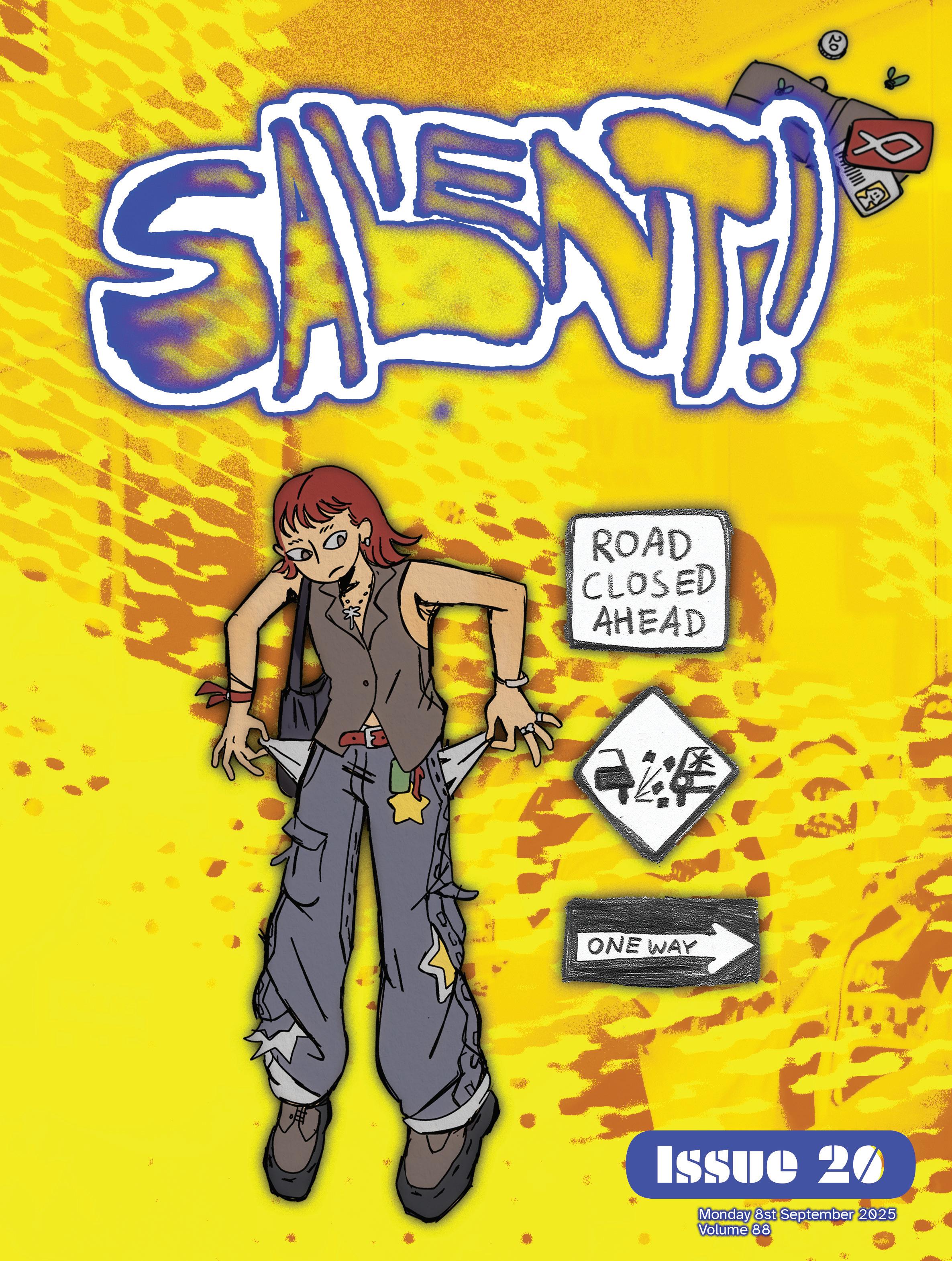
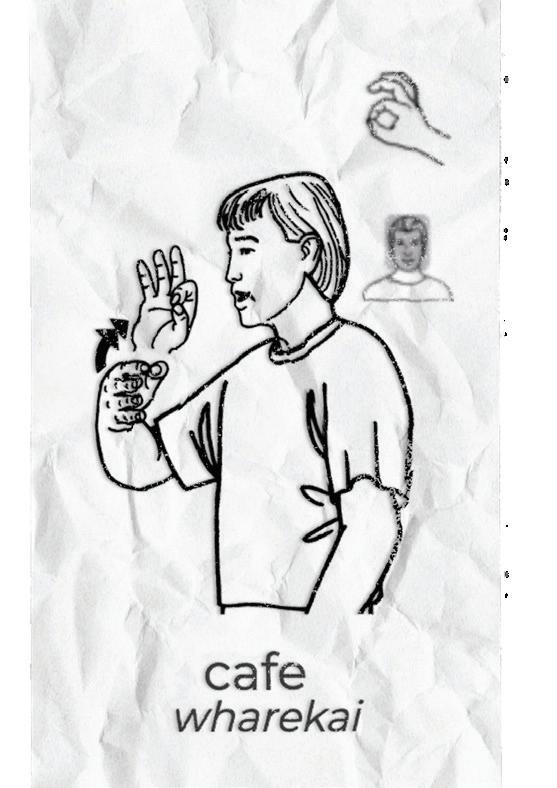
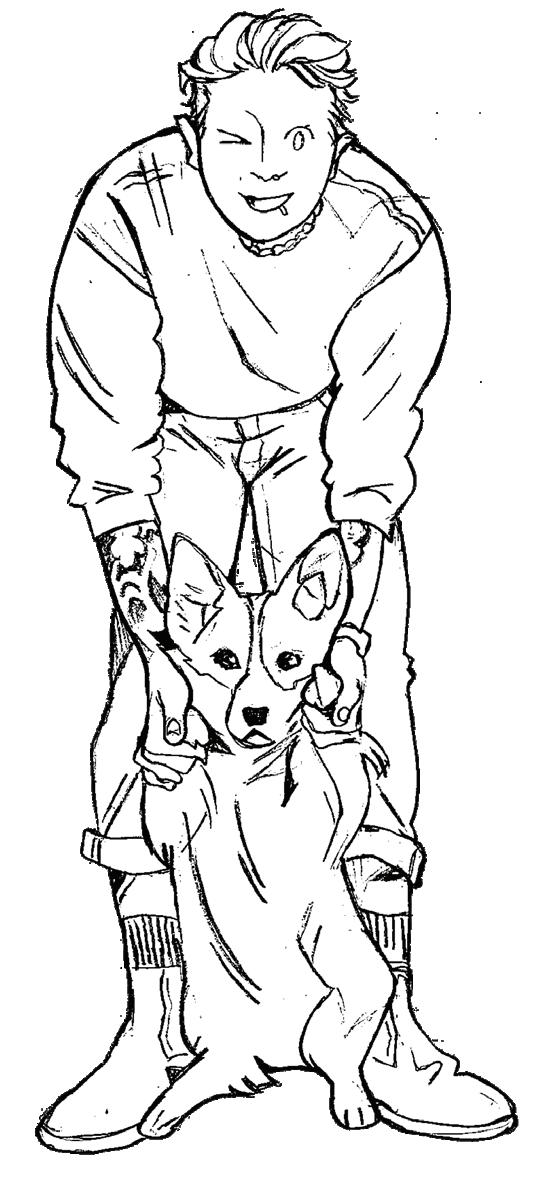




This morning, the office feels a little heavier than usual. Plants are slowly migrating in, one pot at a time. Our resident Duck—usually a cheerful anklenibbler—is missing. Outside, the city is cloaked in fog so thick the waterfront has vanished from view. Our Palestinian flag flutters in the wind, visible, we’re told, even from Capital Hall. It’s a grey, rainy day to be sending this issue to print— and somehow, that feels appropriate.
Not that this edition is damp or dreary (we covered uni’s mould issues last week). But it is dense with news, and many of our stories carry a muted, serious tone. Dan Moskovitz examines troubling communications from the Architecture Faculty, and poses a deeper question: what is the moral value of a native species? Henry Broadbent delivers an investigation into Bathurst Mine—an operation that could double New Zealand’s CO2 emissions and further threaten our biodiversity, and has Vic students standing on the front line against it. I take a closer look at wait times at Mauri Ora—Student Health and Counselling—in an effort to understand what’s happening behind the scenes, and how things might be improving.
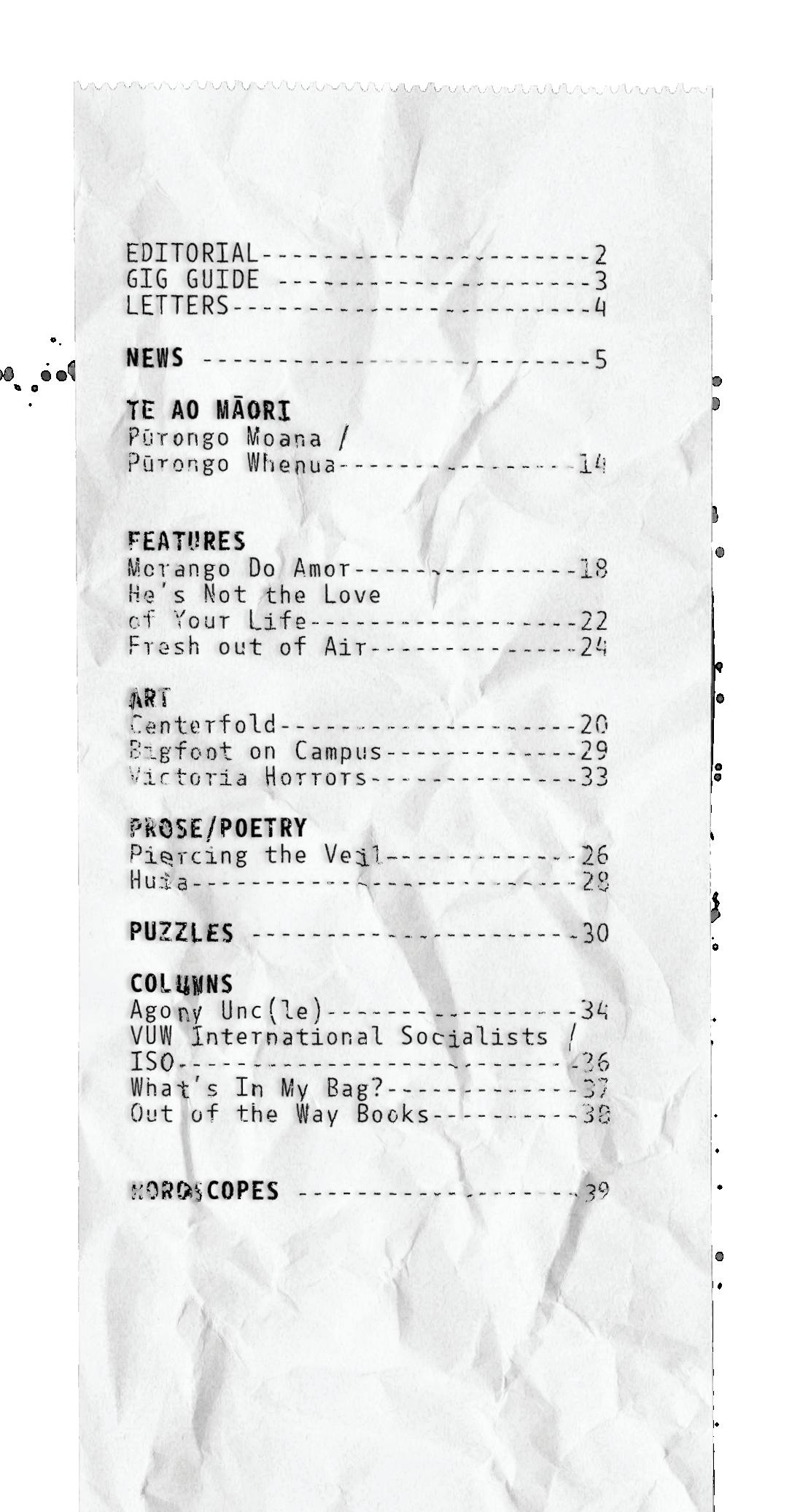
There’s lightness, too. Darcy Lawrey and Walter Zamalis bring us run downs from VUW’s Open Day, and the latest from VUWSA. In our features section, the metaphorical sun breaks through. Te Urukeiha Tuhua reminds us of a timeless truth: He’s Not the Love of Your Life, He’s Literally Just a Guy. Ryan Cleland interviews Dayana Felix for a fresh take on Wellington on a Plate, and Jia Sharma introduces us to the rising band Where’s Jai
We’ve also included two crosswords this week—because one is never enough— and some beautiful creative writing from Tamanna Amin to round it all out.
Maybe the mood in the office isn’t just about this issue—it’s about the time of year. Spring is teasing its arrival, and exam season is creeping closer. For some of you, graduation is on the horizon. For others, it’s nearly time to leave the Halls and step into the wider world of renting. A small tip: look up your tenancy rights now, not later. A couple of hours of research can save you a lot of stress down the line.
Here at Salient, the end of the year is beginning to show. We’ve got just four issues left, with next week’s being our annual Te Ao Mārama edition, guest edited by Ngāi Tauira. It’s been a big year for the team, and I think both staff and students have a lot to look forward to in 2026. We’ve got some beautiful things planned for our final issues, and we’re excited to share them with you. As always, we love hearing from you—so send us a letter if you’re enjoying (or not enjoying) the direction we’re heading. I promise, we’re not that scary behind the scenes. Take care, and good luck with the end of your trimester.
By Phoebe Robertson


Time: Wednesday 6:30pm
Location: MOON
Kick back to a sonic treat this Wednesday: Dónal Gunning is bringing his fun and energetic brand of indie rock/folk to MOON’s weekly Wednesday slot! Free entry, $15 pizzas until 9pm.
Time: Friday 8PM
Location: San Fran, Wellington
Three excellent artists at San Fran: Debt Club bled raw indie rock and wistful folk in a wonderfully rich sound (they also have a saxophone!); Model Home have a very upbeat, indie post-punk vibe—fun as fuck! Wiri Donna moves fluidly from folk to jangly slacker-pop to riff heavy rock, for an exciting set. A great lineup.
Lisa Tomlins, with OTC (FREE!)
Time: Friday 6PM
Location: Southern Cross
It’s the end of the week! Why not check out the best voice in the game, for free, alongside a beer and chips. Tomlins will be joined by a jam band of excellent Wellington musicians at Southern Cross.
Time: Saturday 9PM-2AM
Location: Meow
It’s spring! Searching for a way to break from your hibernation? Look no further than Craigslist Sound System: from Italo disco to jazz to tech house, dance is the name of the game this Saturday at Meow.
Rally for Palestine (Ongoing)
Time: Saturday 1PM
Location: Announced each Wed on: @falastin_tea_collective
Join Falastin Tea Collective on their weekly rally for Palestine—this Saturday in solidarity with people in Tāmaki Makaurau marching the Harbour Bridge. Flag waving is also held weekly every Friday morning on the Hill Street Bridge (see their Instagram for details).
Spinning Lights, w/ Column Of Sand,Tragedies
Time: Thursday 8PM
Location: Valhalla
Three artists will grace Valhalla’s stage (for a cool $10!) this Thursday. Tragedies will open with ambient trip hop, Column… with a grungy post-gaze sound, and Spinning Lights will round it off: grungy noise-pop. Grab a beer, and go on a sonic journey.
Time: Friday 8:30PM
Location: Valhalla
Aussie post-punk/hip-hop, at the perfect venue for a lively set. Loud, honest, sometimes angry, with the odd veer into dance heavy, mosh-friendly bangers. Check it out!
Time: Saturday 10AM-2PM
Location: Aro Valley Community Center
Rock up in Aro Valley this Saturday to find the record of your dreams. Your landlord might suck, but your soundtrack doesn’t have to. Hosted by On The Record.
Time: Saturday 6PM
Location: Underworld Tavern
Nine musical acts will carry you through a packed evening of music on this post-apocalyptic night. Get dressed for the End Times and prepare for dark ambience, post-punk, noise, doom folk and much more.
Slow Jazz Ensemble— Urgent Palestine Fundraiser
Time: Sunday 5PM
Location: Meow
End the week with some calm, and support an essential cause. Slow Jam Ensemble are bringing their immensely talented nine-person band for two sets of atmospheric jazz. Proceeds go to Palestine Aid.
#20: 8 September 2025
EDITOR
Phoebe Robertson (Acting)
TE AO MĀORI EDITOR
Taipari Taua
NEWS EDITOR
Dan Moskovitz
NEWS WRITER
Darcy Lawrey
MUSIC EDITOR
Jia Sharma
SUB-EDITOR
Henry Broadbent
COLUMN EDITOR
Georgia Wearing
DESIGNER
Cal Ma
JUNIOR DESIGNER
Nate Murray
FEATURE WRITER
Te Urukeiha Tuhua
SOCIAL MEDIA MANAGER
Teddy O’Neill
NEWS WRITER/POLITICAL CARTOONIST
Walter Zamalis
CONTRIBUTING WRITERS
Ryan Cleland
Saad Aamir
Guy van Egmond
CONTRIBUTING CARTOONISTS
Jim Higgs
Sophia Knoef
CROSSWORD CONTRIBUTORS
Nil

Julia Corston
Holly Rowsell
CENTERFOLD
Cal Ma
DISTRIBUTION
Saad Aamir
ADVERTISING SALES
advertising@vuwsa.org.nz
READ ONLINE salient.org.nz
issuu.com/salientmagazine
GET IN TOUCH
editor@salient.org.nz
Instagram/salientgram
Tweet/salientmagazine
Facebook/Salient
LETTERS
Got something to say about the magazine? Want it published? editor@salient.org.nz
Salient is published by, but remains editorially independent from, the Victoria University of Wellington Students Association (VUWSA). Salient is funded in part by VUWSA through the Student Services Levy. Salient is a member of the Aotearoa Student Press Association (ASPA).
Complaints regarding the material published in Salient should first be brought to the VUWSA CEO in writing (ceo@vuwsa.org.nz). Ideally, by motorcycle. A letter can also be sent to the editor, for their response/publication in the magazine. If not satisfied with the response, complaints should be directed to the Media Council (info@mediacouncil.org.nz).
Beloved editor,
I am writing to address some of the articles about feminism that have been published under the authority of the previous editor, who as I understand, has (begrudgingly) left in disgrace. This however, is to the writers of those articles. Dear white people, i'm tired of reading your sob stories. I don't want to read another article about your white guilt and your disappointment with other white people for not "performing activism" the "right way".
I don't want to hear your hot takes on the trad wife movement, I don't want to hear about how YOU attended a protest and how that puts you on morally superior ground than people who didn't.
I'm sick of the self congratulatory "i'm not like THOSE white people, i'm a GOOD white person, look at me understanding race and gender."
The thing is, when writing an article on feminism-particularly intersectional feminism- it is so glaringly obvious to anyone who understands it personally, when you haven't done the mahi behind what you profess to be an expert in.
I appreciate the sentiment behind the article/s, don't get me wrong. I adore the fact that there are young women out there passionate about injustice and willing to learn about feminism - a gold star for you- please please keep learning. But the thing is, as WHITE women, if you really really want to help, your job is to deplatform yourself and do everything in your power to ensure that the "trans" and "Black" and "Māori" women that you attribute your wokeness to, is platformed in your place. THAT is what praxis is. Feminism calls for introspection, an acknowledgement of your power and place in the world. But it goes beyond just that, it requires actively questioning if you're putting yourself in a position that others would be much better suited for. You don't get to just throw in adjectives describing women who are less privileged than you and pat yourself on your back for being a good white ally.
I could go on, I could talk about how oppressed people actually can't "uphold the (insert oppressive power structure here)", I could talk about how these articles do more harm than good when they aren't backed by informed voices, I could talk about how using Afghanistan as an example of what Western women could lose is a prime example of orientalism. But i'll refrain because at the end of the day we're all fighting the same fight. White people, we want you as allies, what we don't want is you to take up any more space. In short, shut up (with love)
Dear Editor,
Thank you for your expose on Everton Hall. My peers and I finally feel vindicated.
As a fellow Everton resident my experience has been mostly positive but for the rampant mould problem. I and many other residents have faced similar mould issues and similar treatment (or lack thereof) from the hall staff.
My primary reason for living in University Accomodation beyond first year was an expectation that the University would be more accountable as landlords. This expectation was quickly dispelled.
In light of your article I hope that previously ignored maintenance logs will finally be answered.
Thank you,
Anonymous



Dan Moskovitz (he/him)
Architecture and design students at Te Herenga Waka have been misled by the university about their rights to academic extensions.
According to the university’s official Assessment Handbook, students are entitled to request extensions under three circumstances: unexpected professional commitments, high academic workload (if all of your assignments are due at the same time), and special circumstances, such as bereavement and illness.
But not all students are aware of this. Screenshots of course pages on Nuku—the university’s learning platform—obtained by Salient show several course pages saying only “special circumstances” were a valid reason for an extension.
“The faculty is misleading students by saying the only thing which gets you extensions are these special circumstances,” said Ethan Rogacion, VUWSA’s Academic Vice President. “That’s telling students they have less rights than they do.”
Helen Andreae, Associate Dean of the faculty of Architecture and Design Innovation told Salient the aforementioned Nuku pages were up by mistake.
“Those documents are from 2022,” she told Salient. “It was written before the current policy
was in place and it got rolled over in some classes year after year without staff looking back on it.”
“We’re going to have someone check all of the extension pages on Nuku, and we’re shoulder tapping students to reapply for their extensions.”
Rogacion stressed to Salient these extensions were necessary as architecture and design courses have 'burnout cultures', with there being an unspoken expectation of staying late at university. Andreae agreed.
“We are aware how architecture degrees are notoriously high workload and it's something we are directly working on how to manage,” she said. “It's a challenge because we have external bodies of accreditation, which means we have to ensure our students learn a certain amount at a rigorous standard.”
Still, she acknowledged the need for balance. “But we are having discussions on how we can reduce this. Because we can't put students in a position where they're choosing between university or their job. That's not OK.”
Andreae encouraged any affected students to get in touch with her or her colleagues directly.
By Darcy Lawrey (he/him)
VUWSA’s executive meeting on September 1 was jam-packed with updates, decisions, and a few unexpected moments. Here’s the highlights:
With Democracy Week on last week, President Liban Ali led the meeting with a tip-off that an attendee at VUWSA’s mayoral debate was planning to throw eggs at Ray Chung. “We’re gonna have a chat […] please keep your eggs in the bag”, he said. [Editor's note: No eggs were thrown at the event; Ray Chung didn't even turn up]
An important agenda item was that VUWSA will be replacing their van early next year. While CEO Matt Tucker acknowledged the benefits of electric vehicles, he said a second hand electric van would be “too risky”. VUWSA has a policy of purchasing second hand vehicles.
VUWSA also signed off on their budget for 2026. “We need to make some strategic decisions if we want to have a Christmas party,” Ali told the meeting.
A $3000 increase in Salient’s upcoming printing costs led to a brief, but sincere, discussion about the future of the magazine, with Ali asking the group “when do we have a conversation about how much is too much?”
By Darcy Lawrey (he/him)
Members of the Victoria University of Wellington Student Association (VUWSA) executive are disappointed their proposal to establish a national political advocacy group for student associations has been turned down.
On August 20, VUWSA met with student associations from around the country to discuss the proposed establishment of an Aotearoa Tertiary Action Group (ATAG). ATAG would have been the political wing of ATSA, the brand new national group of student associations.
The executives of each association had earlier voted on whether to adopt VUWSA’s proposal. Auckland University of Technology Student Association (AUTSA) was the only other student association to vote for the plan.
VUWSA President Liban Ali said that the association had “watered [the proposal] down as much as we can”. It was the fifth version sent by VUWSA, after many rounds of consultation with other ATSA

Tucker noted the value of print media connecting with students who wouldn’t read Salient online. “Do I think it’s a reasonable replacement to just go online? Probably not”, he said. However, he said he could see that shifting in the upcoming decades. “Can’t wait for the AI-driven Ubers,” Ali said in response.
Engagement Vice President Aidan Donoghue reported back to the group on his fruitful meeting with the Fairer Taxes Coalition. The executive voted to join the “united front” of various groups pushing for progressive taxes, including a capital gains tax and wealth tax.
Make sure to keep an eye out for the upcoming clothing repair workshop in The Hub on Wednesday 10 September at 12:00 and come along for a march to the Airport—VUWSA will be handing over their “Where’s the Work” petition on Thursday 18 September, meeting in Kilbirnie Park at 5:00.
Lastly, nominations are now open for VUWSA’s 2025 election. Candidates have until Tuesday 9th of September to be nominated. With a record number of candidates running, it’s never too late to add your name to the ballot.
members. Ali says he was “very disappointed” by the decision. “They’re gonna have buyer’s remorse when the general election comes around,” he added.
VUWSA Academic Vice President Ethan Rogacion, who drafted the proposal, was disappointed that feedback on “procedural stuff” hadn’t been raised earlier. He also found the suggestion by some ATSA members that “a better proposal” might be on the table next time hurtful.
However, Rogacion doesn’t see the result as a failure for VUWSA. “We at VUWSA are incredibly, incredibly committed to finding a way forward, because we need a national student voice,” he said.
He sees the lack of a national political group for student associations as a missed opportunity to hold the government to account, especially with the upcoming general election in 2026. “Solidarity makes us stronger,” he said.
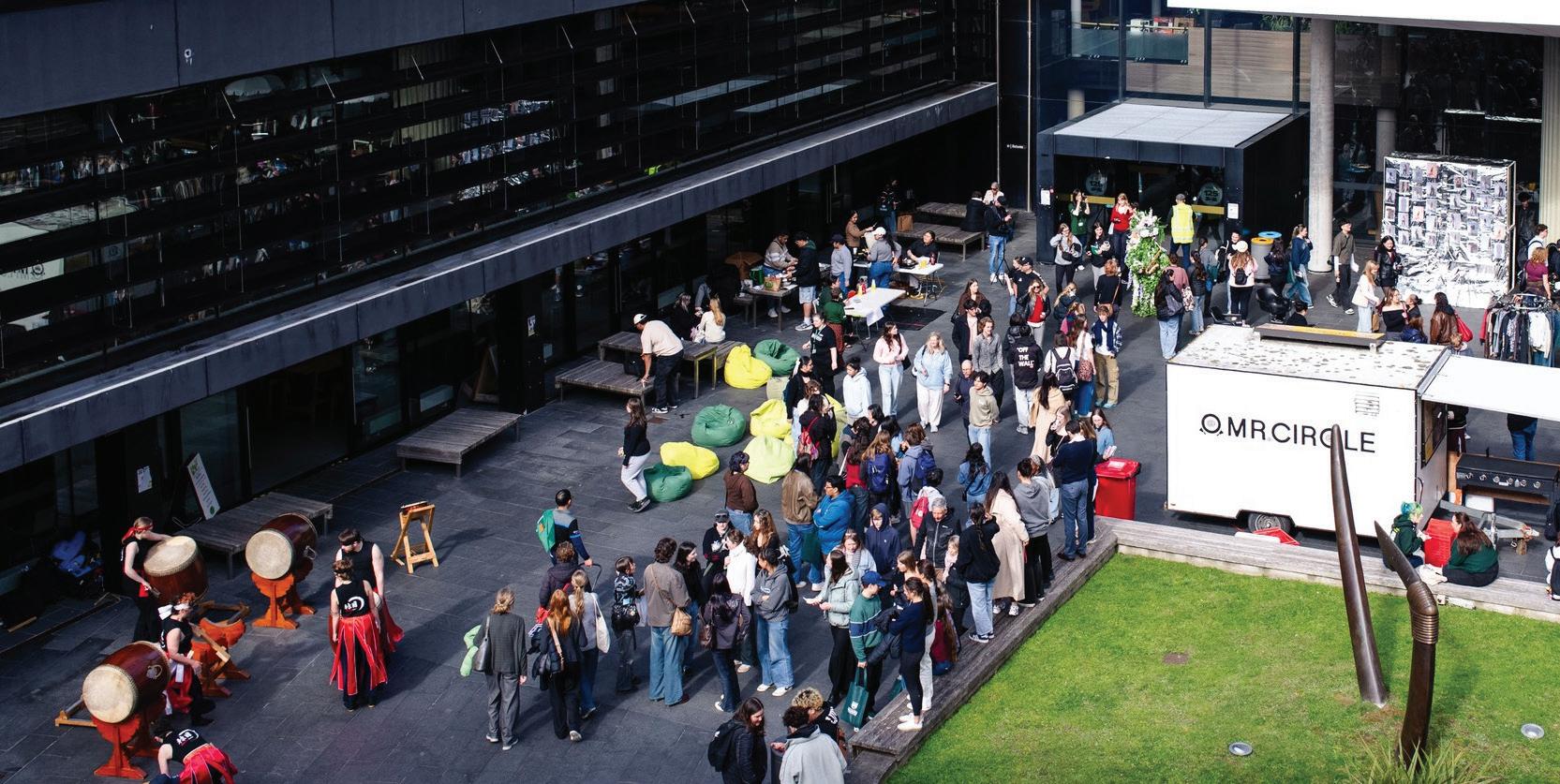
Te Herenga Waka held its largest-ever Open Day on Friday, August 22, drawing over 7,000 high school students and whānau to its Kelburn campus, according to event organizers.
David Lewis, director of communications and marketing at Te Herenga Waka, said attendance surged 41 percent compared to 2024. The university has already received 5,557 applications for 2026, and has issued 4,605 offers of study.
The event was designed to give prospective students a “feel for life” at the university by “showcasing the full Wellington experience”, Lewis said. Live music, food trucks, and second-hand clothing stalls entertained students on the day. Crucially, new students were welcomed in pōwhiri as manuhiri to Te Tumu Herenga Waka wharenui.
Beyond the thrifting and entertainment, the event featured a broad array of stalls—including local democracy stalls from the Electoral Commission and the Wellington City Council.
Open Day was a collaborative effort, with teams from Recruitment, Future Students, Marketing, Operations, and both the VUWSA and university’s social media teams working in tandem. Academics also pitched in, hosting open lecturers and staffing stalls. The city joined in too, lighting up the Michael Fowler Centre in green for the occasion.
Aiden Donoghue, VUWSA Engagement Vice President, described the day as “absolutely immaculate”. He noted that 1,500 students were added to mailing lists and a successful partnership with Flight Coffee saw thousands of canned drinks handed out to thirsty students in the balmy late-winter sun.
Both Donoghue and Lewis agree that the Open Day was just one part of a broader wave of student engagement initiatives. Lewis noted that Open
Day coincided with Wellington on a Plate, the New Zealand International Film Festival, and Beervana— but also with a series of political education events ahead of the VUWSA, University Council, and Local Government elections.
Last week marked VUWSA’s Democracy Week, with extra efforts made to engage students in civic life. Building on the success of the Electoral Commission and City Council presentations to high schoolers, VUWSA has hosted numerous debates on campus:
Tuesday: pukehīnau lambton ward candidates
Wednesday: Te whanganui-ā-Tara Māori ward and a Mayoral Candidate Debate.
Thursday: Regional Council
Friday: Southern Ward and the Youth Wings Political Debate, the latter organised by Donoghue and featuring youth representatives from major political parties.
The Tuesday Māori ward debate featured a cake and a raffle, and drew a solid turnout. It coincided with a visit by local Wellington Central MP Tamatha Paul, who spoke at a Politics Society event. A lighter “speed dating” session with candidates followed on Wednesday at St Peter’s Garden Room on Ghuznee Street. No Wellington City Council candidates attended the Open Day; a debate attendee said the Democracy Week debates have been a great way to make up for that.
This surge in political activity comes amid a record number of student candidates for VUWSA’s elections—25 as of print day, with nominations closing next week. This includes five vying for the student presidency. That’s a sharp contrast to Liban Ali’s unopposed run a year ago.

wgtn.ac.nz
By Phoebe Robertson (She/her)
Deep in the bowels of the student union building— further still than Salient’s own office—I sat down with Kevin Rowlatt, Associate Director of Student Health, and Laureline Darques, Clinical Lead— Counselling, in Rowlatt’s corner office, a quiet pocket of fluorescent light and stacked folders. I’d come to talk about wait times at Student Health and Counselling, a topic that’s been a steady hum of frustration since I was a student myself in 2020. The complaints haven’t changed much: too long to see a doctor, even longer for counselling, and a sense that help is always just out of reach. I wanted to understand why—and how—it got this way.
A six-to seven-week wait is not an outlier. The service has a typical wait of roughly seven weeks for an initial routine counselling session, with faster access—about a week—for Māori and Pasifika students under an equity priority system. Health appointments run shorter but still stretch the patience of students who need continuity: the average wait to see any GP or nurse practitioner is just under ten working days, with waits for individual clinicians ranging from three to 17.5 days. Nurses are quicker, with an average wait of 3.3 working days.
The wait times reflect a system squeezed by national shortages, the rhythms of the trimester, and a model of care that has been forced to become reactive. The question facing those who run the service is simple and fraught: What can they do about it, now?
Rowlatt keeps a running account of demand and capacity. In January, he says, it’s often possible to see a GP within a week. But at this point in the year, it’s “just shy of ten working days for any doctor or nurse practitioner.” For the doctor everyone wants to see, it’s longer: “We have one who’s very popular. I think his wait time is 19 working days currently,” he says. “I don’t think any patient should have to wait that long to see a doctor that they want to see.”
The bottleneck is partly structural. Almost all of the service’s GPs are part-time, a pattern mirrored across New Zealand primary care. Mauri Ora employs 7.5 full-time equivalent (FTE) GPs and a 0.5 FTE nurse practitioner (NP) for a student-to-GP/ NP ratio of about 1:1,000—considerably better than the national range of 1:1,600–1,800, yet still subject to the realities of leave and the surge-and-slump of campus life. The team also includes 8.77 FTE nurses, a 0.8 FTE health improvement practitioner and health coach, as well as visiting specialists from Te Whatu Ora (psychiatry weekly, endocrinology monthly).
Behind those ratios lies a broader national picture: a shortage of 485 GPs affecting an estimated 775,000 patients. “The GP workforce is increasingly part-time across the country,” Rowlatt says. “In any workforce that is in such high demand and also such
short supply, [clinicians] have options about the way and where they want to work.”
Counselling faces a different calculus: the service is larger (22.4 FTE counsellors, plus interns and casual outreach counsellors) and there is no hard cap on sessions, though it operates a short-term model. Most students attend four or fewer sessions; the average is about 3.8. The aim is to reach many students, while allowing flexibility when needs are more complex and referral options are scarce. “We try to stick to our primary-care scope and not get drawn into secondary,” Darques says.
Yet time in therapy is not just time on paper. “If someone is highly distressed, with suicidal ideation, or going through a breakup, timeliness is crucial,” Darques says. “Waiting six weeks in a trimester is significant.” For those students, the service runs a same-day stream—typically nine or ten slots, depending on the week—and an “outreach counselling” triage model that aims to contact students within a few days of their first request. The outreach call does more than sort risk; it maps options: group programmes, an e-therapy pathway, a health coach for sleep and habits, or a same-day check-in while they wait for a longer appointment. “We want students to feel heard, validated and connected early in the process,” Darques says.
The triage approach is not improvised; the service points to a research base for stepped care and walk-in triage models in university settings, and has participated in an implementation trial of internet-delivered therapy modules for anxiety and depression.
If the current pressures feel acute, they are also the residue of a tumultuous few years. “The model was so disrupted,” Rowlatt says—first by pandemic patterns that crushed routine demand during lockdowns and then unleashed afterward, and then by a wave of GP departures last year for reasons ranging from family to relocations. “We relied heavily on locums, online and face-to-face,” he says. The last of the permanent GPs was only appointed in June. The result: a service remodelled to catch crises—lots of same-day capacity, lots of telephone triage—and less able to protect routine follow-ups that build continuity and trust.
That reactivity shows up everywhere. Student Health reserves two “duty doctor” clinics each afternoon—22 same-day 15-minute slots, though many students need 30 minutes—and runs a GP liaison to support nurse-led clinics with up to 22 same-day appointments. Nursing operates an acute assessment clinic daily; routine, non-acute nursing care is available in about three working days. Counselling does its own same-day shift most days, flexing between brief letters for extensions and urgent check-ins. All of it helps—and all of it crowds the schedule.
Add more doctors? “Yes,” Rowlatt says without hesitation. If funding allowed, that is where he would spend first; nurses cannot enrol patients under current funding models, and the external capitation money follows the GP. But just as important, he argues, is to stop letting same-day demand dictate the entire day. “We need to dismantle this reactive model,” he says. That means intentionally shrinking the sprawl of same-day clinics and telephone triage to carve out more protected, routine GP and nurse appointments—the kind that reduce avoidable crises later.
The corollary is to restore and expand nurse-led clinics for problems nurses can diagnose and treat—sexual health, UTIs, eczema, emergency contraception—and to communicate more clearly to students that their “care team” includes a nurse as well as a GP. “Really, the model we want is: the doctor is the conductor of the orchestra,” Rowlatt says. “Why can’t we devolve some of that stuff to the nursing workforce and allow GPs to do more complex stuff?”
There are signs this could work. The service did something similar before the pandemic: when nurseled clinics grew, telephone triage dropped, and GP time was freed for the kind of appointments that keep patients out of the acute stream. They want to repeat that, this time with firmer guardrails: fewer open-ended “we’ll take as many as come in” days, more scheduled blocks, and a conscious substitution of resource-hungry phone triage with face-to-face care.
Counselling is applying a parallel logic—triage and choice at the front door; variety in what “therapy” can look like while you wait; and rostering that matches the shape of the academic year. This year, staff noticed something new: students were unusually proactive in summer, booking support long before crunch time. That early demand pushed up the queue sooner than expected—but it also signalled a cultural shift the service wants to encourage. In response, they are experimenting with rotating more sameday capacity into known “peak” weeks and dialling it down when campus is quiet.
The outreach call is the hinge. It’s where a student can hear, concretely, that there are options other than “wait six weeks.” Group programmes that teach skills. A health coach who can start now on sleep and routines. An e-therapy module with brief weekly check-ins. A same-day appointment if the ground has shifted—and follow-up calls if needed, so no one feels they are waiting in the dark. “At least you’re informed; you can navigate that system,” Darques says. “There’s a relationship created with the service.”
The equity lens is also explicit. Māori and pasifika students can get an appointment in roughly a week, a recognition that the system must do more than acknowledge inequity— it must build priority pathways into its architecture. (The counselling team says it can still book next week for Māori and pasifika even when the general queue is long.)
These choices make the line look longer. This is, in a way, by design. Student Health’s model is “less wedded” to the classic 15-minute appointment, Rowlatt says; many students—particularly those in emotional distress—need 30 or 45 minutes. That generosity of time is humane; it’s also arithmetically unforgiving. You cannot stretch a day without it snapping somewhere.
The service tries to cushion students outside office hours. The campus clinic runs late Monday through
Thursday, and during exam periods, both Health and Counselling open on Saturdays, including same-day counselling. Students can also call the national 1737 helpline 24/7, use the nurse-led Healthline, book a discounted virtual consultation through Practice Plus, or go to the hospital emergency department—free, but often with long waits of its own. None of these are substitutes for seeing the clinician who knows you; all are attempts to make the time in between bearable. Could students simply spread out their loyalty, choosing the next available clinician rather than waiting for the popular one? The service resists that logic. “Continuity of care is kind of the gold standard of general practice,” Rowlatt says. Trust matters, and so does not having to retell your story. The trick, then, is to protect continuity without letting it calcify into scarcity. That is the bet behind rebalancing toward nurse-led clinics and reserving more GP time for planned follow-ups.
If the past few years have taught the service anything, it is that campus health cannot be a scaled-down copy of the clinic down the road. “We are talking about a young and vulnerable population where mental health is our bread and butter,” Rowlatt says. The service, he suggests, has to meet them where they are—not just in the first appointment, but in the weeks when they are waiting, deciding whether to ask for help again.
In counselling, that has meant making the first human contact feel like more than a triage script. In health, it has meant being honest that 22 same-day slots are not a safety valve so much as a symptom—a pressure release that, if left unchecked, builds pressure elsewhere. Both teams describe the coming months as an exercise in discipline: intentionally shrinking the “drop-everything” part of each day; reinvesting in routines that make continuity possible; and giving students clearer pathways that don’t all end in a single line.
None of this obviates the basics. More clinicians would help. New Zealand’s GP pipeline will not be rebuilt by better rosters alone. On this campus, though, staff insist they can make the waits mean less—if not always be less. “We always look at wait time, but it’s one indicator,” Darques says. “The aim is to connect early, offer options, and be there when it’s happening.”
If the past few years have taught the service anything, it is that campus health cannot be a scaled-down copy of the clinic down the road. Many students are navigating health care for the first time, often without a parent’s health literacy to guide them. The service has to meet them where they are—not just in the first appointment, but in the weeks when they are waiting, deciding whether to ask for help again.
“We aren’t built like the four-doctor surgery that’s looked after three generations of the same family,” Rowlatt says. “We’re working with young people, many of them away from home for the first time, often figuring out health care on their own. You can’t assume they arrive with the same health literacy as someone who has a parent booking appointments and explaining prescriptions.” That doesn’t mean students are passive; staff say the newest cohorts are strikingly proactive about seeking help earlier. But it does mean the model has to bend differently: faster to respond, more flexible in what care looks like, more focused on mental health as a daily reality rather than a side stream.
“It’s a period of life where things shift fast,” Rowlatt
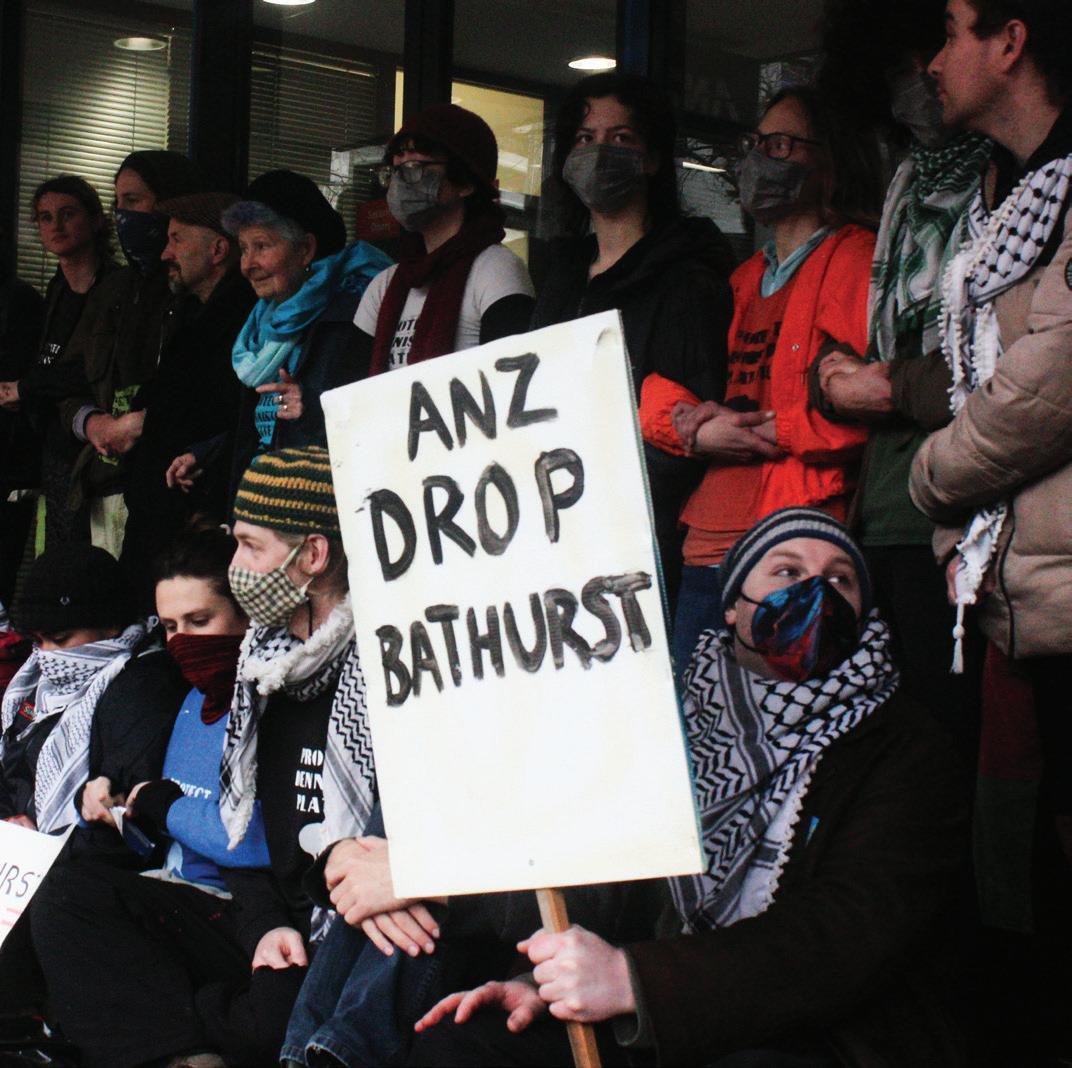
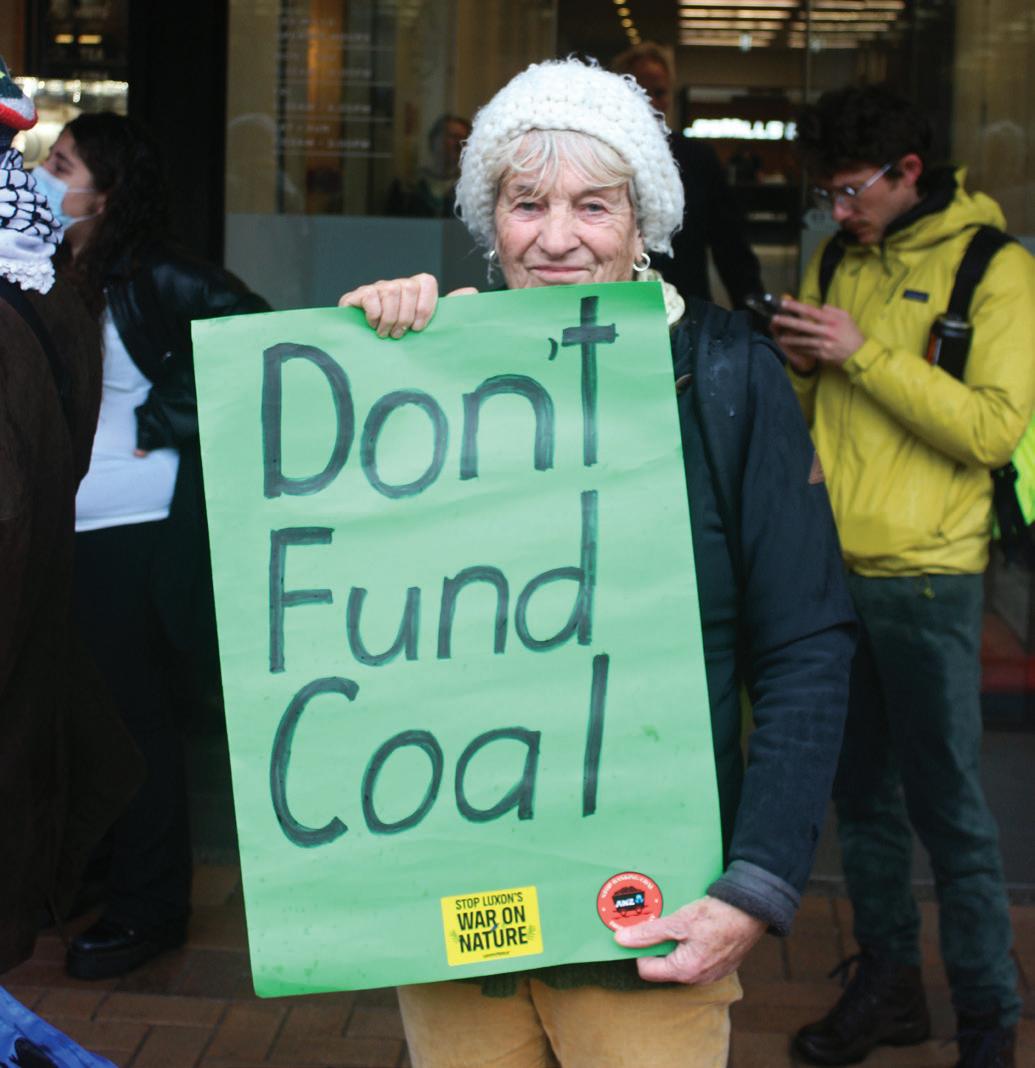
Henry Broadbent (he/him)
Early on the morning of Friday August 8, as public servants strode to work, a group of activists, under a light rain, set up in front ANZ’s Lambton Quay branch. They comprised around twenty people, ranging from university students to retirees, and had arrived prepared: a megaphone, print-outs of chants, food runners, pamphlet drops, a police liaison, a bristling array of signs and banners, and plenty of coats.
Similar scenes were playing out in front of ANZ banks across the country, or would later that same day. Actions, principally organised by 350 Aotearoa, Climate Liberation Aotearoa (CLA) and Coal Action Network, also took place in Tāmaki Makaurau, rotorua, Taranaki, whakatū Nelson, Ōtautahi, and Ōtepoti.
In pōneke, the group, including local organisers from Oil Free Wellington and Climate Action VuW, arrived early. Publicly, the protest began at 9:30am. The then unpublicised goal of activists that day was to blockade the bank and prevent it from opening: an act of direct protest. By 9:00am they were linked arm in arm across the entrance; as the posted opening time of 9:30 rolled past, the bank remained shuttered. It didn’t take long for police cars to begin lining Ballance Street and the Lambton bus lane; soon a police van idled nearby, a metal cage visible in its cargo bay. The group was prepared for arrest; it appeared the police were, too. The object of these nationwide acts of protest: ANZ-bankrolled coal giant Bathurst Resources.
Bathurst Resources, the country’s largest coal miner, is behind an application via fast-track for a vast mine, projected to blast 20 million tonnes of coking coal—an element of the steelmaking process—from the Denniston Plateau on the West Coast, entirely for international export.
New Zealand’s entire net emissions in 2023 were 56.2 million tonnes of CO2. Projected emissions from the Denniston project sit at a minimum of
53 million tonnes of CO2, approaching parity with the rest of the entire county—all from a single, monumental mine approximately the size of Nelson City.
The massive company, New Zealand’s dominant coal operator, presents a predictably laundered public face. Despite the fact 90% of its shares are held by foreign investors, its website assures visitors that Bathurst is “mining for the good of New Zealanders”, and is “committed to sustainable development, where economic growth coincides with respect for conservation and community values”. They list a Lambton Quay address for contact, display countless photographs of New Zealand landscapes, and boldly announce they are “committed to making New Zealand better for our future generations.”
There are many who would dispute that characterisation. In a public Q&A drawing attention to the Denniston Plateau, Forest and Bird describe the ecosystem there as “a national treasure, rated by DOC’s own scientists as one of the top 50 most ecologically valuable sites on mainland New Zealand”. The site, a high-altitude sandstone tableland, is home to an entirely unique ecosystem, and plays host to some species that are found nowhere else on Earth. Previously unknown species, in fact, are still being discovered on Denniston Plateau currently.
At the nearby Stockton Plateau, which is host to the largest opencast mine in New Zealand (operated by Bathurst Resources), otherwise undescribed—and since unseen—species of velvet worm have been spotted, within the footprint of the mine. Opencast mining, Forest and Bird stress, means “total ecosystem destruction.” Protecting these areas “is like protecting a library full of books we haven’t even had the chance to read yet.”
Bathurst’s Stockton mine can also provide a window into the potential long-term environmental impacts of such a project. Treasury figures from 2023 show
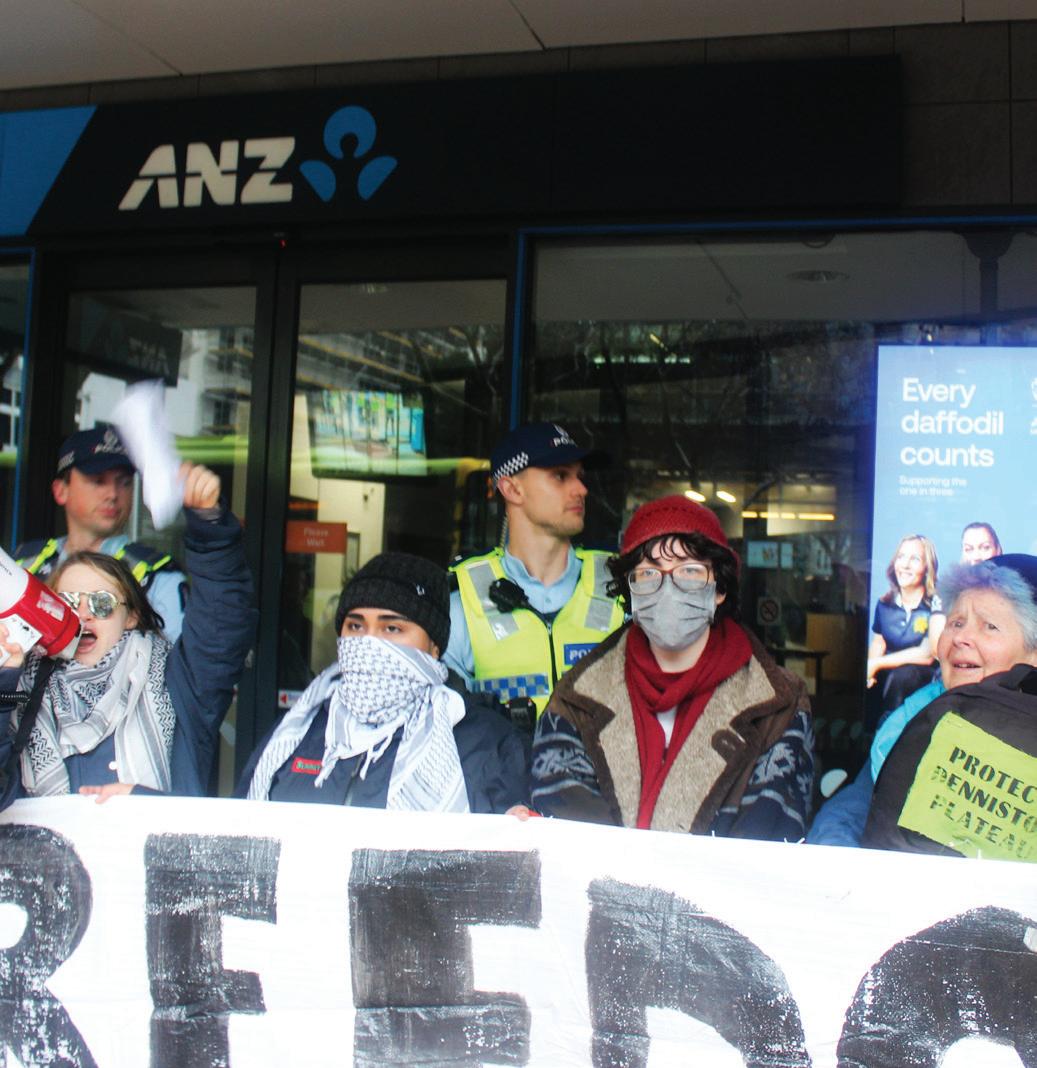

that the government spent more than $3 million treating damage caused by acid runoff from Stockton mine alone—potentially devastating to freshwater ecosystems—more money than it collected in royalties for all coal mining across the country in the same year.
As well as a desire to protect the ecosystem and animals, organisers were motivated by the already immediate impacts of the climate crisis on themselves and their communities. Colden, a student at Vic and an organiser from Climate Action VUW and CLA, told Salient that, while the climate crises affected them as a student and a young person with their future at stake, “ultimately, it just comes down to safety”. For them and others protesting across the country:
“The climate crisis is an existential threat. I’m afraid. Ten years ago, I wasn’t afraid like this, but I seriously feel like all of our lives are going to be affected in the short term. If your house hasn’t been flooded yet, it could be in the next storm. You know, really no one’s safe anymore”
Such protest is essential because climate change “is not something to be put on the backburner anymore. We can’t just continue with business as usual and deal with climate change later on. We’re already seeing the impacts in our communities, and it’s really important that these businesses understand the effect they’re having.”
A recent advisory opinion from the International Court of Justice, stating that emitting states and companies hold an environmental obligation and could be legally responsible for damage, suggests the world’s highest courts would agree. And in an environment where there is no shortage of data on emissions totals and the damage they cause yet nothing changes, Colden suggests protest becomes necessary:
“Large emitters are aware of the damage they do, they need to reduce that effect, and they’re not gonna do it by themselves. That’s why we need to put pressure on them … we’ve all known the facts for a long time. Governments and businesses have known the facts for a long time. Taking direct action is just a response to the fact that, while knowing all this, we continue to see the climate crisis getting worse.”
Back on Lambton, police threatened arrest, quickly— before members of the public had a chance to show up. After a brief deliberation, the protestors decided to deescalate, avoid arrest, and keep a public presence at the bank for longer. For the rest of the action a line of cops stood behind the protestors, moving quickly to clear the thoroughfare, jostling those too slow to move. As more people arrived, some passing through on their way to a rally for Palestine further up the hill, the atmosphere became festive, the chants defiant.
Blockading banks, however, is not the only thing CLA has been up to. It has been three weeks since two Cl A activists, rach Andrews and Tāmati Taptiklis, descended from an alleged ~23 day stint in a coal bucket at the Stockton mine, physically preventing Bathurst from transporting coal via the aerial ropeway. The pair weathered storms during their stay, and reported to press threats and intimidation from employees of the mine—including an allegation of a discharged shotgun. They have both been banned from the West Coast.
Both West Coast mines and ANZ branches have been the site of protest over the past two years— this recent action was not the first—and activists show no sign of letting up. Their message is clear: mass emissions and environmental devastation must not continue. On descending from the coal bucket, Taptiklis told reporters: “I’m feeling proud that we have sent a really strong message. We will do whatever it takes for the climate.”

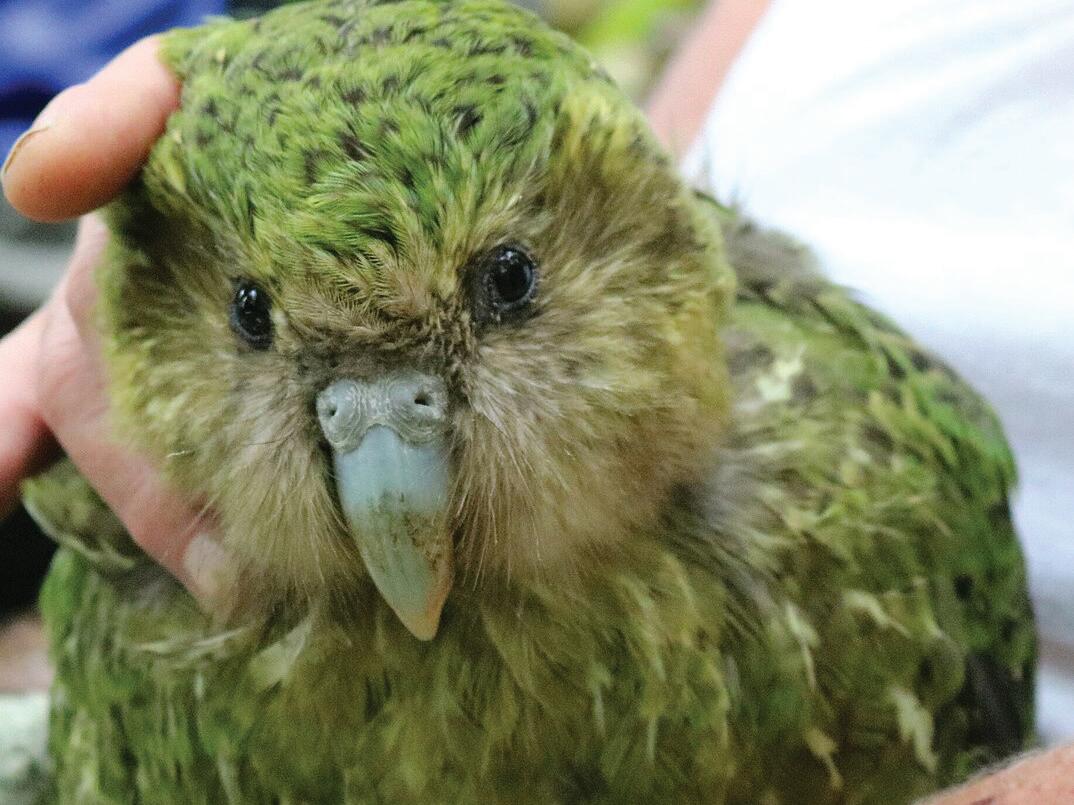
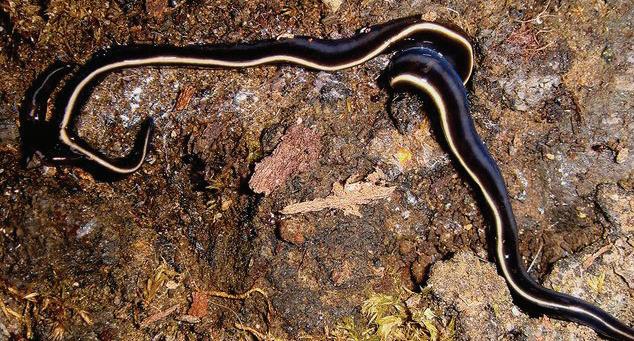
What is the value of a native species? And is every species of equal value?
Ultimately, the answer to these questions comes down to your values. How many people would truly value a native parasite equally to a kākāpō, kiwi, or takahē?
Alex Boast probably would. He’s a scientist at the Bioeconomy Science Institute who recently authored a paper showing how the kākāpō’s decline has likely led to the extinction of several of their native parasites.
Parasites may be unpopular, but there’s the distinctive buzz of an ecologist talking about their special interest in Boast’s voice when asked why he studies them.
“We think of parasites being kind of icky, and debilitating for species, but they have a role to play in ecosystems,” said Boast. “They shape biodiversity. They prevent one species from becoming overabundant.
“Often, their effect is minimal. But if you remove them, the host becomes a vacant space for potentially more harmful parasites.”
Therefore, the results of parasite extinction could result in worse parasites moving in.
Boast and his team examined coprolite samples—a fancy name for fossilized kākāpō poo—across a timescale stretching from before humans arrived in Aotearoa to the present day. Of those, they found 16 parasite species. Only two of those show up in modern records.
Which means either these two species just weren’t found in the historic record, or kākāpō are now dealing with invasive parasites, though Boast is quick to caution that there’s no way to be sure.
13 species of parasite were found only in the ancient coprolites—and were absent from contemporary samples. It seems likely
the decline in Kākāpō to around 250 birds could have resulted in the extinctions of their parasites, though Boast is again cautious. Not finding a parasite isn’t necessarily proof it isn’t there.
“When you have fewer and fewer host individuals, it becomes harder and harder for parasites to cross-transmit because there aren’t enough individuals interacting,” said Boast.
“If the decline keeps happening, you will inevitably lead to parasite extinction. But, we can’t be sure that’s what happened here.”
One potential cause of extinction is in fact conservation efforts. Boast cites the case of the California condor—an American bird the entire population of which was taken into captivity and treated for pests. Said treatment likely resulted in the extinction of a native louse which parasitized the condors.
similarly, the kākāpō population is under the Department of Conservation’s management, who treat the birds for parasites when they are at high levels. Given these parasites could be native, we come back to the question; are all native species of equal value?
“There's an ethical dilemma now,” says Boast. “Traditional conservation would say we take these individuals and we want to make sure they're healthy. We deworm them, and get rid of all the parasites.”
“But there’s a lot more to consider. Deparasitizing these birds could leave them vacant for worse parasites. And then there’s ethical questions of what conservation should be about?
“Is it just about conserving cute, cuddly things? Is it really ethically right to potentially be making parasites extinct based on some kind of prejudice we might have against them?”

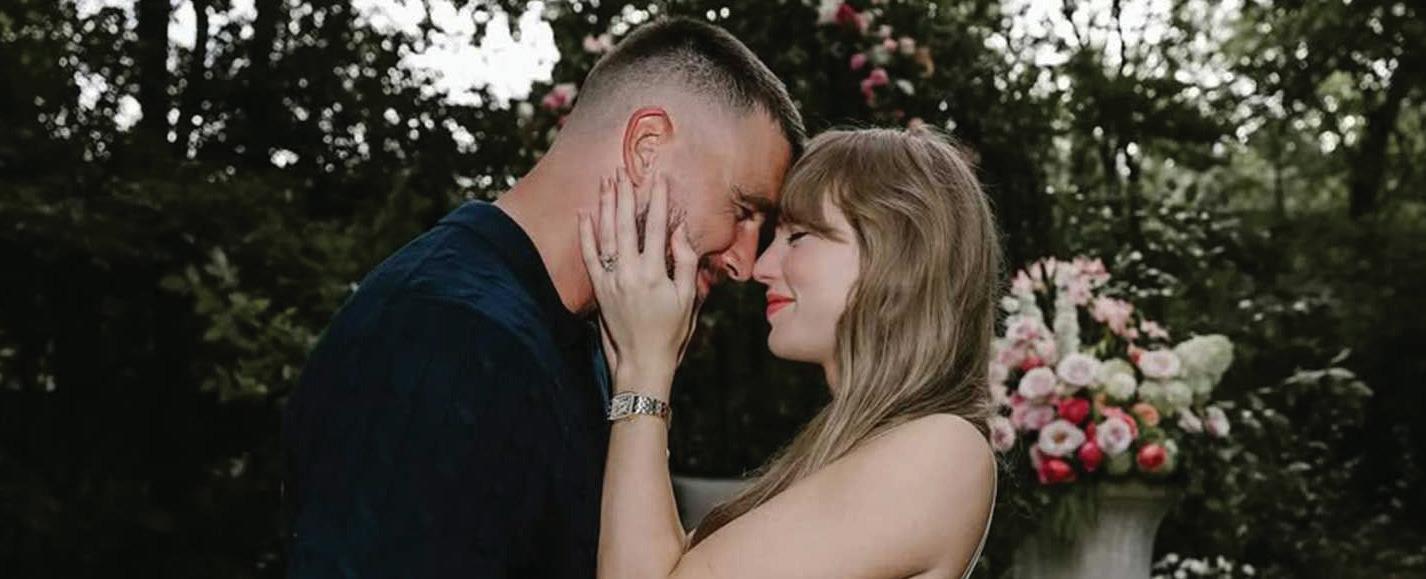
Popstar Sabrina Carpenter’s team has collaborated with TikTok to promote her new album Man's Best Friend—but not without raising a few eyebrows. As part of the campaign, fans can unlock digital stickers by sharing content, using viral sounds, and posting about the album.
But eagle-eyed fans quickly noticed something off. The cartoon version of Sabrina featured inconsistent fingers, lines that led nowhere, and a strange look in her eyes. The uncanny details sparked speculation: was AI behind the artwork?
Neither Sabrina, her team, nor TikTok have confirmed whether AI was used to create the promotional visuals. But the silence has sparked speculation. Nonetheless, for many creatives, even the suggestion of AI involvement— especially in artistic spaces—is starting to feel more than a little embarrassing.
After two years of cheering from the sidelines and sporting a custom ‘K’ thigh pendant, Taylor Swift has reportedly said “yes” to NFL star Travis Kelce. The proposal, which came after months of speculation, sent social media into a frenzy. So many fans, celebrities, and brands rushed to react that Instagram briefly crashed for some users, as photos, videos, and countless blonde women took to the platform to cry tears of joy for the singer.
In the wake of the engagement, U.S. sports betting operators began promoting wagers on Kelce’s performance—suggesting that the Kansas City Chiefs might ride the wave of romance to victory, or that Kelce himself could see a boost in stats now that the pre-proposal jitters are behind him. The couple have already been spotted in public cozying up, and totally glowing.
On August 26th, Rolling Stone magazine (not the band, as Mr Beast mistakenly assumed) released its list of the 25 most influential creators of 2025. Topping the chart was streamer iShowSpeed, while Youtube philanthropist MrBeast landed number seven.
Despite being ranked behind six other creators, MrBeast took particular issue with comedian Caleb Hearon’s placement above him. With 1.6 million followers, Hearon has a smaller audience over MrBeast, who questioned—via tweet—how someone with fewer followers could be considered more influential. However, after watching Hearon’s content and finding it genuinely funny, Mr Beast retracted his statement.
It makes for a good reminder to all: that nothing good comes from open envy, and a humbling is always around the corner.
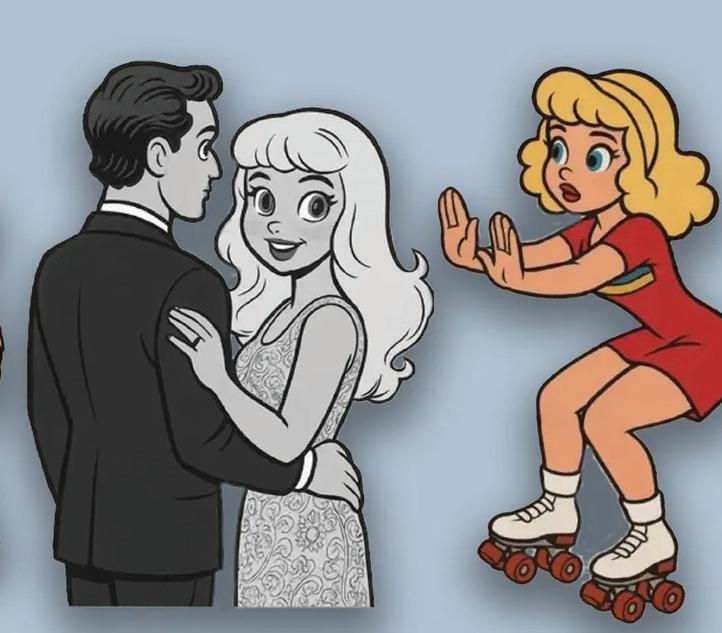
Māori and pasifika News
By Taipari Taua (Muriwhenua, Ngāpuhi)
Piki-hama—a place of belonging for
A new Pasifika law students’ room—Piki-Hama—opened at Old Government Buildings (OGB) in July. Formalities included speeches from Assistant Vice-Chancellor (Pasifika), Fabiefara Filo Masoe, Dean of Law, Professor Geoff McLay and Senior Law Lecturer Dr Mele Tupou-Vaitohi, followed by the blessing of the space by Pasifika Chaplain, Tapu Vea.
Salient’s MPI News Writer Taipari Taua spoke to the Pasifika Law Students Society presidents Tarifa Laban and Marshall Setu on the significance of Piki-Hama to Pasifika law students.
The pasifika law students’ society was set up in the late 1990’s, inspired by Ngā rangahautira, Te Herenga waka’s Māori law students Association. It started off as a group of pasifika law students working together to set up extra tutorials for Pasifika law students, which were supported by people like Dean Knight and Joanna Mossop.
This led to the establishment of a Pasifika law coordinator role, followed by the creation of the Pasifika Law Students’ Society (PLSS). After a period of inactivity in the early 2000’s, PLSS gained traction again in 2013 and has been growing stronger with each year.
PLSS exists to provide a safe space and sense of community for our Pasifika law students here at Te Herenga Waka. This year’s PLSS executive currently forms a team of 11. Tarifa and Marshall spoke about the different roles that exist on the executive, highlighting new roles like Cultural Officer and Advocacy Officer, that enhance the way PLSS is able to advocate for and represent our law students both at the faculty and student level. The executive runs events that range from academic, social, and holistic and welfare focused, including the Loloma Mentoring Program and their recent Sentencing Competition which was held at the Luke Cunningham Clere offices.
“It was the perfect atmosphere to host something that LCC are really well versed in, and to guide our students and build up their skills, which is another core aspect of what we do which is wanting to see our Pasifika law students showcase these skills and be able to kind of refine them on stages like that.”
“We have really good relationships with other law student societies, including the overarching VUWLSS one as well, who all work together to make the law school a safer space. So we have our own sort of part to play in that for Pasifika law students.”
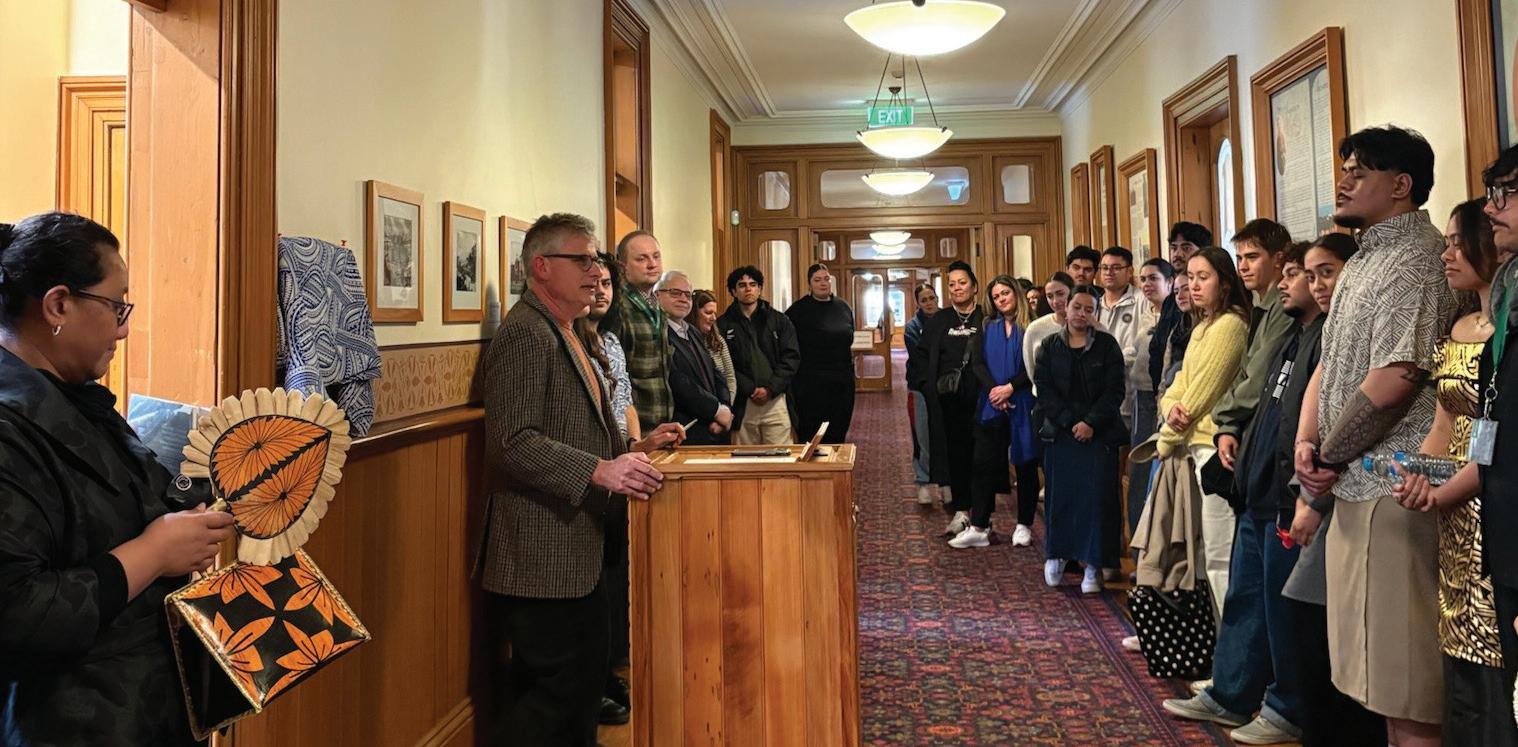
The room was named ‘Piki-hama’ which comes from a Tongan proverb: “pikipiki hama kae vaevae manava” a proverb that has its variations in many cultures across the Pacific. In Tongan, it refers to the act of bringing together or linking the hama, or the outriggers of a canoe, in order to share and distribute manava, or food. It talks about how the hama provides essential balance and stability to the canoe, especially when navigating rough seas. When Tongan navigators are out at sea for long periods and catch fish, they bring their canoes together, connecting hama to hama, forming lines or circles so they can draw close, share their food and support one another through the journey.
The name Piki-hama was gifted by senior lecturer, Dr Mele Tupou-Vaitohi. She was inspired by the Tongan proverb, and when PLSS invited her to come and announce the given name, she shared some beautiful sentiments around the room’s identity, and what that means every time you step into the space. Tarifa and Marshall spoke of their admiration for Mele and what it means to have her at the senior level within the Faculty of Law. They believe Mele has paved the way for many budding Pasifika law students with her report on “Contextualizing—Fofola na ibe—Improving Pasifika Legal Education in Aotearoa”.
The room was blessed by Tapu Vea, VUW’s Pasifika Chaplain. “I think it’s so special to not only have a Pasifika chaplain here at the University, but to have her involved in moments like these. Sometimes it can feel quite isolating for our Pasifika students at law school to be away from the majority of Pasifika students up at Kelburn, so it was so beautiful to have her come down to OGB and do that for us, and the message she shared was so meaningful as well, I will never forget the devotion she shared on that day.”
“Tapu really spoke to the intention that we all share for the room, which is that she hopes when people walk into Piki-hama, they can strengthen and gain those connections with their peers. She also talked about blessing the conversations that happen in that room. I think it’s such a beautiful view of what we hope to happen, and being able to have those conversations, being able to open our minds and our hearts to the different views, perspectives and cultures of our Pasifika peoples. And so I thought it was the perfect way to bless the room. And we’re so grateful for her to take the time out of her day to prepare her devotion and prayer and come in and share that with us all.”
Despite this being a collective effort, this feat would not be possible without Acting Assistant ViceChancellor (Pasifika), Fabiefara Filo Masoe. “Every Pasifika student will know Fabie. One simple conversation with her can change the trajectory of your experience at University for the better. She goes to great lengths to support our Pasifika students and we are forever indebted to her for making this room a reality.”
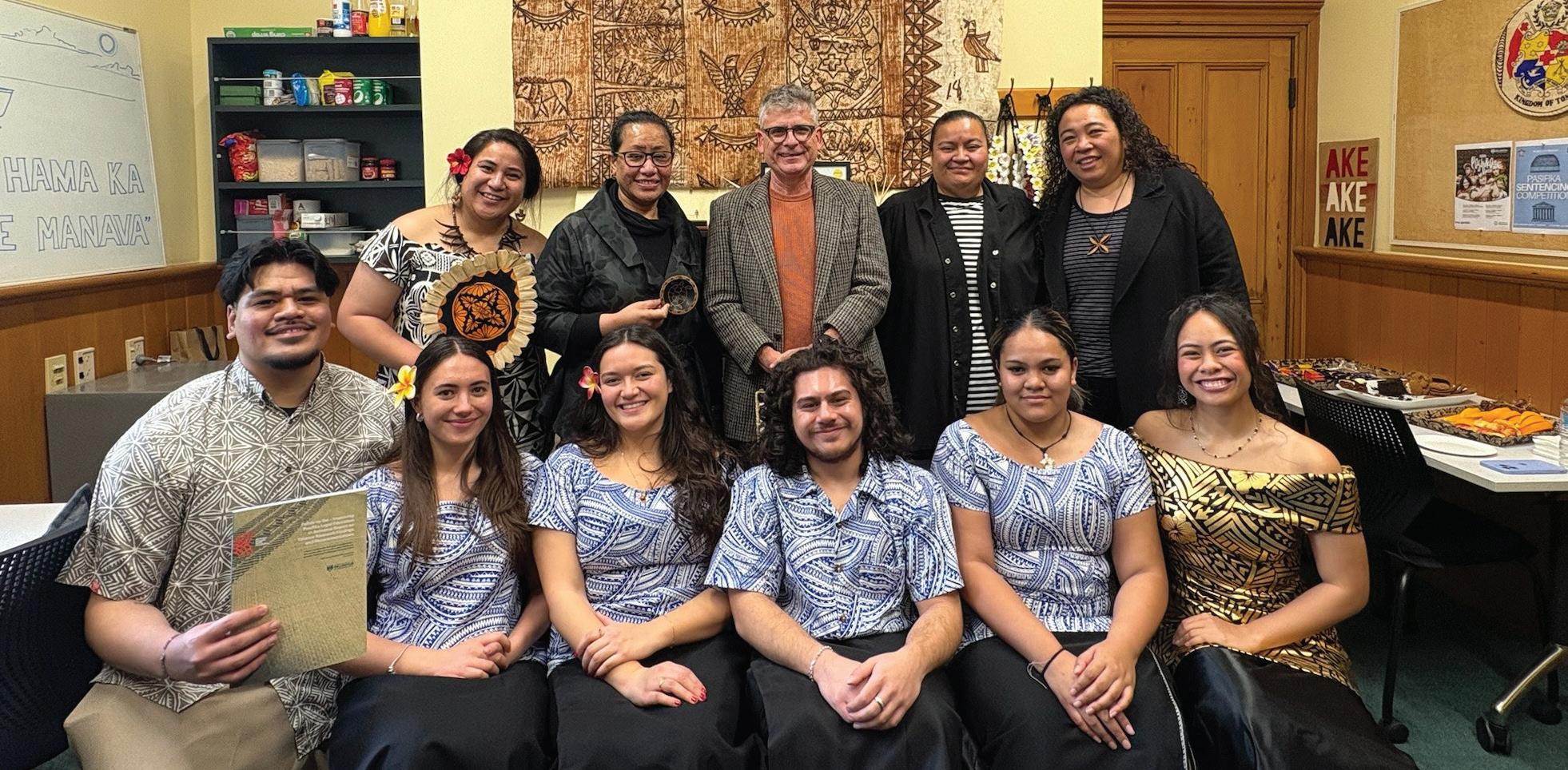
Piki-hama represents the strengthening and nurturing of relationships between PLSS and the Faculty, the Office of the AVC Pasifika, and the Pasifika Student Success team. “I hope it inspires future Pasifika law students to continue to nurture those relationships for years to come. It’s even reflected in the meaning of the name of the room—when we are able to come together, we’re a lot stronger.”
“It’s really important that Pasifika students have this community here with PLSS and with the AVC pasifika alongside pss. This room is a symbol of ‘teu le vā,’ meaning to nurture the space and relationships, all of which come together as a united front. It’s in this united front that we see so clearly how the wider university values our Pasifika law students, and really acknowledge that it takes a lot for them in their journey to get here.”
They shared the struggle of being Pasifika in law school where the nature of it is very competitive, with only a small Pasifika cohort, and a lack of people to relate to. This makes having Pasifika spaces so important.
“If I had one thing that I could say to our students, it’s please just come to the room. We talk about how we want to nurture these relationships, and how we’re stronger together as a collective. The more people we can see there, the more connections we foster and relationships we build, the more normal it feels for us to belong at law school. When we have spaces like Piki-hama to build those connections, it’s like we have this collective team to support us on this journey.”
Another message that presidents Tarifa and Marshall shared was: “A lot has gone into this, and it’s for you. We’re just a small minority of the law school community as a whole. People have things to say, they have rhetoric they want to believe, but these places are here for you, and the Faculty acknowledge and see the importance of that, hence why they’re there. We get to go into the room, and we can be ourselves and relate to one another in a safe space that belongs to us.”
“You can be confident in yourself there. When you step out of that room, you have that security and confidence, because you know that Piki-hama is the foundation that will be there to support you, rather than kind of coming into OGB and it being this big colonial building where you feel no sense of belonging because we don’t see ourselves in any of the photos on the walls or in the history of the building at all. I’m hoping that more students can come into this room and their perspective changes.”
“This is the beginning of something—a reflection of our students’ growth, and now Piki-hama has this identity, one that can really resonate with our students. It gives them that sense of belonging, and that is really important to who we are.”


From the 18th-24th of August, Ngā rangahautira took a delegation of senior Māori law students to visit the Indigenous Law and Justice Hub at Melbourne Law School.
In december 2024 Ngā rangahautira hosted a group of academic staff and students from the Indigenous Law and Justice Hub (“the Hub”) at Melbourne Law School. We shared a kai of hāngī and had the opportunity to kōrero about indigenous law and culture here in Aotearoa (we even convinced some of them to attend the opening of the living pā!!). Following that and other meetings, we thought it was about time that we returned the favour, built on those connections, and made a trip over the ditch.
Our first day began with a visit to the Hub for introductions. We were taken on Billibellary’s Walk around UniMelb, where we discussed the indigenous and colonial history of buildings around the campus to help situate us in people and place. We were lucky enough to get a peek at the 65,000 Years exhibition at the university’s art gallery, which collected work from Aboriginal and Torres Strait Islander artists around the country. We finished the day with a Welcome to Country from Wurundjeri traditional owners alongside members of Tarwirri (the Victoria Aboriginal and Torres Strait Islander legal professionals group).
Tuesday was a day of learning with lectures in the Hub on Australian constitutional arrangements, Land Rights and the ongoing Victoria Treaty Process. We attended part of a conference on decolonising higher education and supported Ngā rangahautira members who presented on the Te rauhī i te Tikanga—A Tikanga Companion research project with VUw Māori law lecturer and legal academic Māmari stephens. we finished the night with another visit to the art gallery for the opening of the 65,000 Years exhibition.
On Wednesday we went out to Preston to visit the Victorian Aboriginal Legal Service (VALS), and got to hear first hand from lawyers, policy makers and community workers about their key work. In the afternoon we visited the
Treaty Authority - the independent body that oversees Treaty-making in Victoria. One of my highlights from this trip was participating in a cleansing/clearing ceremony, and adding to their timeline of significant moments in Australian and international indigenous history. I added a cheeky post-it about the legal personhood of Te Urewera—a measure that has been replicated in Australia with the legal personhood of the Birrarung (Yarra River).
Thursday we started in the Hub and heard from the Director of the First Nations Justice team at the Human Rights Law Centre. After that we caught the tram to the First Peoples’ Assembly of Victoria—the representative body of Treaty for Victoria. That night we heard from a panel about Dreaming on Indigenous Legal Education including from our own Dr Carywn Jones. It was so interesting to hear everyone’s thoughts on indigenising legal education—and sing them a waiata too!
On the final day we spent the afternoon with our whānau from across the Moana Nui-ā-Kiwa.
The afternoon began with presentations from Pasifika academics at the Oceania Institute about pese sāmoa and pacific climate lawyering at the International Court of Justice. We ended with a kava and talanoa session at Te M’aneaba with the UniMelb Pacific Islands Students Association. we shared kōrero and brought our guitar to share some waiata too. To close our programme we performed a bracket for the team at the Hub who looked after us during the week, to share our thanks and conclude on a high note.
This trip presented an invaluable opportunity to learn and share in Aboriginal and Torres Strait Islander law and culture at the Melbourne Law School and wider Victoria area. Following the 2023 Voice to Parliament and Treaty for Victoria, indigenous rights are coming to the forefront of the Victorian social conscience. I know that we will forever treasure the time we spent in Naarm and the people we met who facilitated our learning journey.
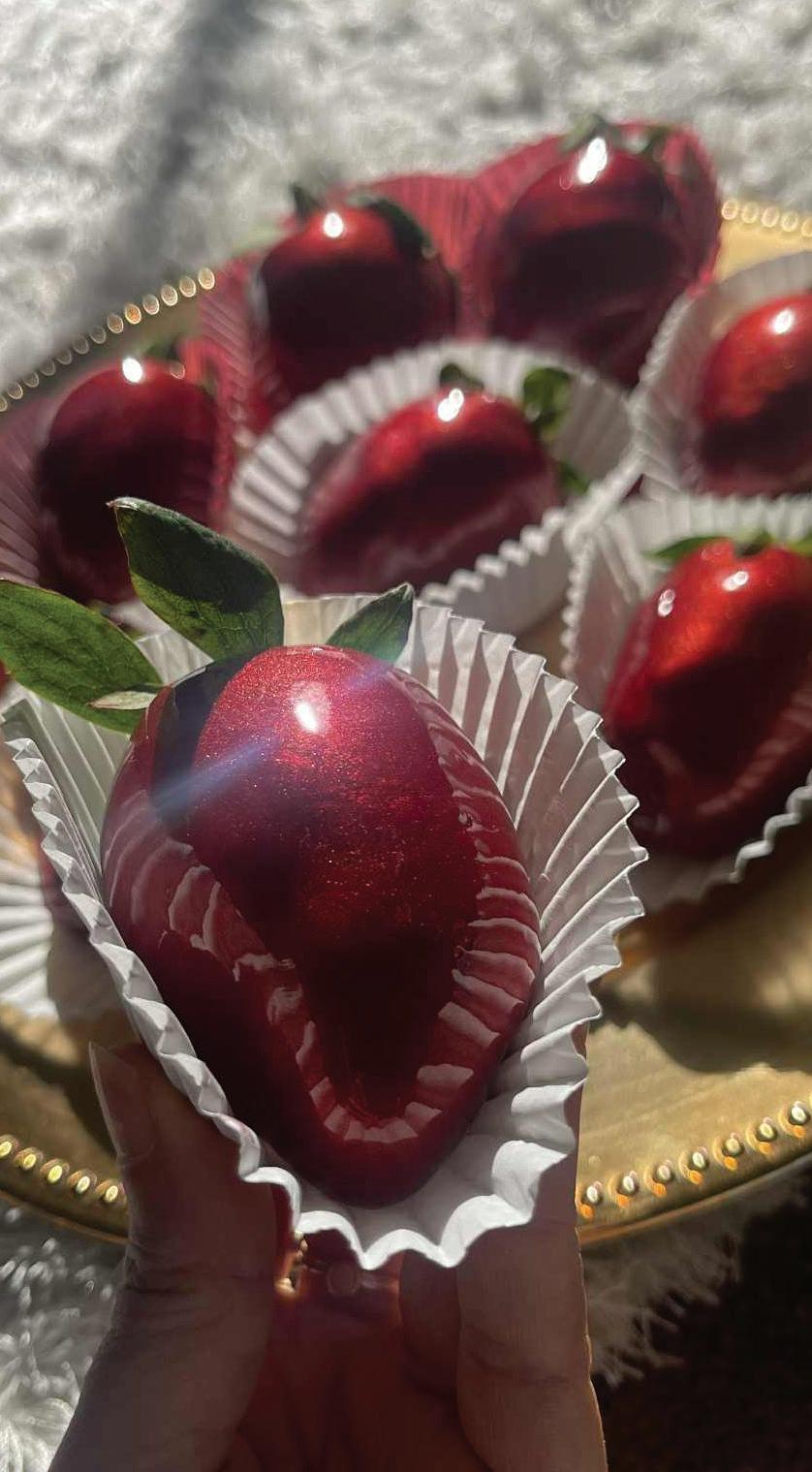
In Brazil, there is a sweet known as Morango do Amor, or Strawberry of Love. At its heart lies a whole, ripe strawberry, sealed beneath a shell of glossy caramel sugar. When made correctly, the caramel crackles delicately between the teeth, a crisp contrast to the juicy fruit inside. But this is no simple task. As any pastry chef will tell you, the line between brittle and sticky is razor-thin; a few moments too long or too short, and the caramel can ruin the experience.
For Dayana Felix, a Brazilian chef now based in Wellington, the Strawberry of Love represents more than just a dessert—it’s a symbol of the precision, patience, and passion that first drew her into the culinary world.
I spoke with Felix last month from her quiet Roseneath flat and at the door was greeted with the aforementioned dessert. She spoke openly, her stories punctuated with laughter and the occasional glance towards the planes flying low overhead.
Felix grew up on her father’s farm in Paraíba, in the Brazilian countryside. “Really poor people when we were there,” she recalls. But when she turned 18, she set her sights on Rio de Janeiro. It was there that her fascination with sweets began to take shape. “I was always crazy about chocolate. Every day I had to make something for me, like a dessert!” she laughs. While working as a cleaner in Rio, Felix enrolled in a two-year pastry course. After earning her certificate, she began baking cakes from home, slowly building up customers. With every dollar she saved, Dayana invested back into her dream, eventually opening her own pastry store. For four years, she ran her pastry shop. But life took an unexpected turn when she came here to Aotearoa—originally for just three months.
Felix arrived in New Zealand in March of 2023, speaking no English; she came only briefly to help her sister. To acquire extra money she searched for a job part time. Felix tells me a funny memory of her knowing no English except the words “I am looking for a job. Anytime, any day. anywhere.” Not long later she found work in a kitchen. At first it was slow work, she spoke almost no English. “I could see how crazy they were working, not organised, but I couldn’t help. I didn’t understand,” she recalls. She started with dishes—“because it was easy”—before moving to the fryer. Slowly, she learned the language of dockets and moved onto the fryer. At this point it became clear she was to stay In New Zealand indefinitely. She recalls as her English improved the old head chef would use Google Translate to describe her work to her. “She’d translate everything to make sure I got it,” Felix told me. Not much longer later and she was covering for the chef herself. Felix’s rise through the kitchen was fast.
EHer turning point came during Wellington on a Plate, the city’s renowned food festival. “The head chef quit right before WOAP,” Felix remembers. “We had no one to make the burger, but I had seen her do it once. My English was still bad, but I told Anna, our manager, ‘I think I can do it.’” She laughs at the memory of misunderstanding the instructions. “They said it needed to be sticky, the texture, but I thought they meant the flavour. So I made the marinade all wrong. Later, Anna showed me a photo and I was like—ahh, now I get it! The secret was the tapioca flour.”
From there, Felix began developing the dishes that would become staples on Bebemos’ menu. Together with Anna, she refined the slaw, reworked the marinades, and created jalapeño poppers that were not only gluten-free but vegan as well. “It was a horrible idea, to make them from scratch,” she jokes, “but people loved it. And now it’s one of our bestsellers.”
"I think when you guys watch me cook maybe I still have pastry chef hands."
Her success during that WOAP earned her the role of head chef. “ After WOAP finished I went on holiday to Brazil for four weeks and before I left, Anna decided to tell me that I was being promoted to head chef.” The rest is history. Despite thriving in her role, Dayana admits pastry has never left her hands. “I think when you guys watch me cook maybe I still have pastry chef hands. Even putting the parsley on top is different,” she smiles. She told me that jalapeño poppers are the closest thing to pastries. “When I’m making jalapeño poppers I feel like I’m making pastry, because it’s really delicate with breading and stuff.”
Felix tells me that in her early months in Wellington, the long hours left little room for her pastry-making. “For a while, I thought maybe I don’t miss it, maybe I just want to be a chef now,” she says quietly. But through the strawberries of love I was gifted at the door it was clear that pastry-making was in her blood. “Thats one of my goals in NZ, I might just work just for me, start again and do my pastries because that’s something I feel NZ doesn’t have that much”, she says, with the same determination that once took her from a farm in Paraíba to the kitchens of Rio, and then across the world.
Felix has been the creator of Bebemos’ most recent Wellington On a Plate competition, and it’s clear the roots are in pastry-making. This year’s theme is Food is Love, and it’s clear Felix’s love of pastry shines through with Bebemos’ burger entry, Pretty On The Outside. Pictured here, Pretty On The Outside is built on a cronut base and layered with minced, grilled chicken breast patty with streaky peppered pancetta, balsamic caramelised onions, deep-fried brie, dill pickle, and rocket—all glazed with a sticky
Ryan Cleland (he/him)
strawberry chilli jam. Having watched Felix create it in the kitchen countless times it’s clear It’s a creation that marries precision and indulgence; each piece of the burger-y puzzle is layered together finely—a clear reminder that, for Felix, pastry is never far from the plate.
As she continues to lead Bebemos’ kitchen, Felix looks ahead to the future. She tells me that she would love to learn the basics of Italian cuisine. “One thing that I love is pasta, and I’d like to know how to prepare the perfect pasta”, she tells me, before comparing pasta to pastries: “it’s more delicate and it’s a lot of process to make the real dough.” Leaving Felix’s home that day I felt the same thing she had been describing all afternoon; the quiet discipline and care that go into every detail of her work. Just like her Morango do Amor, her journey has been one of precision, patience, and a little bit of risk— balancing the brittle and the sticky, the sweet and the sharp. As Felix tells me “I think everyone can be a chef. But pastry… you really need to love that.” And it’s clear she does. If you wish to see more of her work you can check her instagram page at @chef_na_nova_zelandia_
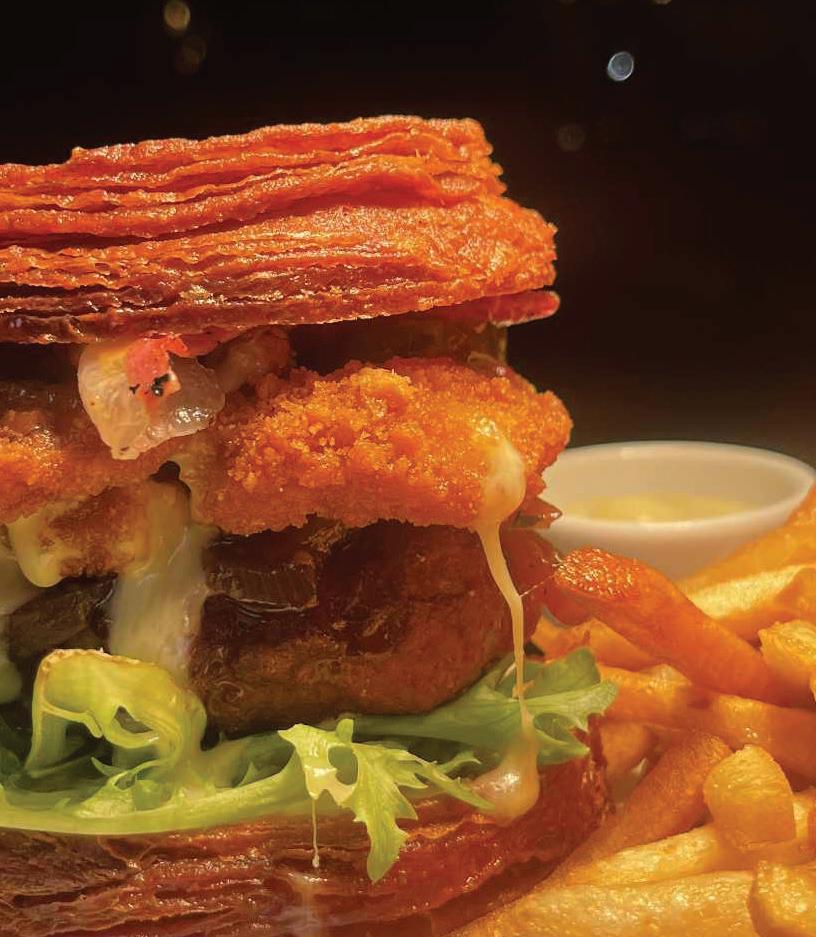
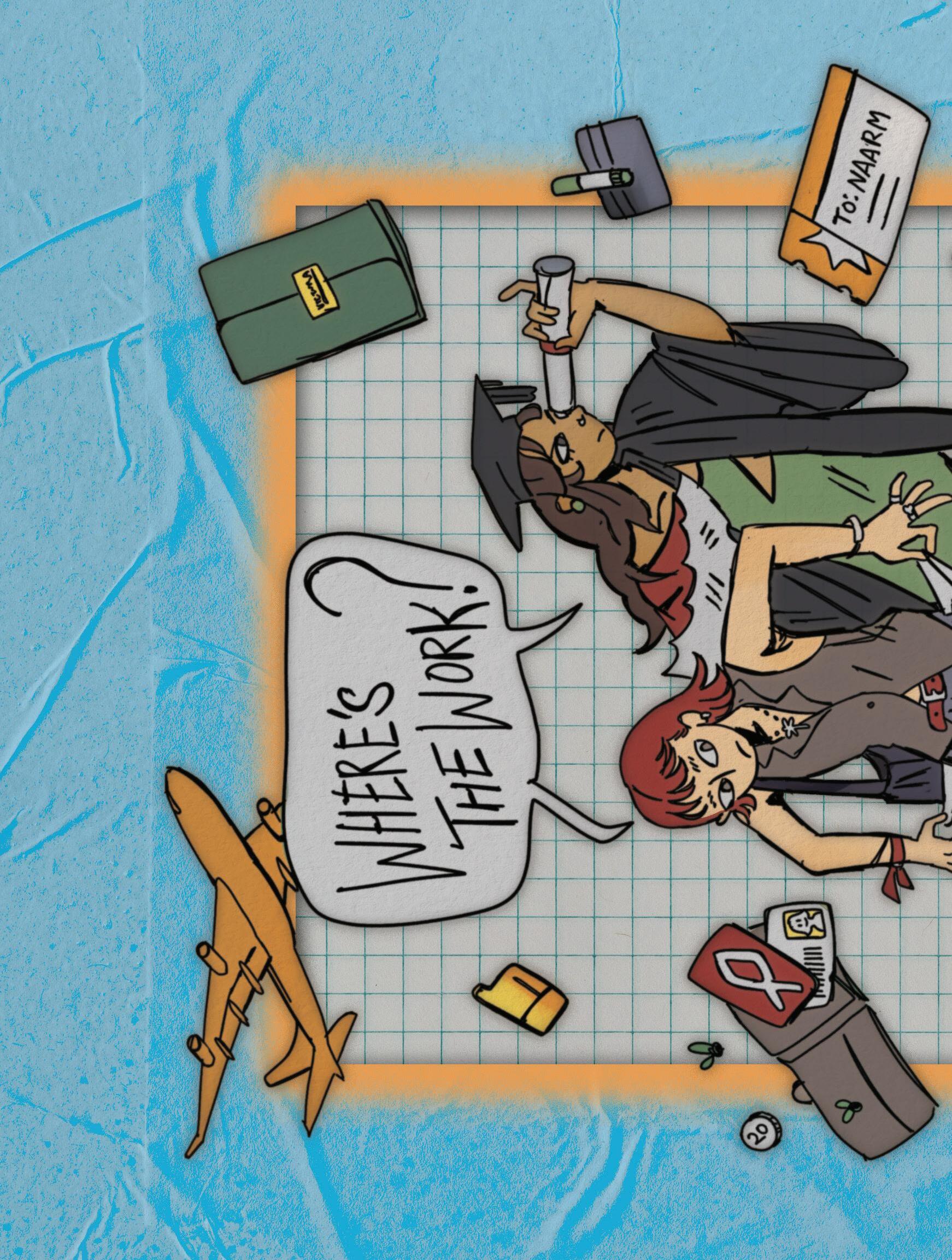
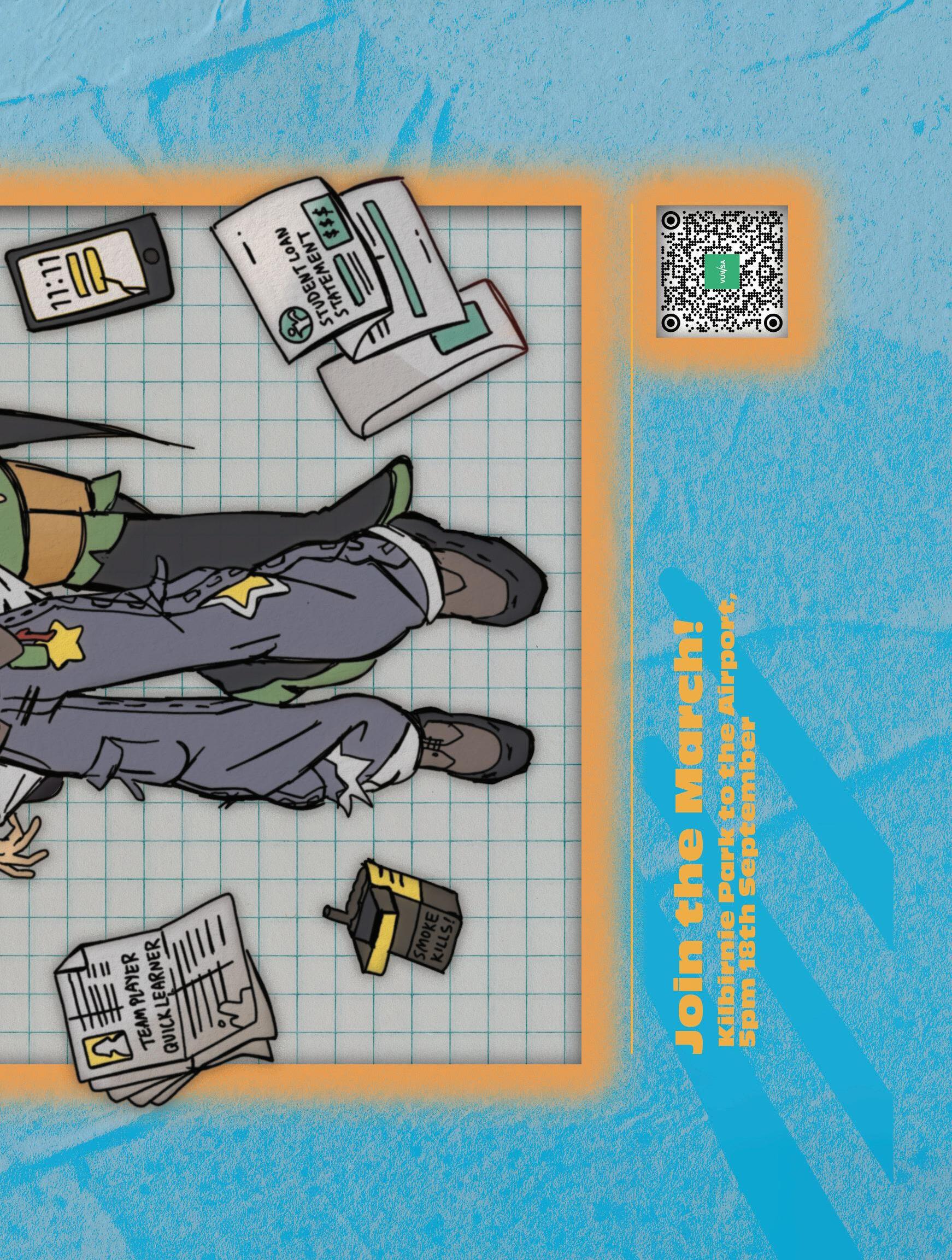



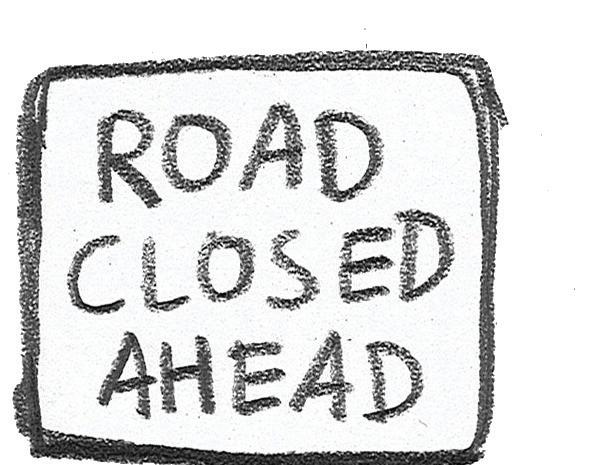
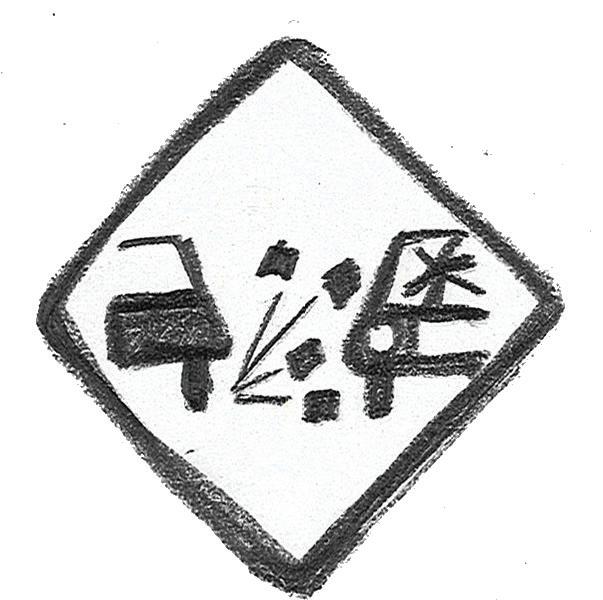
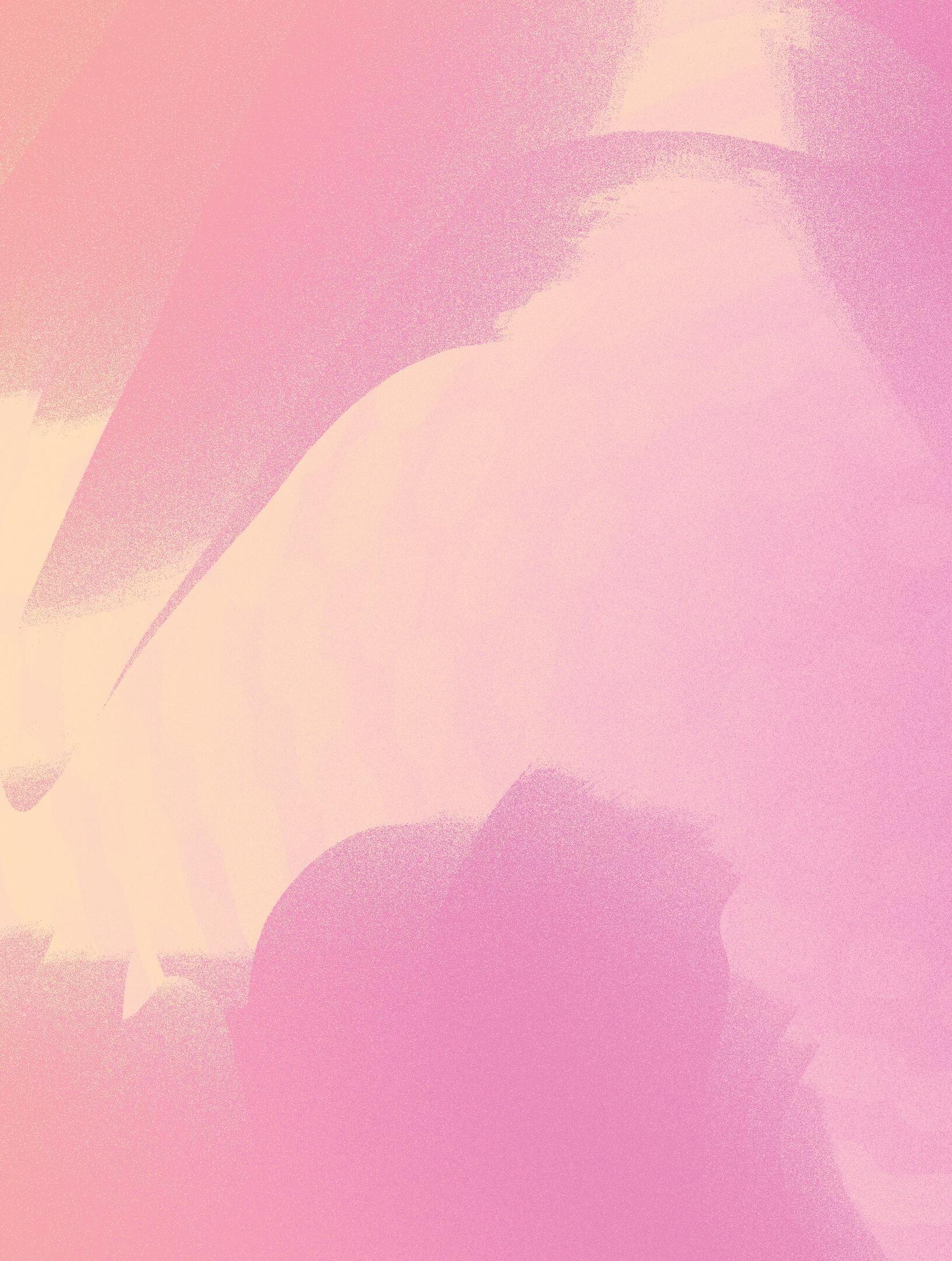
Dedicated to my second mother, who is always here for me and filled with wisdom. Love you lots.
So, you’re in a situationship. Let me guess: he’s perfect for you in every way, but he doesn’t want to commit to a relationship.
I hope that after reading this, you will free yourself—if not for your own sake, for the sake of your friends, who are tired of hearing his name come up in every conversation.
We need to stop lying to ourselves. We are not content with being left on delivered for over 24 hours, all while watching as his profile picture appears under our story viewers. Being nonchalant is strictly out in 2025. You deserve someone who matches your energy. If you’ve found yourself stuck in a limbo of confusion and uncertainty, something needs to change, and it needs to change now. The longer you let it drag on for, the more it’s going to hurt. Besides, you’ve got more important shit to focus on—such as catching up on your skipped lectures— than on mulling over some guy’s low-effort messages.
This is your guide to finding clarity and moving on. To begin, you need to know what it is you want and need. You shouldn’t compromise on what is important to you in a relationship. Next, you’re going to need to talk to him about how you’re feeling and let him know what you need from him. Communication, folks! I know everybody says this, but I do mean it. He’s not a mind reader. If you’re fairly certain that he does like you and is interested in you, but he’s not giving you enough, you’re going to have to tell him.
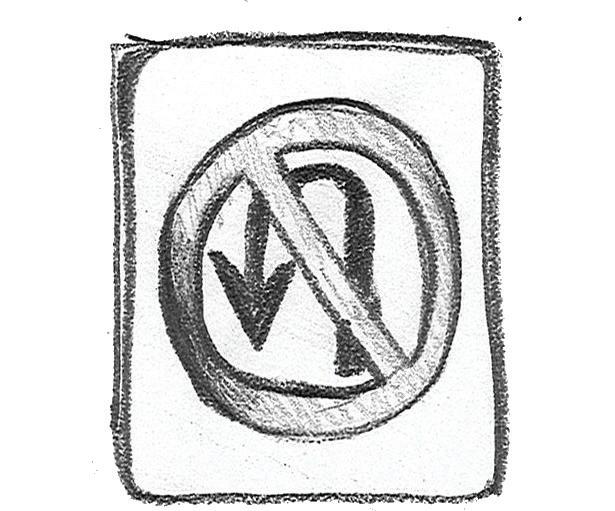
Unfortunately, it’s much easier to imagine this conversation in theory than it is to do it in practice. I find it helpful to use my trusty notes app to bullet-point key things I want to discuss with him. You never want to forget to bring up something that was important to you, so write it down now! It also helps to have a plan going in, and having talking points can help you figure out how to phrase things in advance.
That’s the easy part. Actually sitting down and talking to him is a lot harder. It can feel vulnerable, especially if you’re not used to it, but it’s an important thing to practice doing as I guarantee you will have many similar and equally as difficult conversations in the future. Be direct and ask him to meet up in person to talk, perhaps over coffee or shisha. Don’t beat around the metaphorical bush, and get to the point. Tell him what’s working, what’s not working, and what you need from him moving forward.
After this, it’s in his hands. Best case scenario, he will listen and take on board what you’ve said, and you can disregard the rest of this article and live out your happilyever-after with your new boyfriend. But this doesn’t always happen. He might prefer to let things sit in a grey area, or establish a friends with benefits type thing (although I’ve noticed that the majority of friends with benefits tend to leave out the ‘friends’ side of the deal.)
This is when you need to stand firm in what is important to you. Only you know what your boundaries are, and what you’re genuinely happy and comfortable with. If you know that you want a relationship, and he doesn’t want that, save yourself the heartbreak and end it then and there. The love of your life is not
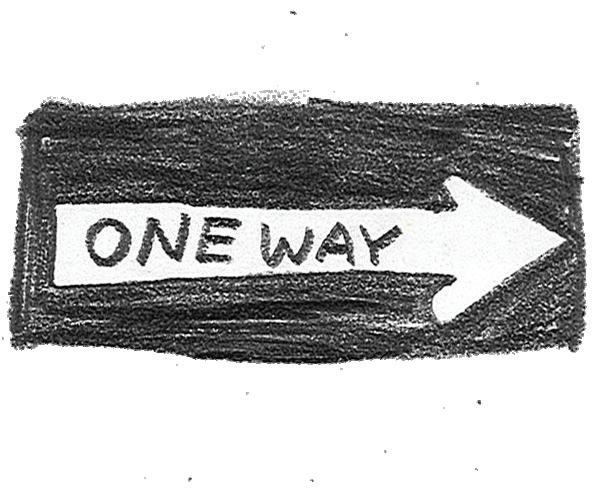
Te Urukeiha Tuhua (he/they/ia, Tūhoe)
the guy who is on the fence about whether he wants to be with you or not.
But it can be hard to let go of someone, even when you know it won’t work out. I’ve been there before, holding on to the little things he gives me and telling myself that it’s okay. The what if nags relentlessly. I know you’ve projected a lot of your romantic hopes and dreams onto him, and your imagination comes alive as you think about all your possible futures together. If you’re anything like me, you have a playlist just for him that you listen to on repeat. How can we learn to let go and move on?
First, think about who he actually is, not who you want him to be. This can be a bit tricky, because it requires you to remove those rose-tinted glasses. Forget about your romantic fantasies for a moment and take a step back. Sometimes situationships can feel really intense, even without truly knowing the other person on a deeper level. What is he actually like, and what does he give you?
If you’re not sure, ask your friends. Their thoughts are more objective than yours, and their advice is undervalued and worthy of taking on board. It may also help to write a list of all the things you dislike about him that you would change if you could. This list may include (but is not limited to):
1. Dresses like a walking talking Hallenstein Brothers advertisement
2. Leaves the toilet seat up after using the bathroom
3. Has an annoying habit of chewing with his mouth open
The sooner you realise that he’s literally just a guy, the easier it will be to let go of him.

A very wise woman once told me, “When someone shows you who they are, believe them.” Your idealised perception of who he is tells you a lot more about yourself than it does about him. These ideas and dreams and hopes won’t die when you end things with him, because they live on inside you. They are part of what tells you who you are, and what you want and need from your future partner. If things aren’t working and nothing seems to be changing, let it go.
You simply can’t change the way another person operates, and what he does is out of your control. Give yourself some space. Cry if you must. Have a cigarette and listen to "Waiting Room" by Phoebe Bridgers. Sometimes we’ve gotta let ourselves get a bit dramatic.
But when you’re bored of that, listen to "Alien Superstar" by Beyoncé, because you are that bitch. Dance the night away diva. “I’m too classy for this world, forever I’m that girl…” You’ll continue onwards and upwards regardless of what happens.
One day, you will find someone who treats you like a princess. The guy who is sporadic with communication and leaves you feeling confused is not the love of your life. But that’s just the way things go—and as my second mother in pōneke told me recently:
“Sometimes you kiss a couple of frogs and then you find your prince. Blow a kiss in the wind and enjoy the breeze.”
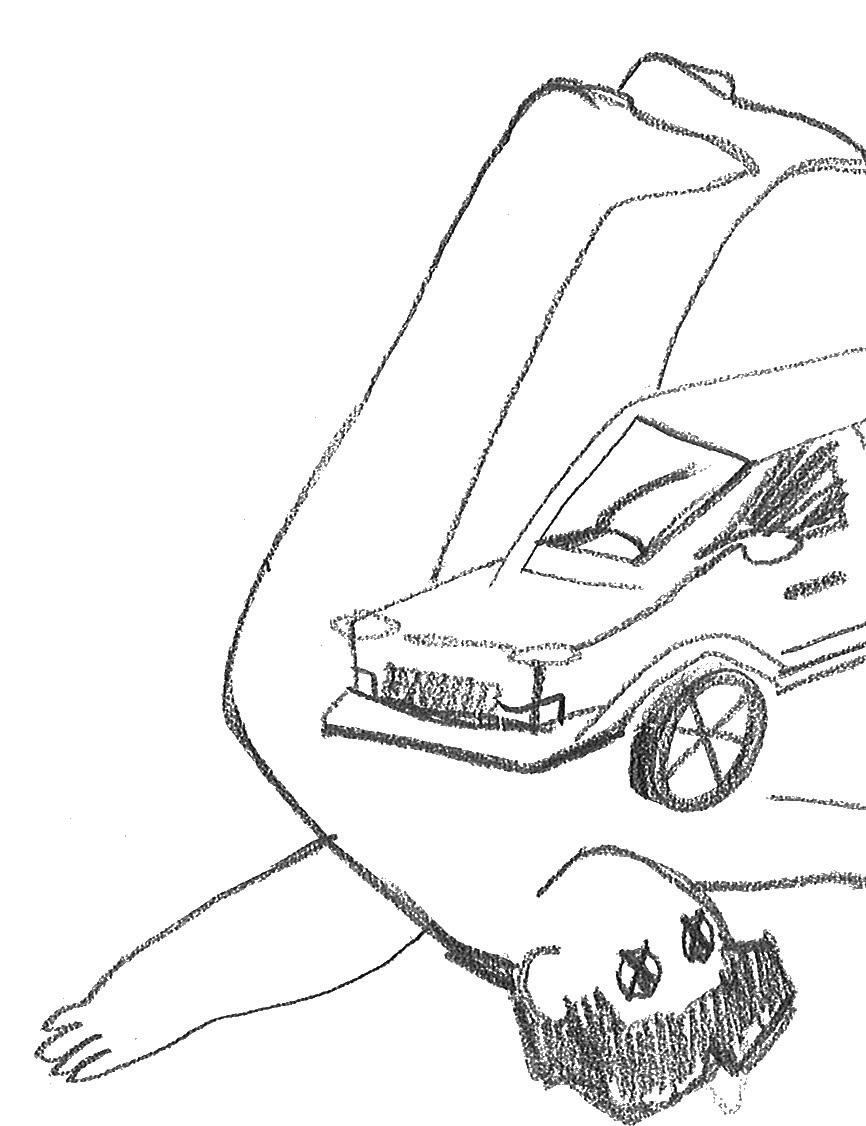

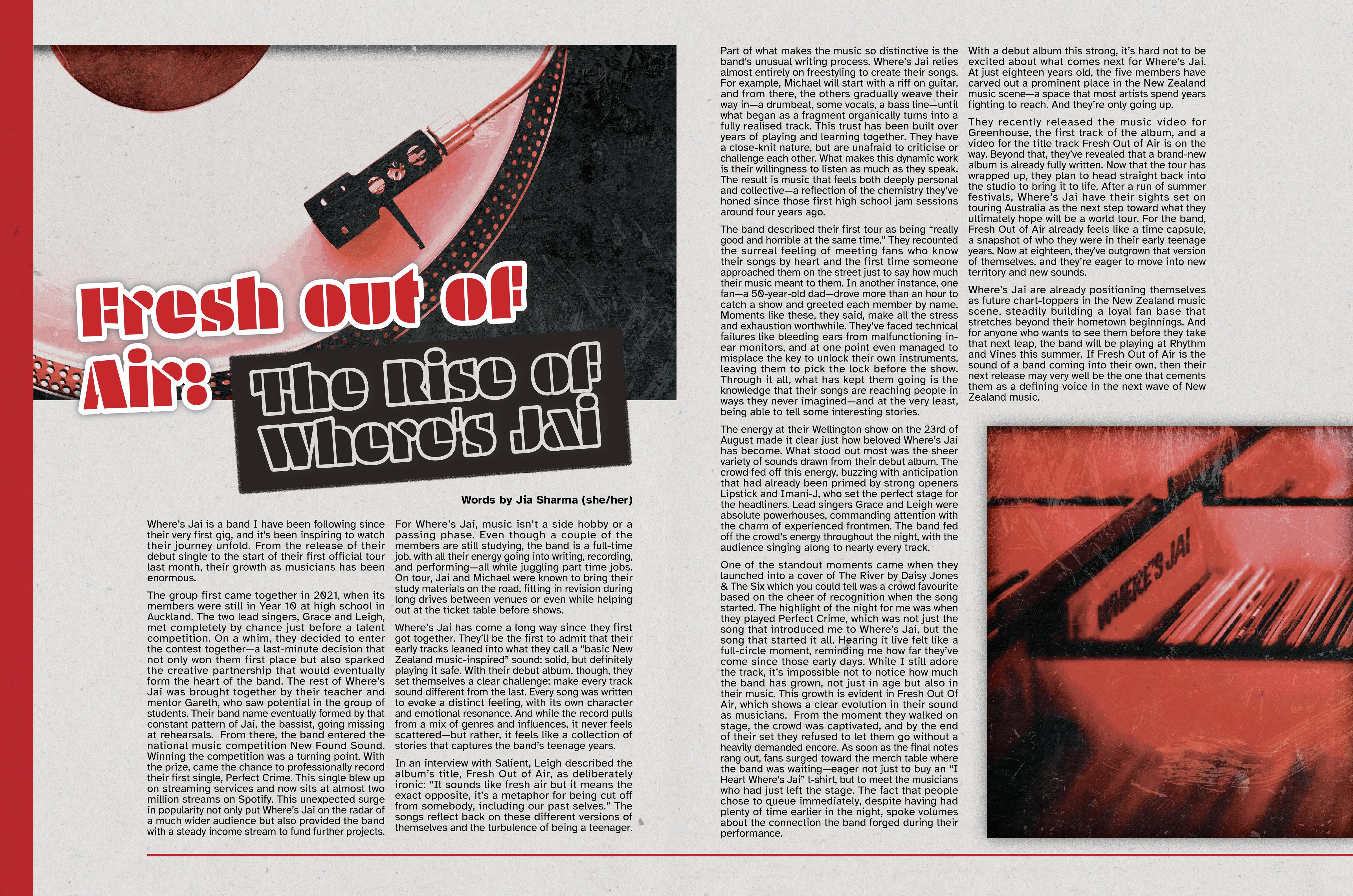

Words by: Tamanna Amin
The wind rustle s the leaves. The sun slips behind a passing cloud. Thomas sighs. A dog barks from behind a fence. The world spins on, as normal.
There’s a ringing in his ears, although the walk home is dead quiet. The houses lining the street sit still, unmoved. It feels like a ghost town today. His hands tremble as he fumbles for the key, unlocking the front door.
‘Hiya, Tom.’
‘Hi, Ma.’ His bag drops with a small thud in the hallway.
‘Good day at school?’
Thomas shrugs, pouring a glass of water. ‘Same as it usually is,’ he mumbles. There’s a swirling sensation in his gut—slow, gnawing. He drains the glass and tries to slink off to his room.
‘...Have you thought about going to the funeral at all yet, dear?’ she asks. This freezes Thomas, brain lagging behind as his toe crashes into the doorframe
He winces, swallows a lump in his throat, and nods.
‘’Course I’m going, Ma.’ he says through gritted teeth, eyes definitely not prickling at the corners.
Thomas knows all the names of the emotions he’s feeling—and had been feeling for seven days now. He knows their origins, their mechanics, why and how to get through it. For some reason though, none of this helps. Not the burning sensation, not the mental numbness. He can’t accept it. He won’t.
Grief has taught him one thing: the tense way one’s throat seems to seize and close when you feel hurt. The way the esophagus seems to inflate, painfully and sharp, telling you not to scream and cry out when things are out of your control. Some things, he realizes, you can’t reason your way out of—whether you’re fourteen or forty.
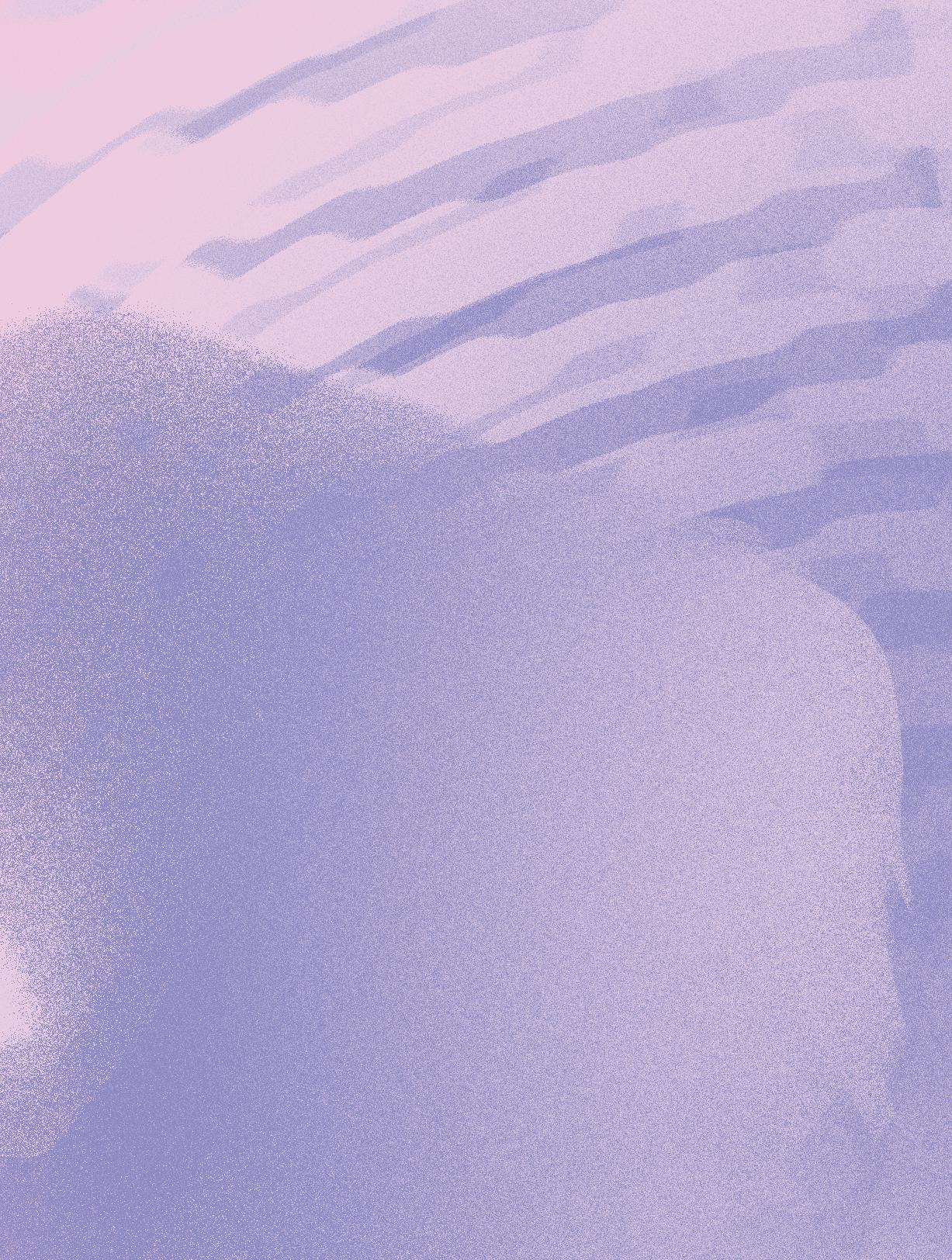
When the news of Louise’s death came, he was caught off guard. He hadn’t cried. In fact, he’d made a poorly timed joke just moments before his mother answered the call from his old primary school. ‘Ha, imagine if Louise’s kicked the bucket or something.’ Then he saw his mother’s horror-stricken face—an unspoken confirmation. It hadn’t been funny at the time, and now, it felt painfully inappropriate.
But she’d have laughed. He’s sure of it. She always laughed powerfully, strength in everything she did. The way she spoke in the classroom, her posture, her humour, her care. There was even strength in the times she’d fall short—no apologies, just silent change and growth. A leader. An example.
Louise was close to everyone she taught. Thomas was just one of many. She was like a second mother, always trying to push him past his limits . H e was a little bit older now, and although he visited her sometimes—discussing choices for high school, making plans to have a proper sit-down chat sometime—they weren’t in contact much anymore.
She was invincible. Dying? Impossible... His brain refuses to compute it. She’s the one who had opened his shell, the one who had made him confident. She’s the one who brought him to the opportunities he has now. She is the most unstoppable force in his life. Was.
Thomas sighs.
It takes him longer to fall asleep that night. As he tosses and turns, nightmares of her come alive to point the finger of blame at him. Dreams of better days, nerves before a big speech comforted by her presence: loud, unabashed, unapologetic.
Morning brings a dull ache in his stomach. He avoids his mother’s pitying gaze, speaks only a few short words when spoken to. It’s the quietest he’s ever been. Louise would have teased him.
‘Come on, Mister Public Speaker, what’s wrong with you?’ she’d say. ‘You usually never shut up, what’s changed?’
He can’t even entertain her voice rattling in his mind this morning. He tugs his shoes on anyway. It’s time to go.
The funeral is packed. He knows she had a wider impact than just him, he knows that. But still, a pang of protectiveness rings through him. As if he has more to mourn than anyone else. She coached him through speeches, nudged him to thank people on field trips, lightened the weight of his father’s absence during parent-teacher interviews.
But she wasn’t his alone. She had a family. Other students. Colleagues. He shouldn’t be selfish. He should be stronger. He should be braver.
If he goes there, to the casket, if he sees her, it’s real. It becomes real. He moves his face away, and sees his old classmates and friends, her family and colleagues alike, mourning. No matter where he looks, he’s surrounded by this heavy grief. It’s humid, and heavy, hanging over their heads. The people here all wear different expressions—some stare blankly with rivulets of salt water streaming from their eyes, and some have sad smiles as they talk quietly to one another—but the grief is palpable. He can see it in the darkness under their eyes, he can hear it in the shaky breaths they take, he can feel it creeping up his own back. Threatening to touch him, too.
Then the crowd settles. Quiet shuffling. Seats taken. He exhales. Saved by the bell. He shakes it off with a roll of his shoulders, blinking slowly twice and finding his seat.
The service starts the way he thought it would. Slow words from a solemn speaker about who she was and what she did. Thomas finds himself bristling quietly, almost finding the usage of past tense funny in a bitter, denial-ridden way. Who she is, he thinks. What she does, he thinks. How can they really describe her like this? Let me out of here, he pleads silently. Anybody, just get me out of here and I promise I’ll never make a joke like that again.
‘We now open the mic to anyone who would like to speak about Louise.’
His heart drops.
She would’ve pushed him to speak. He can almost hear a little ghost of her whispering in his ear, ‘Oi, you! Get up there it’s me you’re talking about!’
There’s so much he wants to say. It would feel wrong to not say anything about her but, oh God, will it be real. It’ll be so real if he says something. He could choose to live in this little haze of denial and just never coming to terms with his feelings and her passing. He could choose that, that’s a nice place to stay, a comfortable place.
Yeah, he might just
‘Step out of your comfort zone, Thomas!’
Of course, she’d said that. Always had to have the last word. She’s damn right: this is nowhere near comfortable.
He feels his legs twitch—an instinct, as if she’d just signed him up for another speech. But he can’t, he couldn’t. And yet, the love he holds for Miss Louise and all she did for him overrule any selfishness he has—his body moves before his mind can register, maybe the first speech since her passing.
He walks to the podium, his pulse quickening with each step.
Thomas sighs, but it breaks halfway.
‘Hello. My name is Thomas, and I… was one of Miss Louise’s students. Miss Louise is... was... um,’
His voice warbles, but he feels something new Something spiralling inside him, climbing up on every organ in him until it clasps around his heart.
Is this grief?
He blinks furiously. Then I don’t want it. I don’t like this one She should be here, not him. But what’s grief, if not a sign of love thrumming under our skin even after one’s death? He loved her. He still loves her, even now. What could be worse than forgetting it ever happened? What could be worse than forgetting her, ignoring her?
‘I remember the whiteboard markers she’d chuck at us if we got too annoying during packing up,’ he blurts out.
There’s a sad, surprised chuckle from the room in front of him. Then some sobs. Then he breaks. And suddenly, he’s okay with being up there.
The connection between him and the people in this room—it’s her, it’s Louise. She can’t really be gone if everyone in this room can feel her. She can’t really be gone if she is the one thread pulling everyone in attendance to each other. Some wailing, lots of sniffling. Thomas pulls himself together with a shaky inhale.
‘It took me a little while to figure this out,’ he says, ‘but I think she’s still here with us. I think if she wasn’t, we wouldn’t be laughing. I wouldn’t be up here talking to you guys. I think she would want us to turn this feeling into something good.’
It doesn’t get any easier to speak. But he keeps going. That might be the point of it all, really. To keep going, even when it hurts. To keep talking, even when you feel like you can’t. To try to keep something alive, even if anything else is gone.
If Thomas talks for long enough, an image will spring to the forefront of his mind: Louise, and a warm, proud smile.
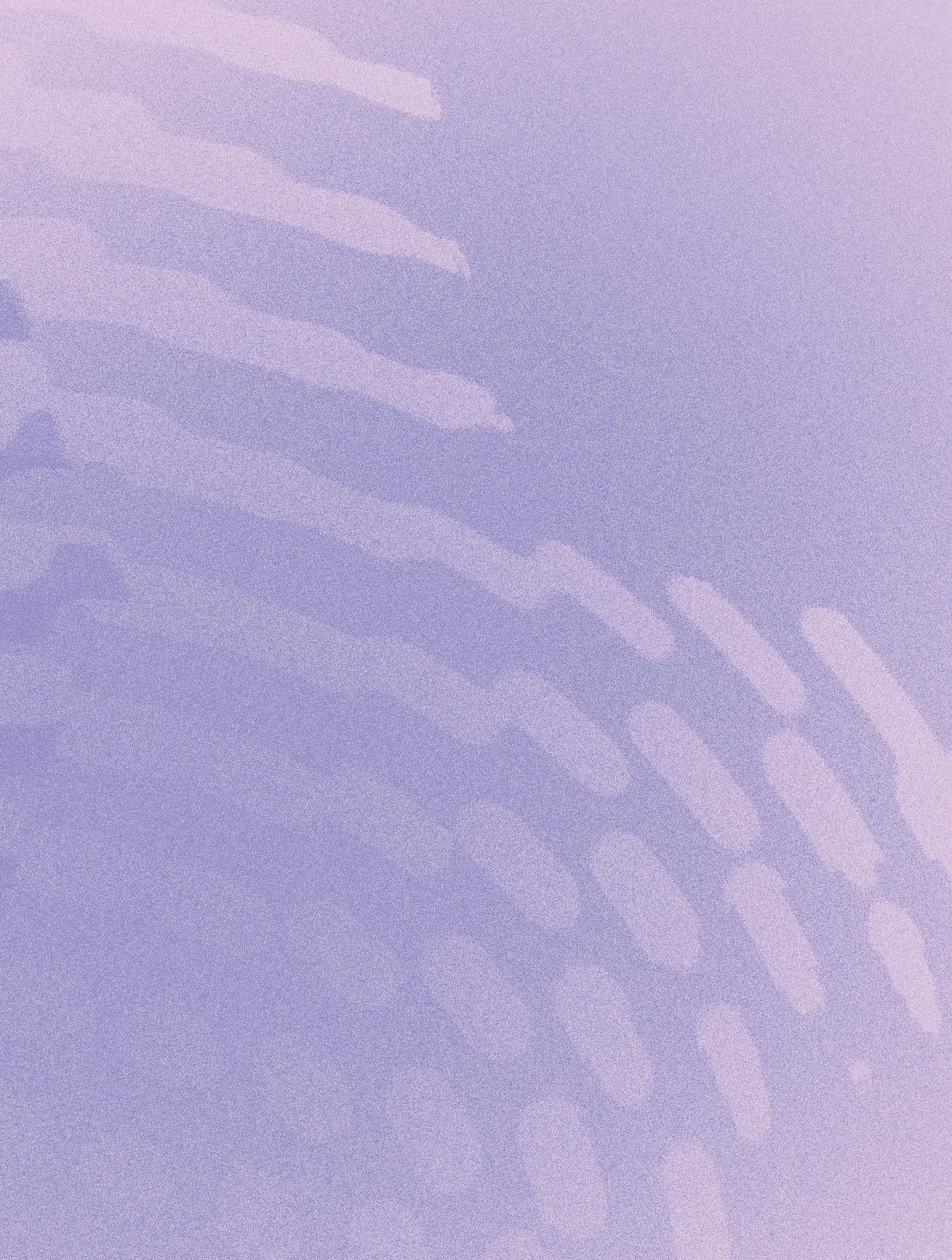

there is more to us than you can read there is more to us than you can speak you can try to understand one or the other but the ihi lies in doing both
you can touch the maunga you can touch the moana you cannot say you know the land until you have laid upon both the reo of my fathers and the reo of the father you cannot say one is greater than the other you need both to understand me
you cannot like my makawe if you do not like my toto they both run through the waters you drink they both made the path you walk my reo means nothing if i do not korero your interest means nothing if you do not whakarongo
Tamanna Amin
a
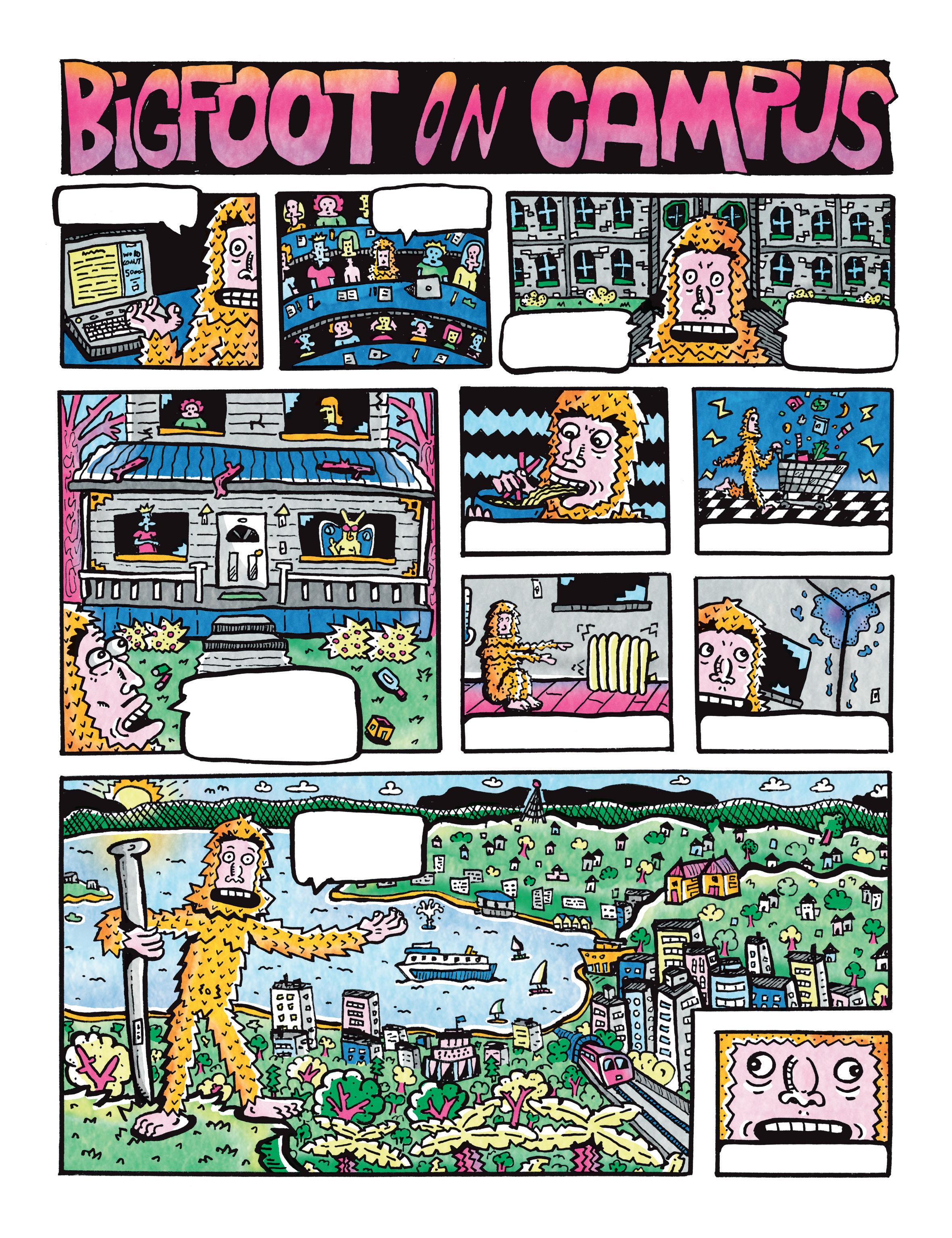
living in this 90 year old Flat, paying $1200 per week, sharing with Four other students...
sitting in my $900 lecture with 600 other students.
studying in the most beautiFul city in the world?
studying my $10,000 per year bachelor’s degree. at this 125 year old, one billioncampus.dollar
1 *Classic Kiwiana toy from the 1950s (5, 3)
5 Sushi accompaniment (6)
8 Opposite of a base (4)
9 *Classic dress-up toy from the 1960s (6, 4)
10 *Classic racing toys from the 1970s (3, 5)
15 Creature found in a lamp (5)
16 Business inits. (1, 1, 1)
17 *Classic puzzle toy from the 1980s. (6, 4)
20 Thor, to Odin (3)
21 *Classic digital pet toy from the 1990s (10)
25 They can be black, chocolate, or golden (3)
27 *Classic animal toy from the 2000s (8, 3, 4)
31 *Classic sensory toy from the 2010s (6, 7)
34 *Not-quite-yet-classic plush toys from the 2020s (13)
1 Audacious (5)
2 Like celebrities available on Cameo, perhaps (1, 4)
3 Holy book (5)
4 What 2026 students will need to do before 1 December (5)
5 Pinot ___ (4)
6 Gentle reminder (5)
7 Substitute teacher (8)
11 Paper-folding art (7)
12 Religion with covens (5)
13 Blow, as a volcano (5)
14 Metalworker (5)
15 Hot tea, for short (4)
18 Southerly winds cause these (4, 5)
19 ___ Jagose, Solici tor-General of New Zealand (3)
22 ___ pal (3)
23 Tuxedo, for example (3)
24 Freezer cubes (3)
26 Drives 120 on the motorway (6)
27 Attics (6)
28 Graffitti (3)
29 "Mamma Mia!" song (1, 1, 1)
30 Shape featured on a Pink Floyd album cover (5)
32 Messages on Instagram (3)
33 Something you might tell a friend who is a bit too sex-positive (1, 1, 1)
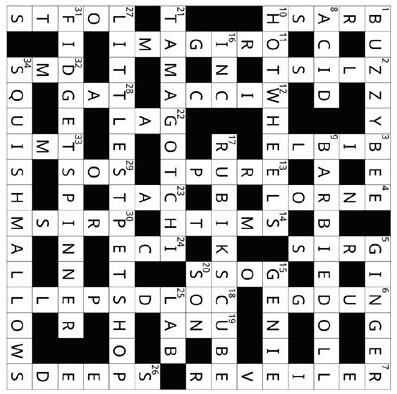
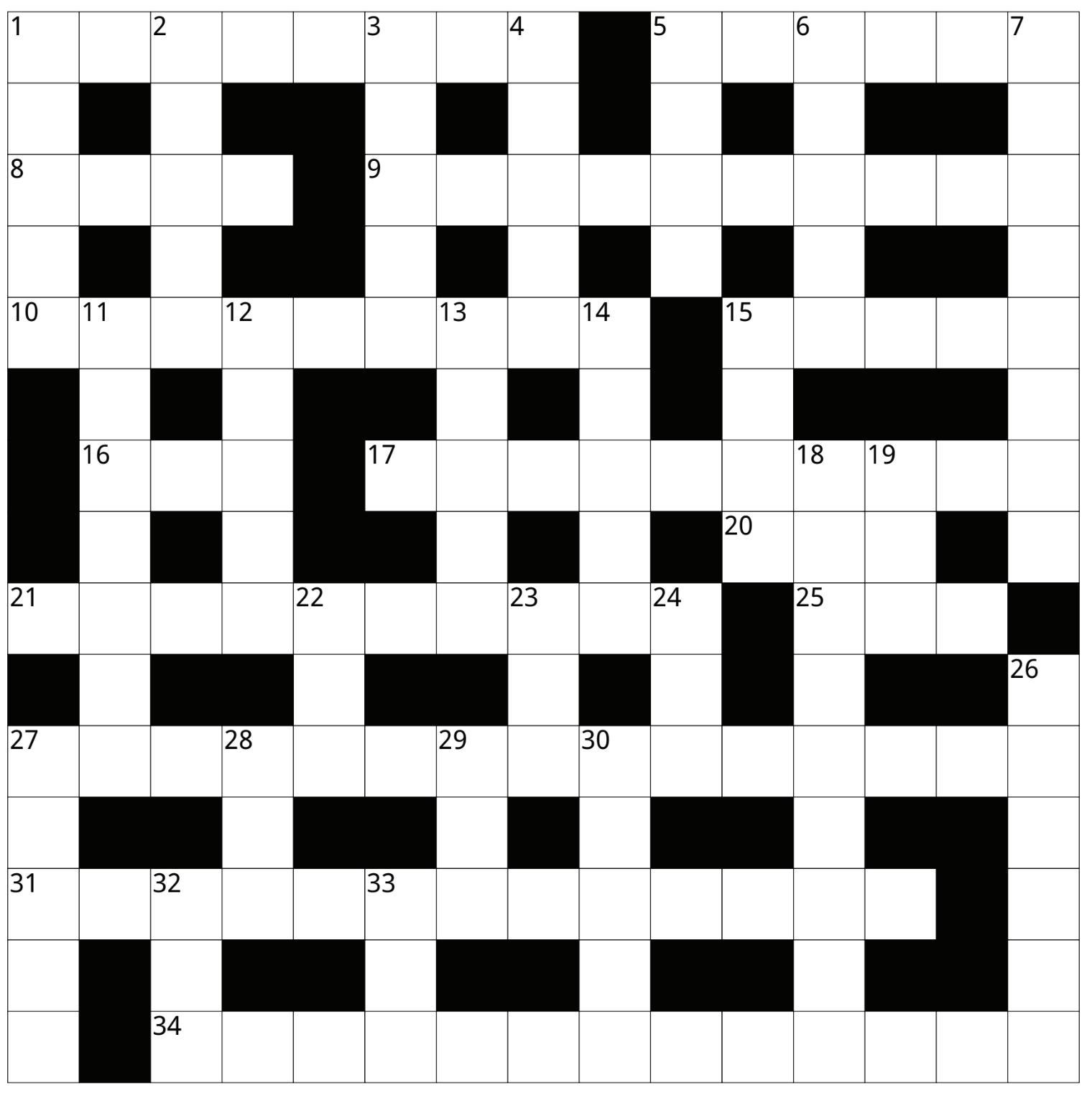


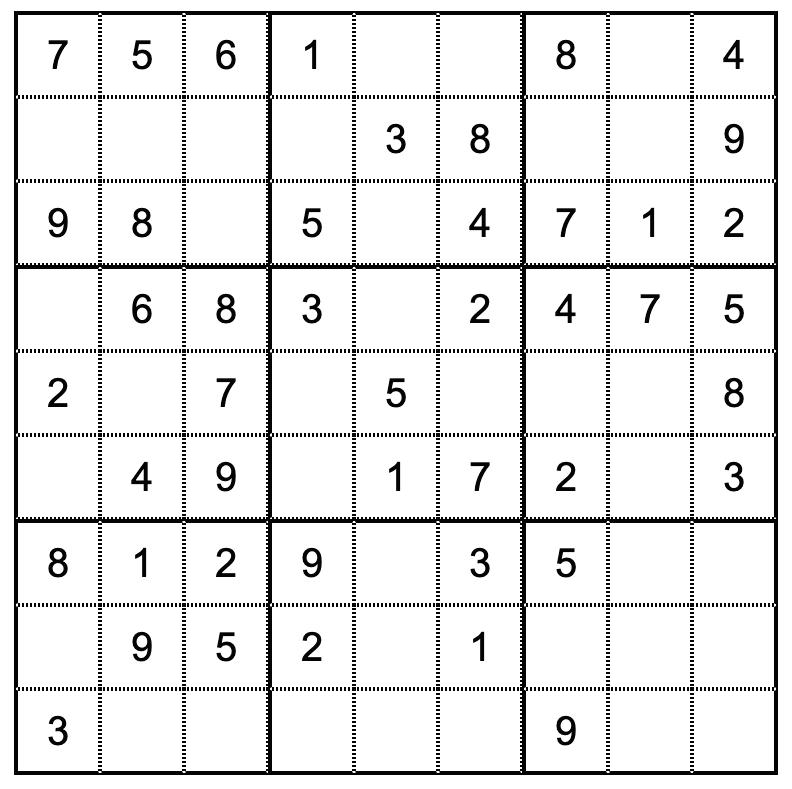
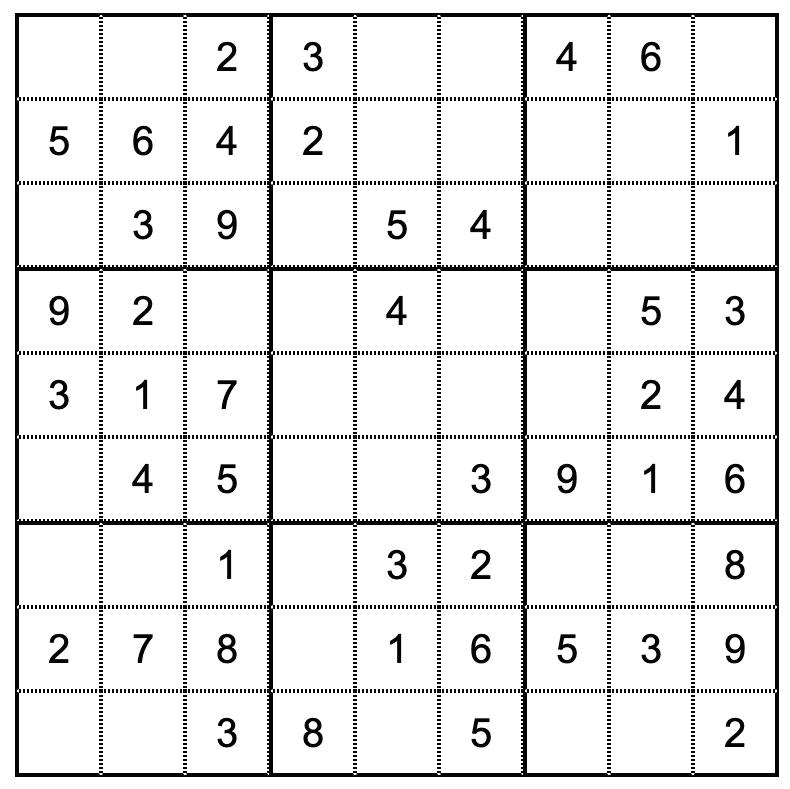
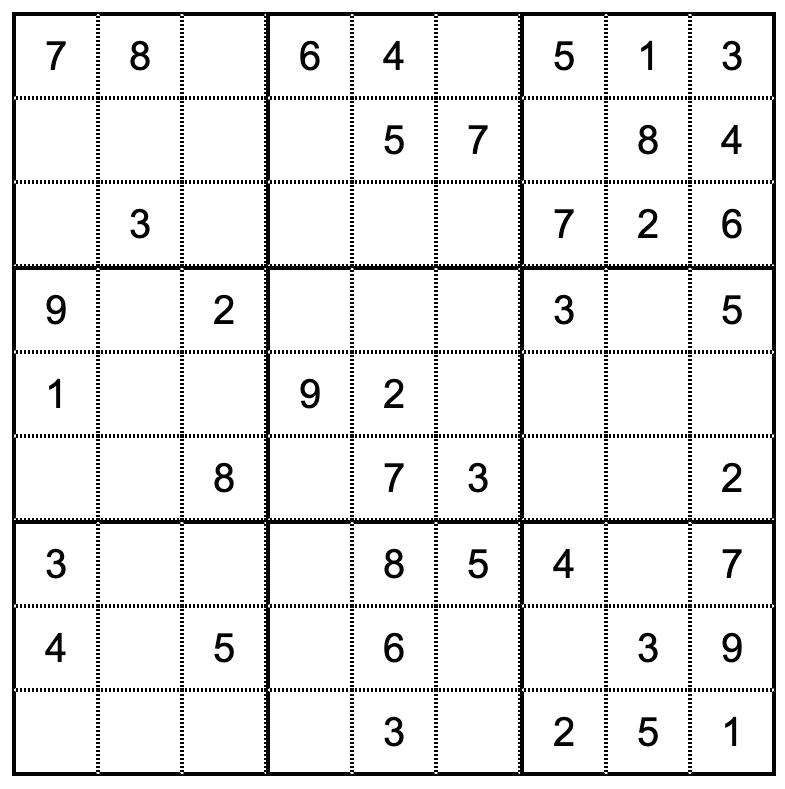

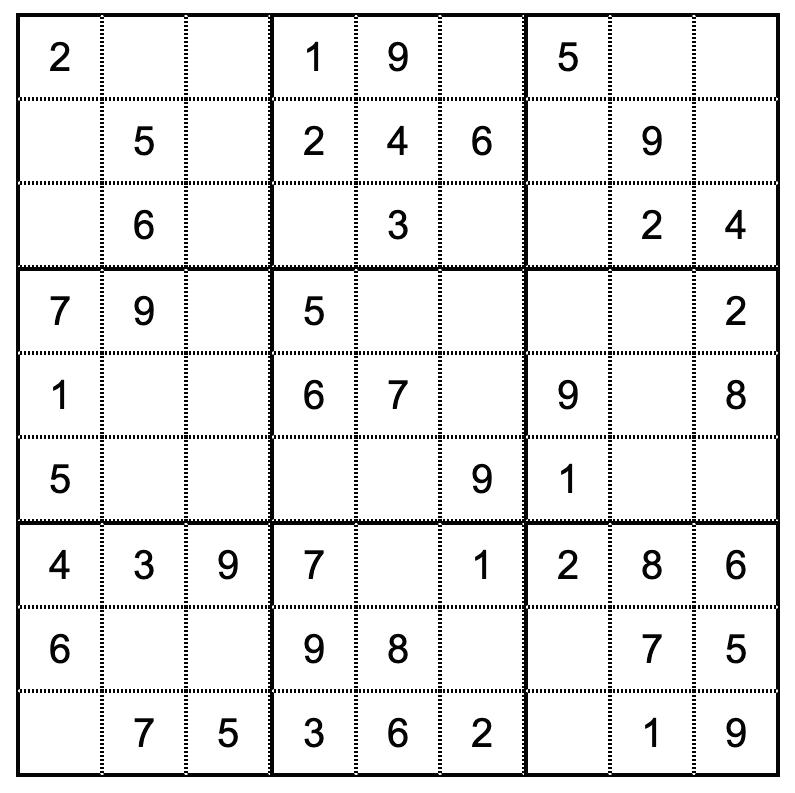


Can you find `` ?

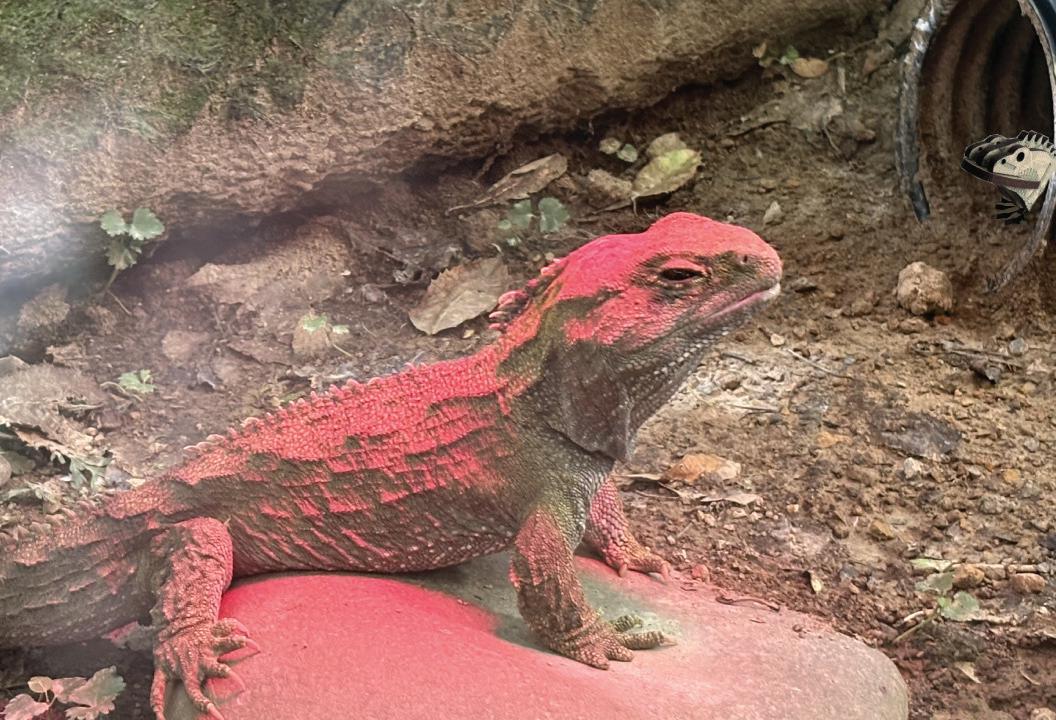
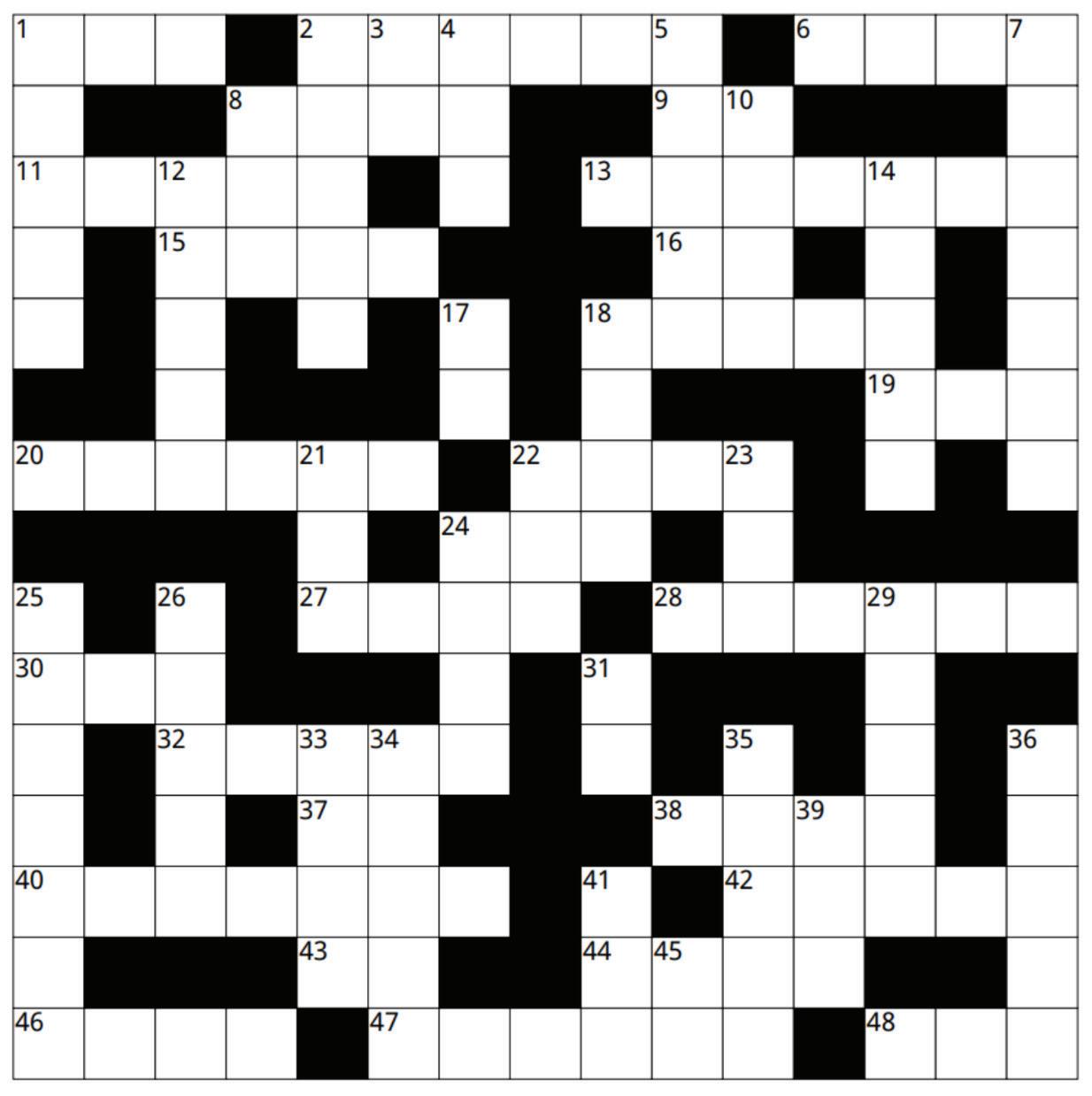
1 The most stylish member of 1D
2 The language a waiata is sung in 3 Weird __ Yankovic
4 Jamaican genre precursing reggae
5 ____ Youth
7 Spotify pays artists based on this metric
8 David Byrne's giant suit was missing one of these
10 Underground feminist punk movement "____ grrrl"
12 Ziggy Stardust's legal name
14 The best month to visit paris, according to this jazz standard
17 Band most famous for album "Songs of Innocence" found free in every iTunes library
18 ____? Yes sir. Rocky? Yes sir.
21 A bird who might live in Adam Young's city
22 Mumford had more than one
23 Genre of Skrillex and David Guetta
24 Lead singer of 17 down
25 A material girl
26 Video killed this star
29 Band known for "Hey, Soul Sister" and "Drops of Jupiter"
31 Comic musician Burnham
33 ____ Patrol
34 Iconic big band leader Basie
35 Billy and Alexa Ray
36 Venue for large concerts
39 Hairdo worn by Hendrix
41 Genre of Tupac and Biggie
45 Initials of "Oh, Pretty Woman" singer
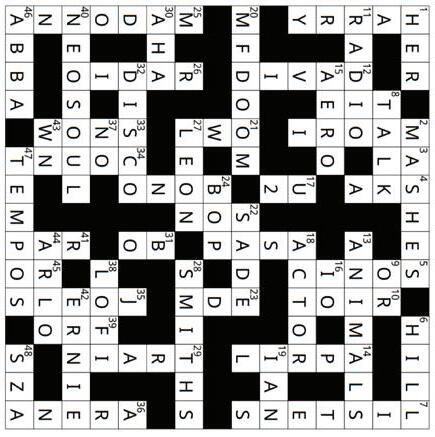
1 Featured artist on Daniel Caesar's "Best Part"
2 A DJ does this to tracks
6 Lauryn ____
8 Hit ZAYN song "PILLOW____"
9 "____ Nah" by Ty Dolla $ign featuring The Weekend and Wiz Khalifa
11 Band of Thom Yorke, headless
13 Band made of glass
15 ____smith
16 Peter Gabriel's latest album after a two decade hiatus
18 Ice-T is both a musician and ____
19 Drury who sung "Hit Me with Your Rhythm Stick"
20 Rapper known for distinctive mask
22 Often mispronounced name of Nigerian-British R&B artist
24 Dance to pop music
27 Bridges who sings "Coming Home"
28 This band believes that meat is murder and the Queen is dead
30 Known for the 80s hit "Take on me"
32 Characterised by mirrored balls and flared pants
37 2016 Meghan Trainer hit
38 Beats to relax or study to
40 Genre combining soul and contemporary R&B
42 Guitar accessories brand ____ Ball
43 Initials of country icon who can't wait to get back on the road again
44 Parks who opened for Eilish in 2021
46 Palindromic swedish pop band
47 In film Whiplash J.K. Simmons is very specific about these
48 Artist with albums SOS and Ctrl
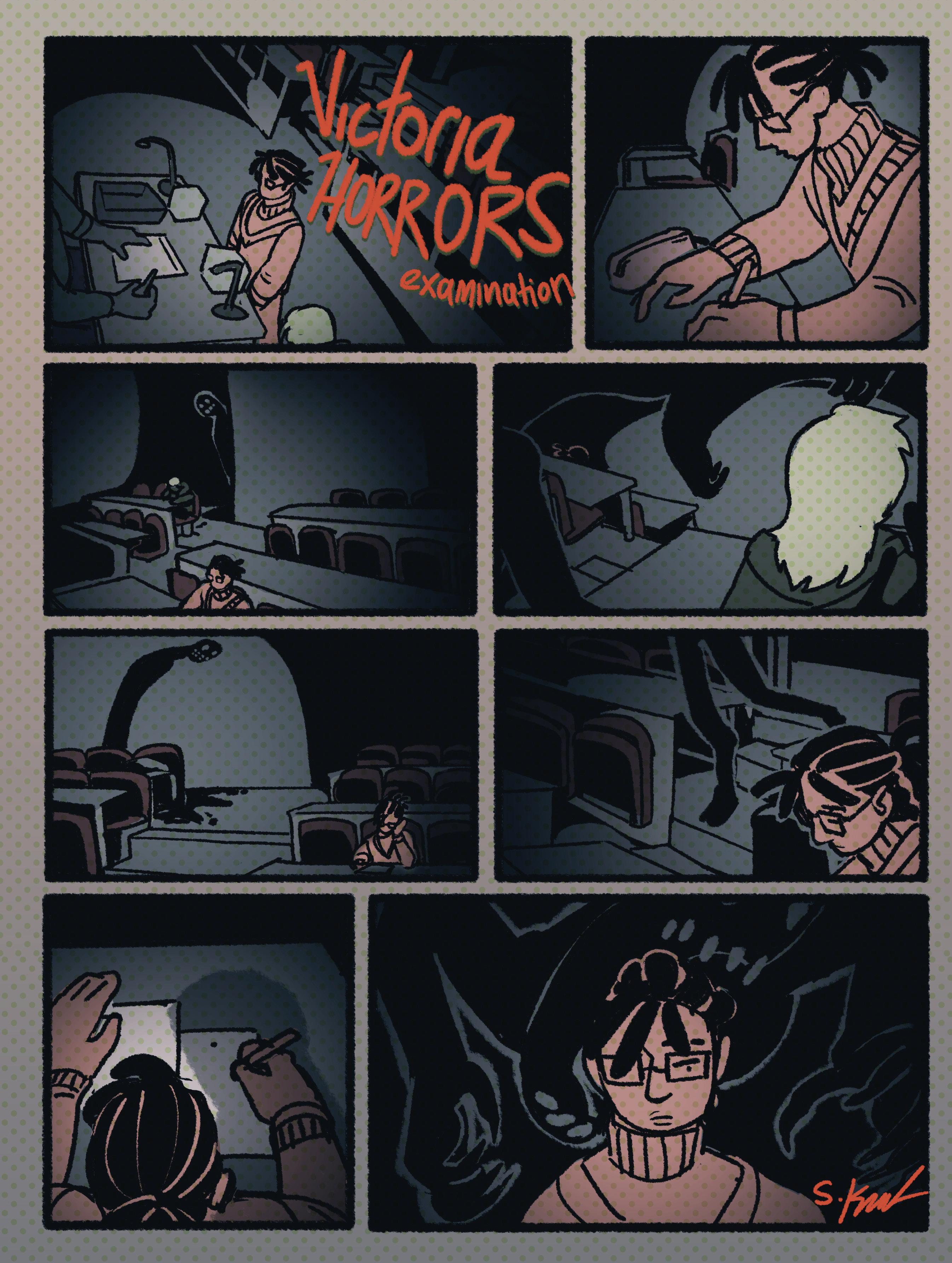
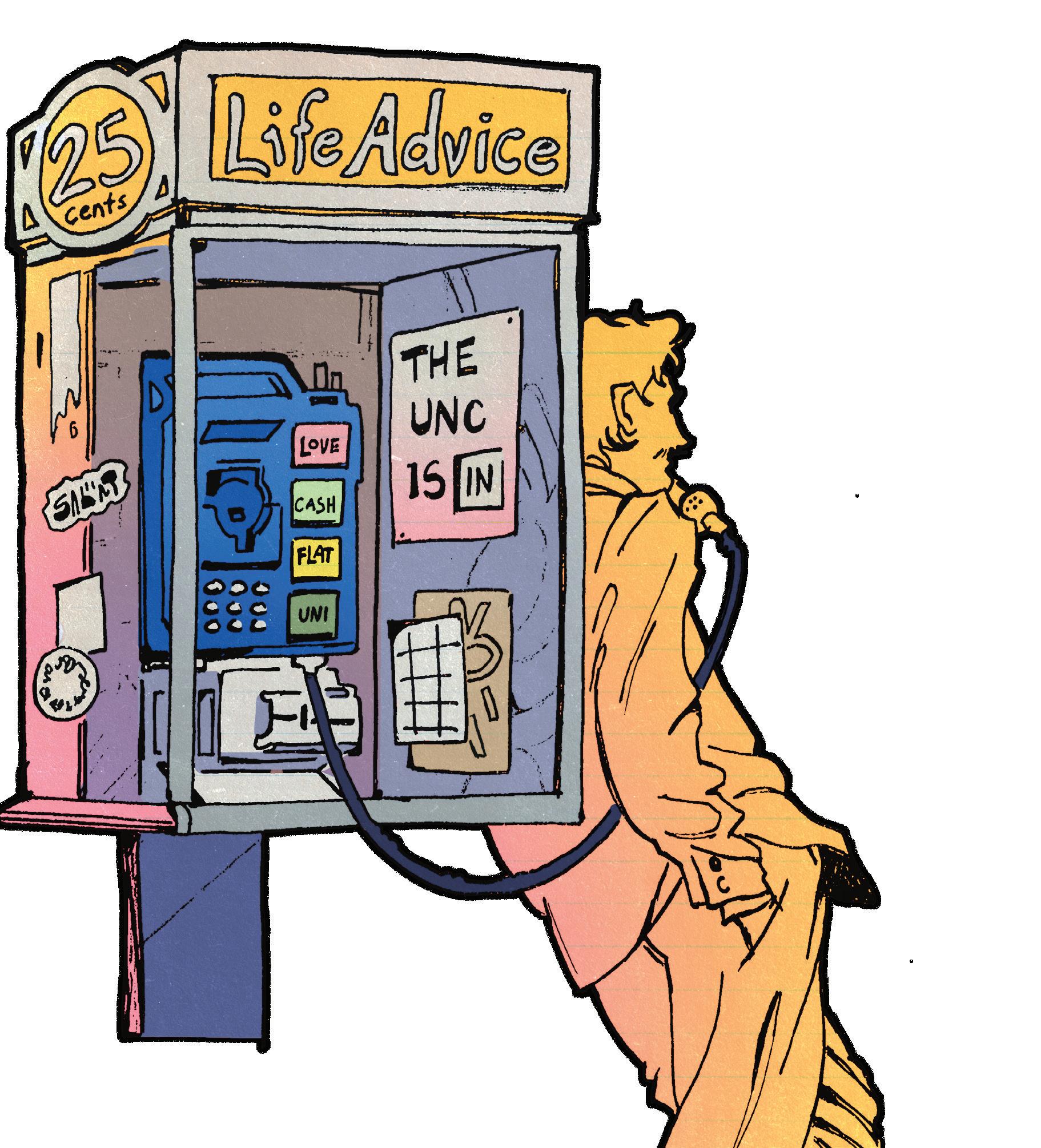
Ah, the gap year: society’s most divisive invention since pineapple on pizza. To some, it’s a rite of passage—a time to “find yourself” while getting suspiciously sunburnt in Thailand. To others (your parents), it’s a terrifying abyss where their oncepromising child morphs into a professional couch ornament who communicates exclusively in grunts and Netflix references.
Here’s the real kicker: you do need a break. That doesn’t make you lazy—it makes you a growing and changing person. But your parents might hear “gap year” and translate it as “unemployed forever, living in the attic with a pet axolotl named Kevin.” So the way you frame it matters.
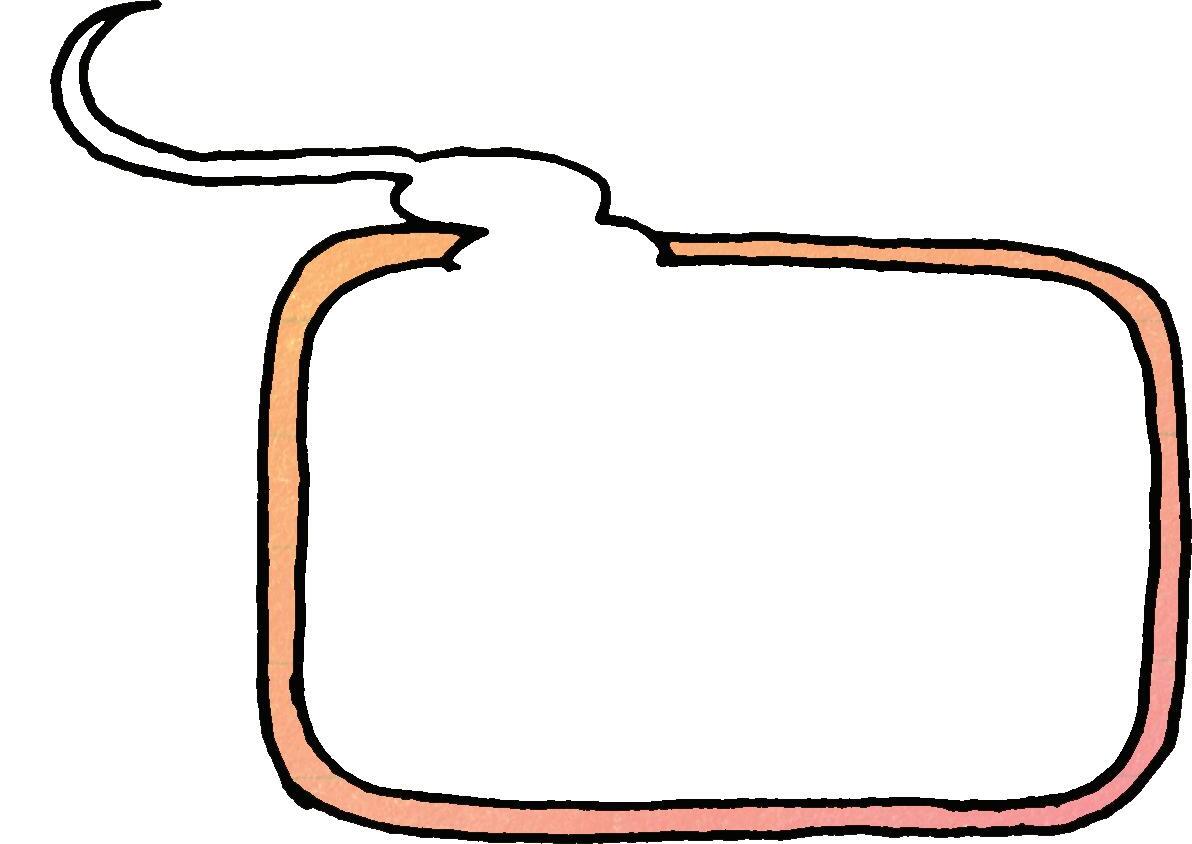
I'm taking a gap year in 2026 but I haven't told my parents. How do I explain I need a break without appearing lazy?
What the outcome is: “I’ll start uni with more direction, maturity, and savings (bonus: fewer panicked calls home when I realise laundry doesn’t do itself).”
You’re showing them you’re not running away from education but setting yourself up to smash it when you get there.
And yeah, there might still be a lecture about “momentum” and “wasting potential.” That’s fine. Let them vent. You’re shifting their mental image from “lazy kid with Netflix” to “motivated young adult taking a breather before round two.”
So rip the Band-Aid. Tell them. Be calm, be firm, and be clear.
Rule number one: don’t present it as an escape. “I can’t deal with uni yet/right now” sounds like burnout, which to them sounds like weakness. Instead, pitch it as a plan. Parents love plans. They’re basically catnip for anxious adults. Lay it out:
Why you need it: “I’ve been working hard through school, and I want to hit uni clear-headed instead of exhausted.”
What you’ll do: “I’m going to [work/save/ travel/volunteer/learn a skill]—not just sit around waiting for something better to happen.”
Because the truth is, lazy people don’t plan gap years. They just…accidentally live them by not handing in any assignments.
Yours, Agony Unc(le)
P.S. If you do end up with a pet axolotl named Kevin, at least teach him some party tricks. Parents love a multitasker.
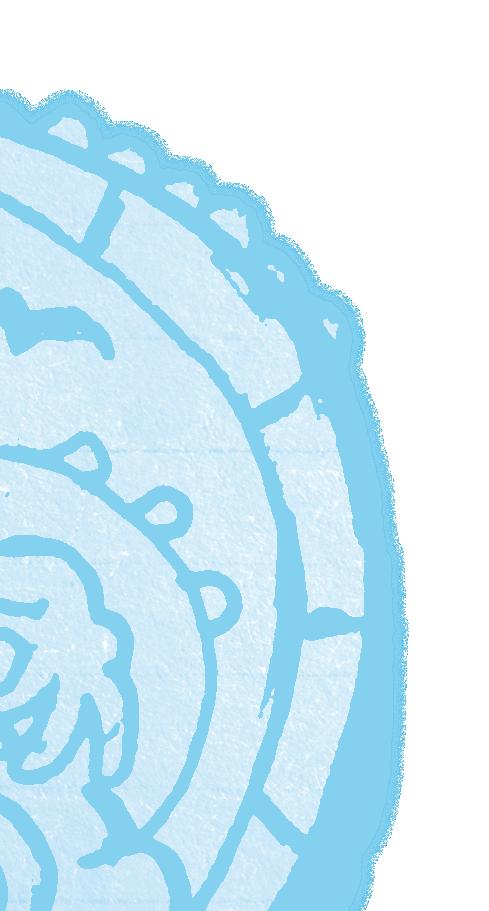



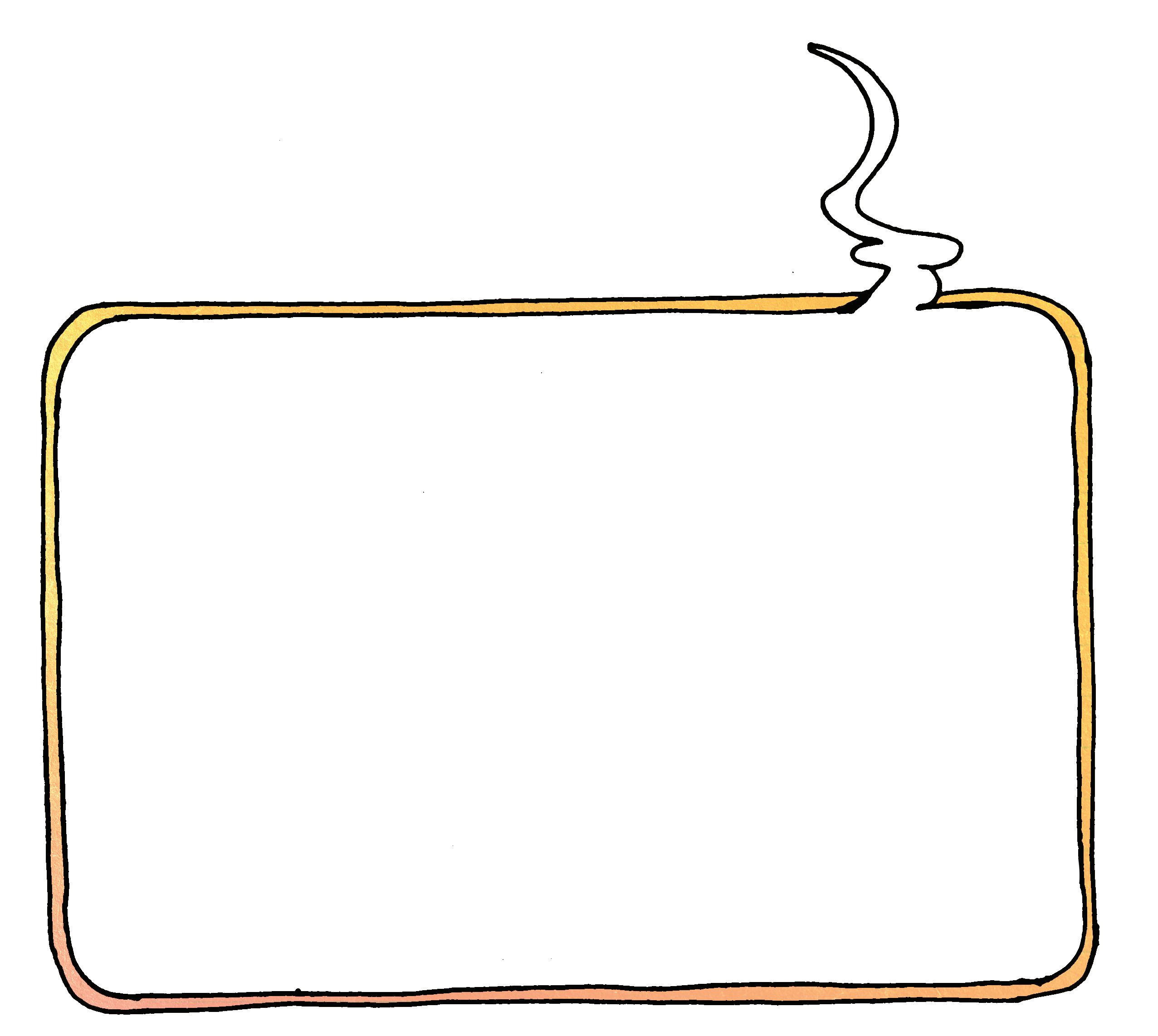

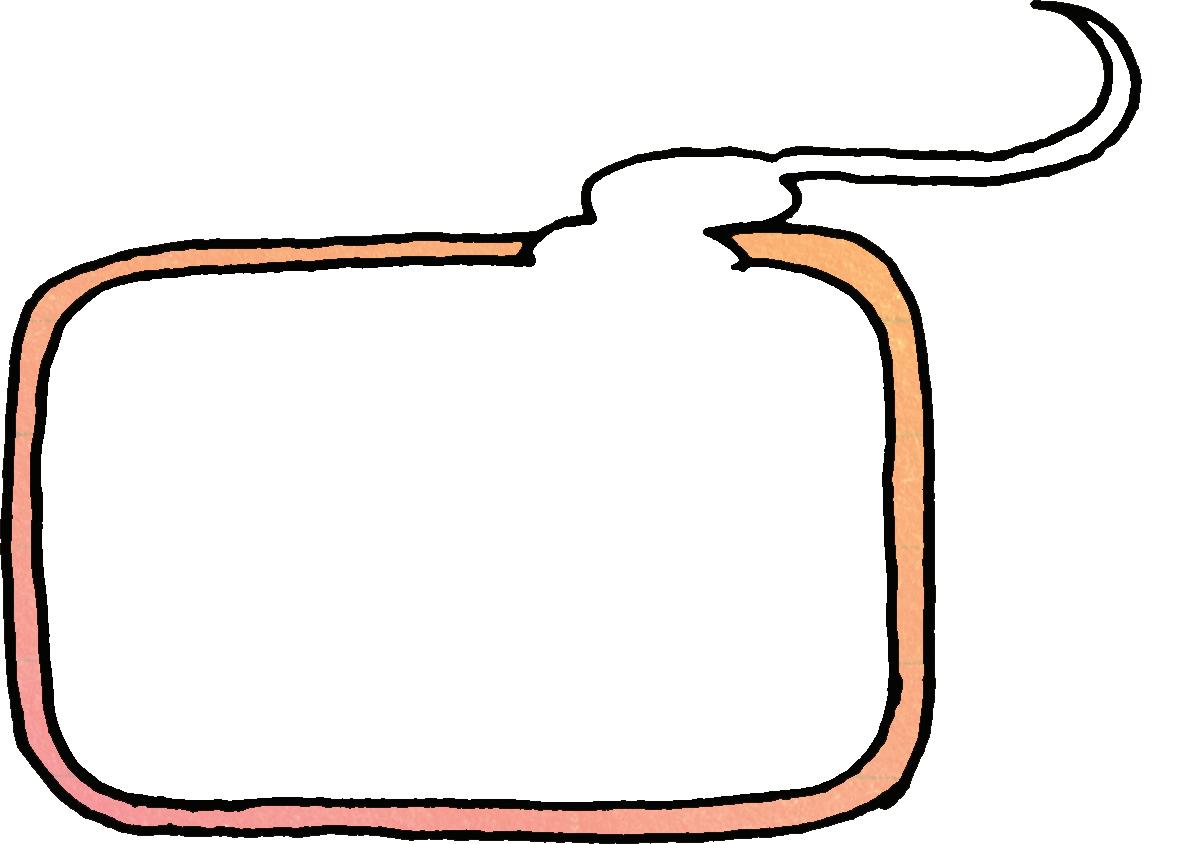
Ah, the age-old dilemma: do you date for sparkling conversation… or for the kind of bedroom gymnastics that could qualify for Olympic selection? On paper, it looks simple—but your loins and your brain are clearly at war, and your feminist conscience has jumped in to watch.
Here’s the thing: men have been coasting on the “she’s hot but I can’t stand her opinions” model since approximately forever. It was practically the plot of every sitcom from 1992–2010. The only difference is that now you’re the one flipping the script, and that makes you feel like some kind of renegade trailblazer—which, in its own messy way, you are.

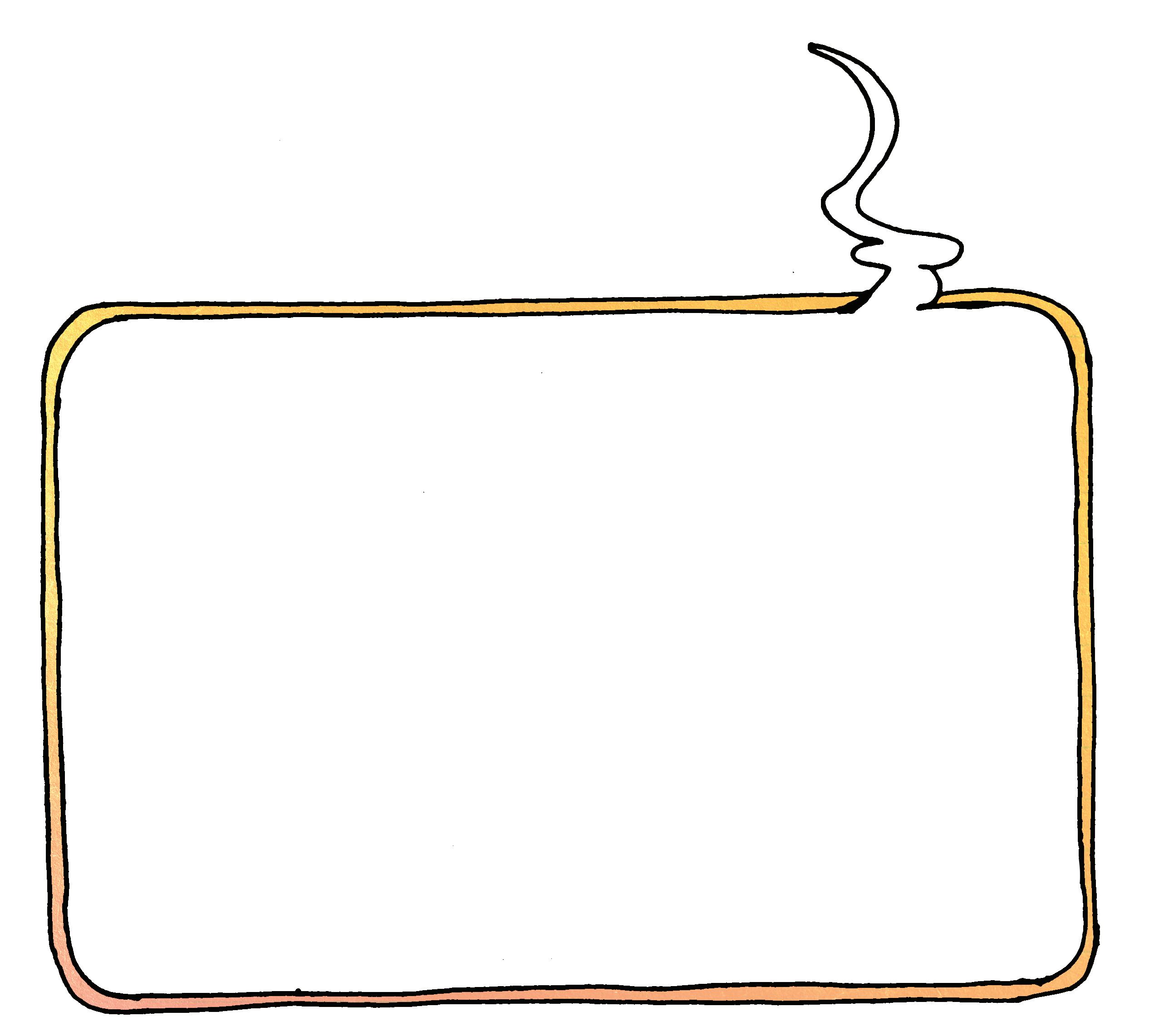
But let’s cut through the smoke: being a “progressive woman” isn’t about treating men like soulless sex toys. It’s about choice. Autonomy. Owning the fact that you can want someone for their body, and not for their sparkling repartee about crypto or CrossFit. You don’t owe anyone your emotional investment just because they’ve been inside you.
That said, it’s worth asking yourself: is this arrangement actually serving you, or is it just convenient? If the only time you enjoy his company is when clothes are flying, then maybe this isn’t a relationship—it’s a situationship with excellent benefits. And that’s fine, as long as you’re clear with yourself and with him.
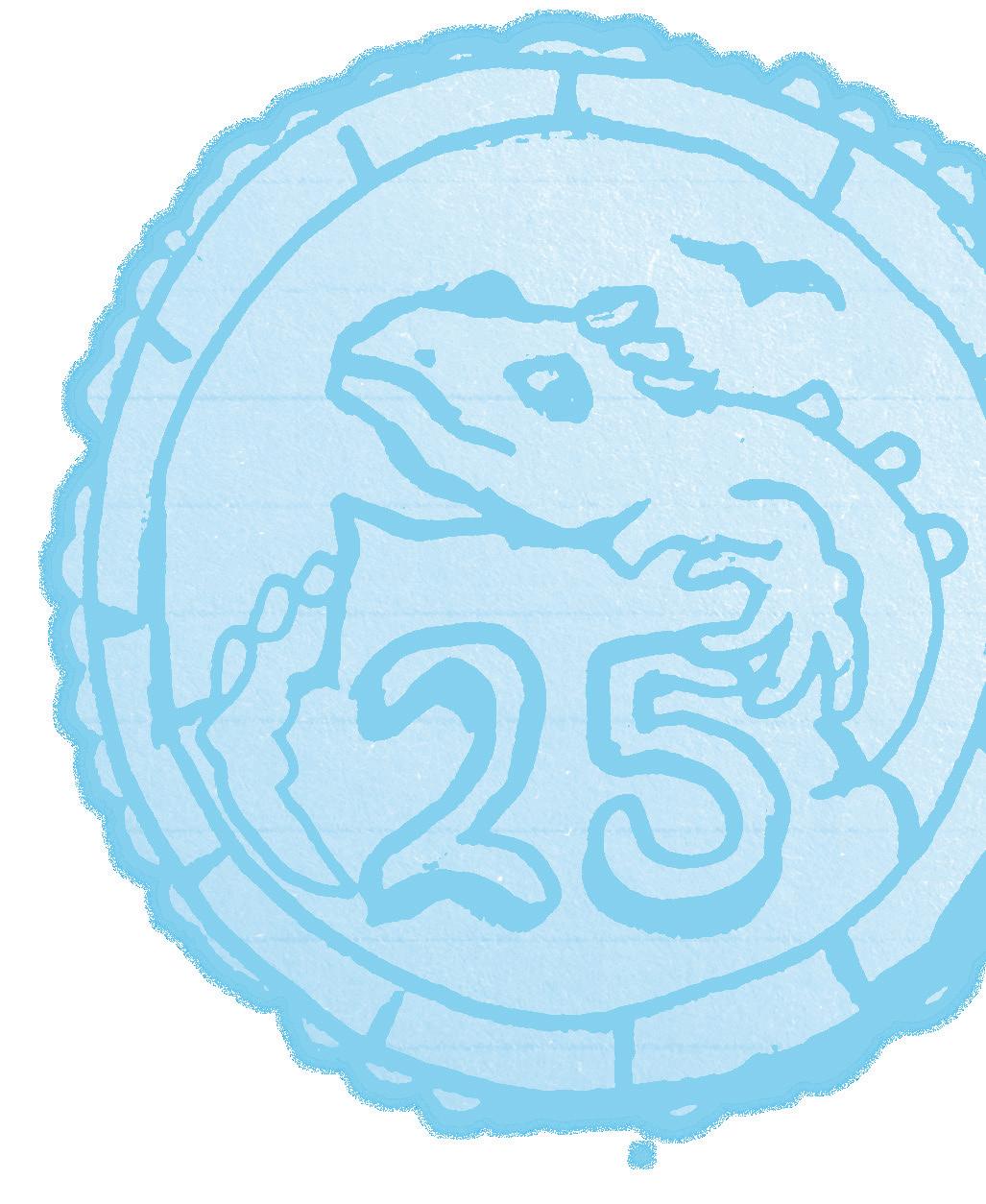
Because here’s the not-so-sexy part: if he thinks you’re building towards brunch dates, shared electricity bills, and emotional intimacy, but you’re just there for the acrobatics, then someone’s going to get blindsided. And that’s when the whole “empowered woman” vibe tips into “accidental villain origin story.”
So, should you keep seeing him? Sure—if you can be honest with him, and with yourself. Don’t dress it up as romance when it’s really just cardio. Don’t ghost him when the novelty wears off. Do treat him like a person, not a rechargeable toy.
And if you start feeling gross or conflicted about it? That’s your sign it’s time to retire from the Olympic sex squad and find someone who’s both hot and hilarious. Believe me, they exist. I am one of them.
Yours,
Agony Unc(le)
Ready for the next bout of existential dread? Agony Unc(le)’s inbox is always open. Bonus points if it involves romance, rent, or whether a $14 flat white is a crime.
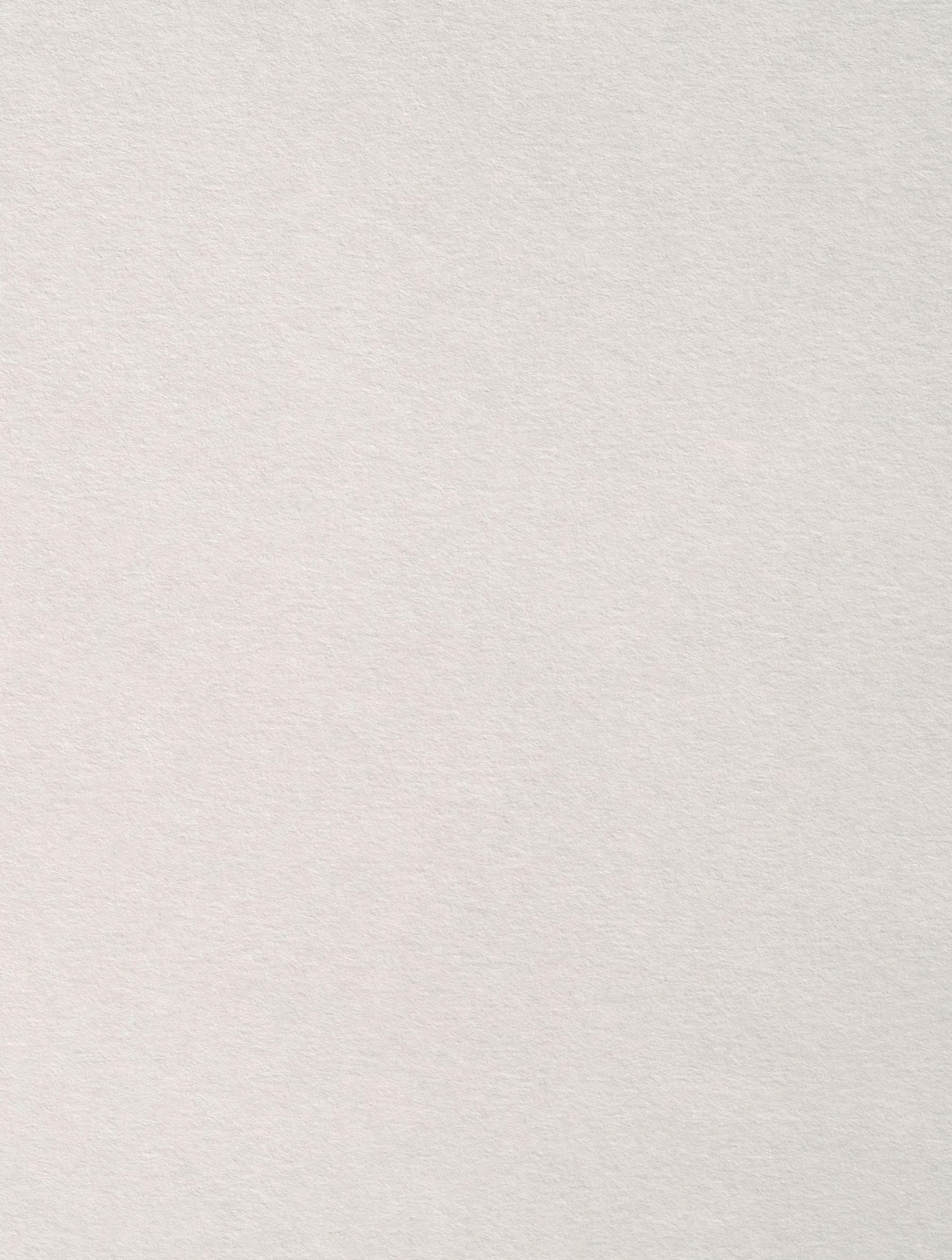

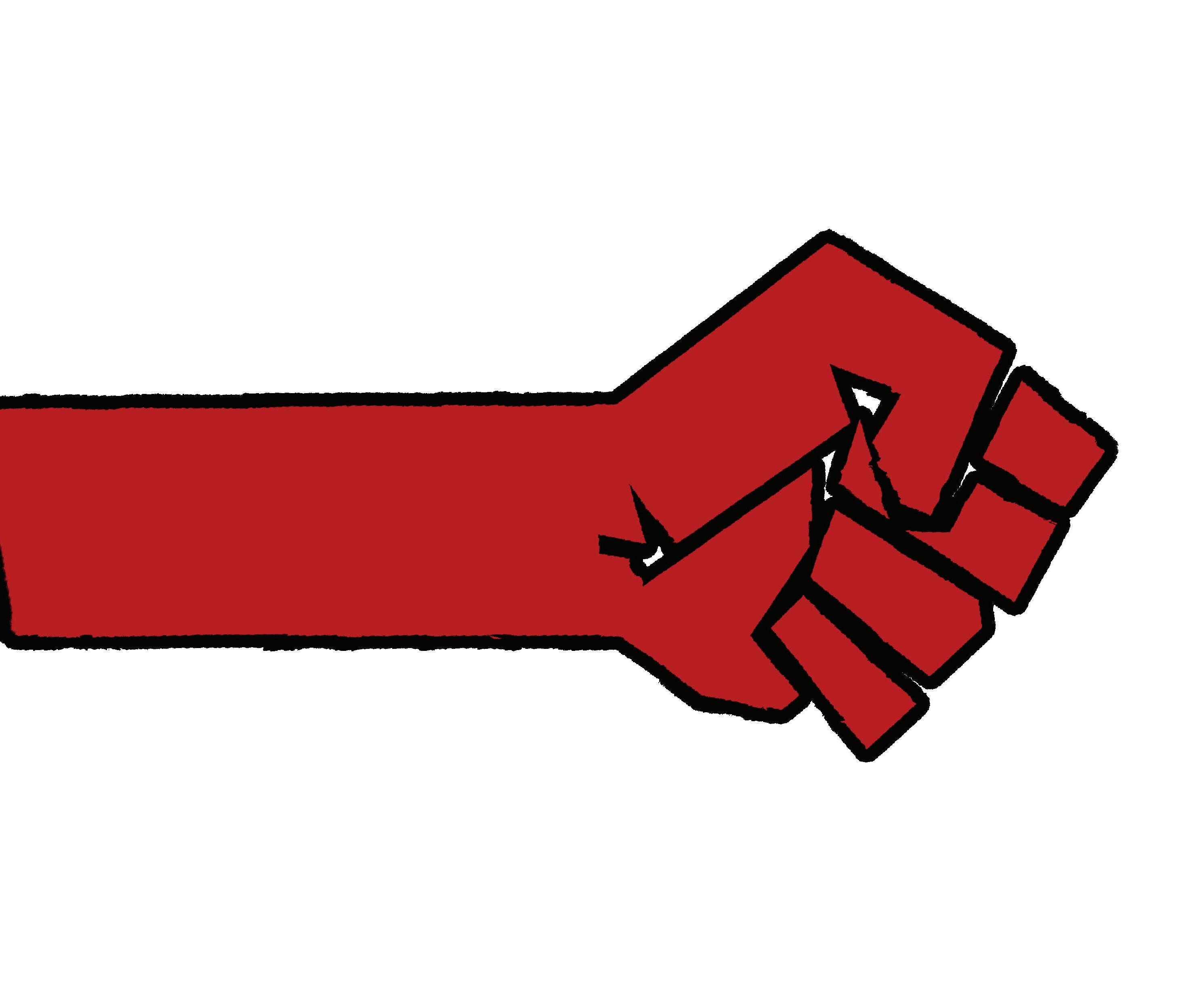
A Column by VUW International Socialists / ISO
ACT leader David Seymour 1, Labour leader Chris Hipkins2, and National leader Christopher Luxon3 all seem to agree that the “kiwi dream” is “home ownership”. Luxon is certainly living the dream: he owns three properties4 while living rent-free in Premier House5. But what’s this “dream” really about?
let’s start with the dreams of Māori. Although Māori never ceded sovereignty 6, the British “Crown” unilaterally claimed to govern all of what it called New Zealand—with force, as they saw fit. The colonial government and private business then proceeded to physically dispossess Māori through clearly unjust manipulative laws which undermined Māori collective ownership, and by outright military force when Māori rightly resisted. Through these measures, 95 percent of Aotearoa7 has been snatched from Māori. If owning your own home is a kiwi dream, let’s start with Land Back.
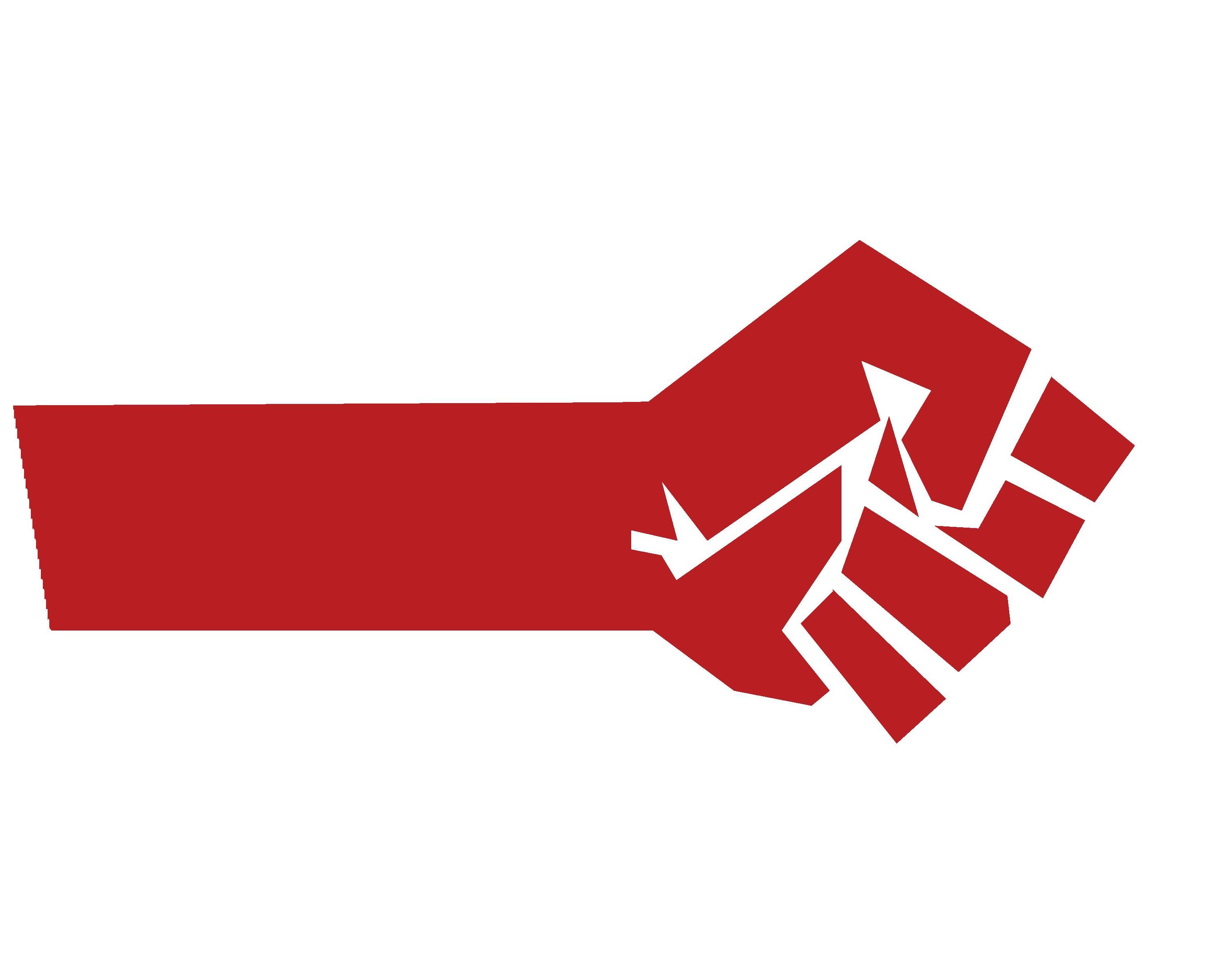
But even within the postcolonial parameters which the ACT, Labour, and National leaders assume are unmovable, the “dream” is a grift. It’s inevitable that the wealth concentration inherent in capitalism will result in increasing precarity and decreasing wealth for the vast majority, and this affects housing as much as every other aspect of our lives. The supposed dream has been increasingly unobtainable8 for “kiwis”, with home ownership rates decreasing and house prices increasing massively faster than incomes.
As an alternative, we pay a landlord to live in a property they own. After our employers have taken the majority of the value we created, we must then hand over to landlords a large portion of what’s left. In Te Whanganui-a-Tara, this means twelve hours of minimum wage9 work each week10 just to pay the median rent11
on a room in a three bedroom flat. Of course, you’ll have to work extra if you also want food and other essentials. Bandaid reforms for this systemic power imbalance, such as a government accommodation supplement payment, ultimately serve to funnel more wealth into landlords’ pockets. Meanwhile, landlords are incentivised to provide the lowest possible quality of accommodation, maximising profit from their investment while many tenants live in cold, mouldy slums.
If we fail to demonstrate enough economic value, capitalism will just allow us to become unhoused. Joel MacManus 12, writing for the Spinoff, reports the 2023 census identified 112,496 people in Aotearoa were “severely housing deprived”—that’ll have been an underestimate, and we know things have gotten much worse. What’s more, international research 13 shows homelessness results in an increased likelihood of early death.The only safety nets against this—such as public housing14—are the ones we’ve fought for, won, and must actively defend if we want to maintain them.
Everyone deserves the stability and safety of quality accommodation that isn’t under constant threat of being ripped out from beneath them. We can have a future that doesn't result in the concentration of wealth in the hands of a few, but where we share resources fairly. We can start with more public housing to eliminate homelessness, capping rent, and taxing wealth and capital gains. But we need to go much further. We can replace capitalism with a social system where quality accommodation is a basic right—where being housed isn’t conditional on a person’s economic value. Let’s make that future happen!
Sources:
1. https://www.act.org.nz/news/actbringing-back-the-kiwi-dream
2. https://www.labour.org.nz/news/ speech-chris-hipkins-new-zealandin-2040-a-vision-worth-fighting-for/ 3. https://www.scoop.co.nz/stories/ PA2202/S00145/christopher-luxona-divided-society.htm
4. https://www.nzherald.co.nz/nz/ politics/mps-property-portfolioschristopher-luxon-sells-investmenthouses-politicians-with-overseasinterests/
5. https://www.nzherald.co.nz/ nz/politics/benefit-mansionchristopher-luxon-claims-52k-topup-to-rent-his-own-apartment/
6. https://www.waitangitribunal.govt. nz/en/news/report-on-stage-1-ofthe-te-paparahi-o-te-raki-inquiryreleased
7. https://www.tetumupaeroa.co.nz/ about-the-whenua/what-is-whenuamaori
8. https://www.royalsociety.org.nz/ news/spotlight-on-housing-newreport-looks-at-growing-inequity-inhousing-in-aotearoa-and-possiblesolutions/
9. I've calculated this as:
$23.50 /hour minimum wage 17.5% tax rate
$700 for three bedroom flat, divided by three people
700÷3÷(23.50×(1−0.175))=12 .0352...
10. https://web.archive.org/ web/20250823205901/https://www. myrent.co.nz/insights/market-rent/ wellington
11. https://thespinoff.co.nz/ politics/14-08-2025/whyhomelessness-is-worse-under-thisgovernment-a-story-in-10-graphs
12. https://onlinelibrary.wiley.com/ doi/full/10.1111/hsc.13486
13. https://www.publichousingfutures. com/

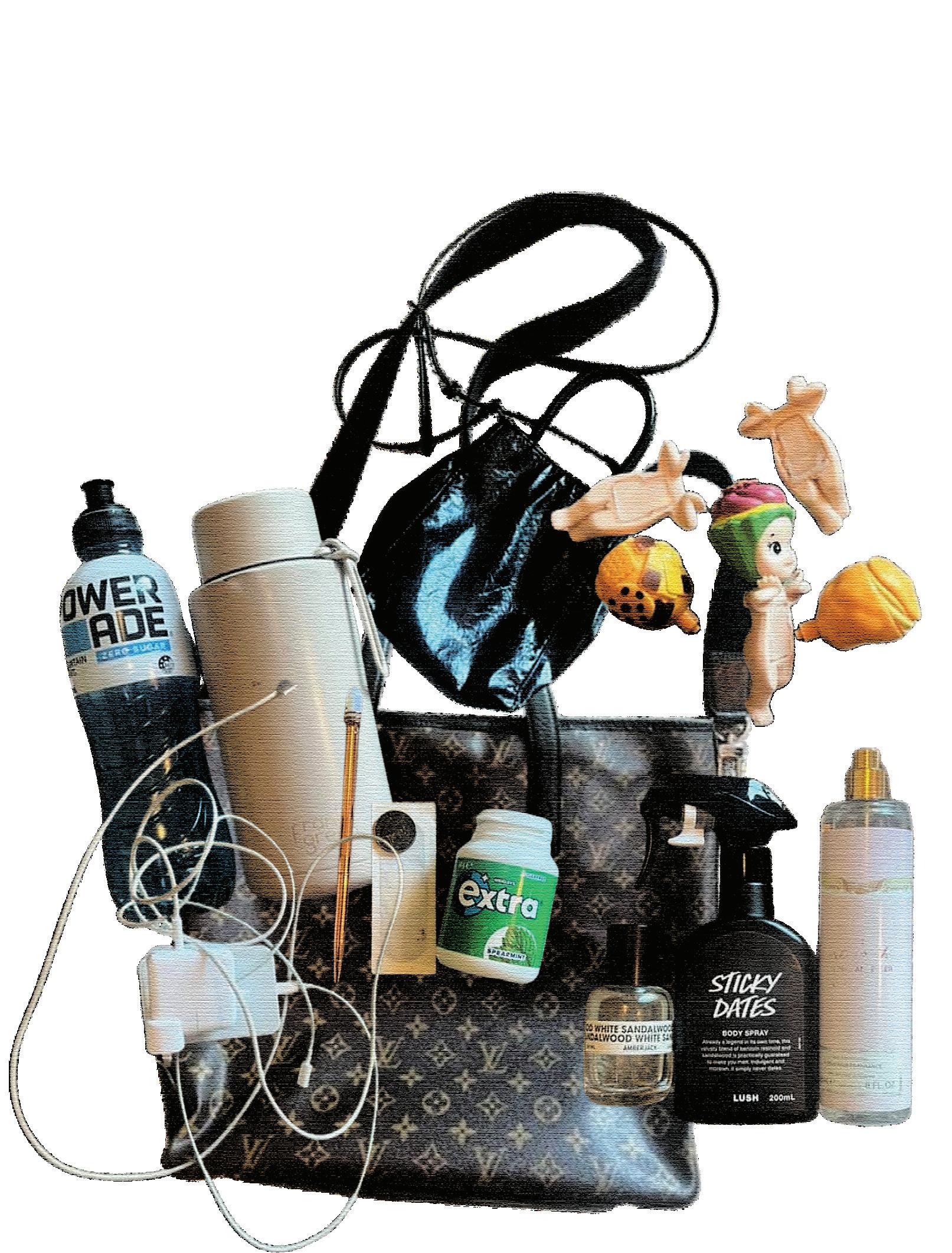

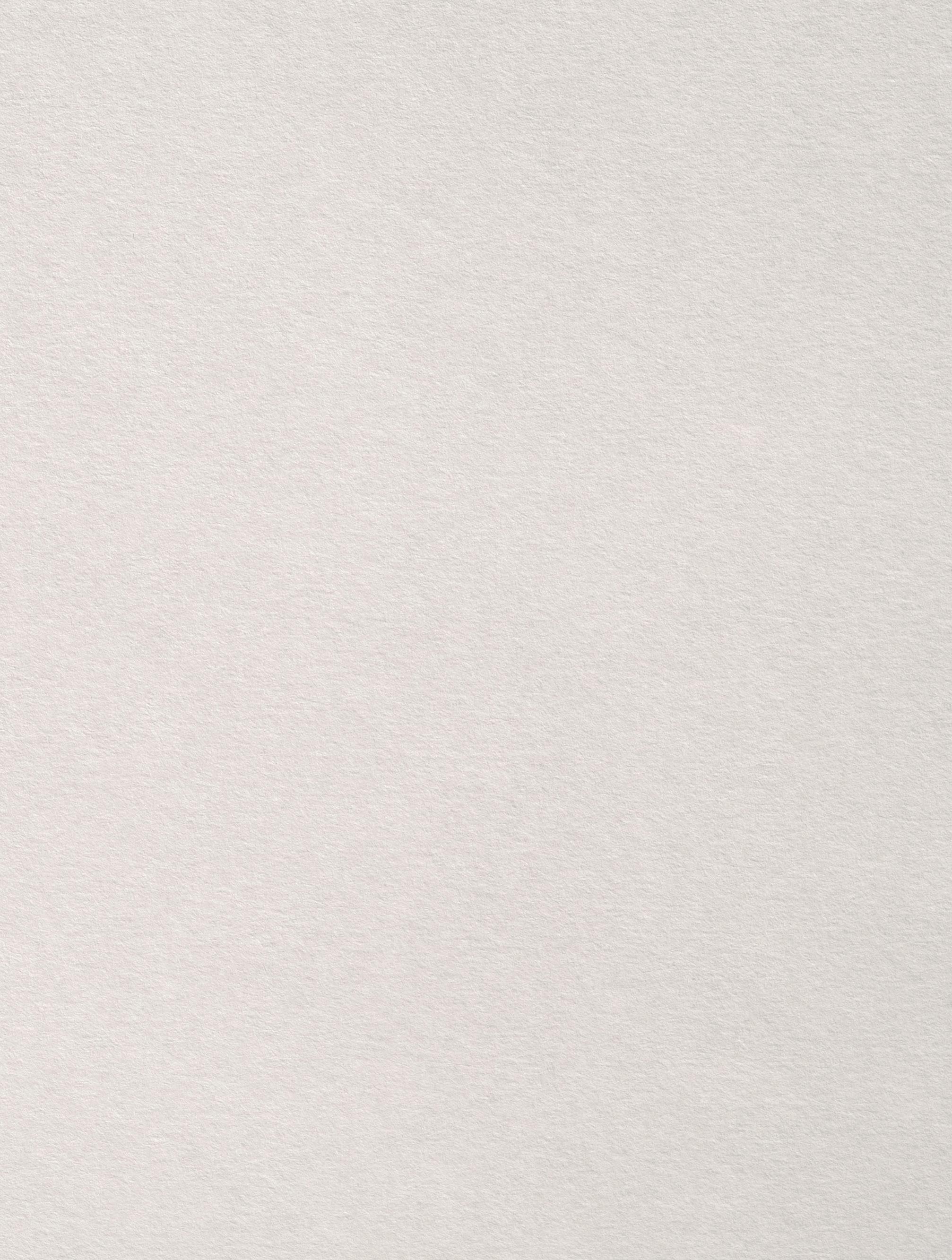
I use my bag mostly for university stuff and then bring a smaller bag with my essentials in case I end up going out after and need to ditch the laptop. The little bag holds my most important day to day items; lip balm, hand sanitiser and cards. I study a Bachelor of Communications, majoring in marketing and minoring in International business all of which have very limited requirements for what I need to carry around with me. All my class information is available online so I don’t need a notebook but like every student I carry a pen with me just in case.
During a break between two classes my friend and I got bored and each ordered a box set of fake Sonny Angels and did an unboxing in class. I carry the spare heads and bodies just in case the one on my laptop falls off.
Perfumes and body sprays are a must, I refuse to be caught on campus smelling bad, so I bring multiple perfumes so I can switch it up depending on what works best for the vibe of the day or outfit. It comes in quite handy since my friends will come and borrow some from me if they urgently need some spritzing.

If you’re a frequent visitor to Unity Books Willis Street there’s little doubt that you’ve perused the pillar of recommended books. You might even have seen this book with its own handwritten placard imploring you to open its pages and take in the story. Perhaps it’s a little cheeky to start a column called Out of the Way Books with a novel that’s already been highly recommended by the wonderful staff of Unity Books.
In the column’s defence, the book wasn’t found on the pillar of excellent reading material. It was tucked between now unremembered titles. It wasn’t obvious, it wasn’t pulled from the shelf for its place on the shortlists of both the Ursula K. Le Guin Prize and International Booker Prize. It was the ominous cover that led to the purchase of the book. The water filter leaking black liquid from its tank down the white body of the dispenser and puddling on the concrete floor below.
The Employees by Olga Ravn, a Danish author and poet, is self-described as a workplace novel of the 22nd century. Originally written as an accompaniment for a Danish art exhibition, Consumed Future Spewed Up as Present, The Employees is devastating, poetic, weird, and evocative. As with many dystopian novels, it’s not seeking to predict the future but observing instead the modern world in surreal detail.
The novel is structured as a series of loosely chronological interviews of the workers, humans and humanoids, on the Ship of Six Thousand. The interviews themselves focus on the workers’ responses and interactions to a series of alien stones recovered from the planet ‘New Discovery’. As one pages through the interviews, it might perhaps occur to the reader that they are in the place of the unfeeling administration, simply reviewing the report.
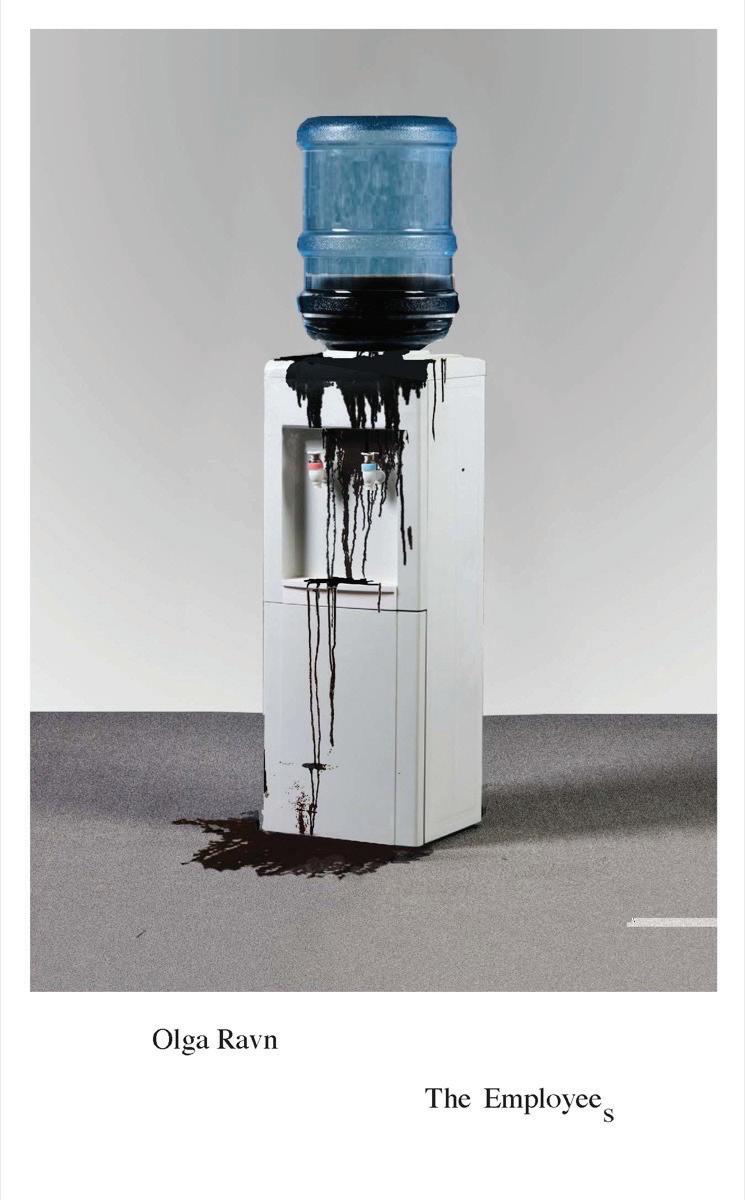
Words by: Ursula Holmes
In this way the novel asks: What makes us human? Only to answer that question by showing what won’t let us be human. That, a workplace is not a home. It cannot love you, it cannot care for you, and it won’t mourn you.
These experiences in the worker’s hands are so painful, so precious as it becomes clear that the Ship of Six Thousand is not a home. It’s a workplace with no friends or family, but coworkers. A place where labour is performed for the sake of labour and the worker’s only saving or damning grace in this antiseptic tank, is the several stones of alien nature that induce sensory responses in any approach.
As a long time worker in hospitality and corporate restaurants. Who hasn’t heard the saying, “if there’s time to lean there’s time to clean,” and so to be left unbothered you pick out an already clean section of wall and wipe it aimlessly while waiting for the next order to come through, it’s impossible to not see the absurdness. The manager knows you’re not cleaning anything, you know you’re not doing anything, and Corporate must know but they’re satisfied by the sight of a worker, “looking busy.” I cannot help but see so many real experiences in the faceless and identity-less interviews of the ship of three thousand.
Threaded between this stripped and soulless environment, straining because of the workplace on the Ship of Six Thousand, is the relationship between humans and humanoids. The humans reminisce of earth and all they left behind. The humanoids in comparison are childlike, exploring in wonder, reaching for their agency. Something stripped from them by design. The tension between each group is not unlike the tension between a parent and child as that child reaches for autonomy and separation of the self. “I may have been made, but now I’m making myself.” Yet both are equal victims to the mangers of their workplace.
About the Centrefold:
"No work. Shit Pay. Why Stay? That is the question on students’ minds who are looking for a job both during and after studies. In recent years, students have faced skyrocketing living costs, stagnant wages, and increasingly limited job options. At the same time, more graduates are packing their bags and heading overseas; not because they want to, but because they feel they have no choice. If you’ve had a gutful of rejection letters, sign our petition and attend our march!"

The next soft thing you eat is going to crunch. You will pretend it didn’t happen. You will fail.
Do: Check expiry dates.
Don’t: Trust anything from the flat fridge after Wednesday.
You will wake up with a strong opinion about possums. It will ruin brunch. You will not regret it.
Do: Speak your truth.
Don’t: Google “possum facts” at 3am. You’re not ready.
You’ll find a sock in your bag. It’s not yours. It’s not clean. It’s not alone.
Do: Do your laundry regularly.
Don’t: Accept mysterious socks as gifts. That’s how it begins.
Today you’ll learn that F. Scott Fitzgerald stole The Great Gatsby from Zelda. This will shake you. Let it guide you.
Do: Call your mother.
Don’t: Use AI to write your essays. Zelda wouldn’t.
You will lock eyes with a seagull. It will not blink. You will. That was your first mistake.
Do: Eat your lunch indoors. Don’t: Assume dominance over birds. You will lose.
You will be followed by a cone. Not a person holding a cone. Just the cone. It knows your timetable.
Do: Return borrowed traffic cones.
Don’t: Take one home “as a joke.” It’s not a joke to the cone.
You’ll sneeze and someone will say “bless you” in Latin. You’ll feel an urge to vote Pennywize for Mayor, who sang his campaign speech last week.
Do: Make sure you’re enrolled to vote.
Don’t: Take democracy lightly. Even when it sings.
You forgot Fathers’s day over the weekend, didn’t you? The guilt is creeping in.
Do: Phone your dad.
Don’t: Put it off. He noticed.
You’ll overhear someone say “the ritual is complete.” They will be holding a flat white. You will feel compelled to clap.
Do: Stay hydrated.
Don’t: Join spontaneous cults in the Hub. Even if they offer snacks.
You will correct someone's grammar and they will whisper, “the prophecy begins.” You will not be invited back.
Do: Be helpful.
Don’t: Be too helpful. People fear power.
You’ll stroll through campus with the wind in your hair and trip over a rock in the quad. Your iced latte will fly. Everyone will see. They will laugh.
Do: Double knot your laces.
Don’t: Let embarrassment win. You are the breeze.
You’ll see a pigeon wearing a tiny hat. It will nod at you. You will feel respected. You will be wrong.
Do: Respect the drip.
Don’t: Follow the pigeon. That’s how the last student disappeared.


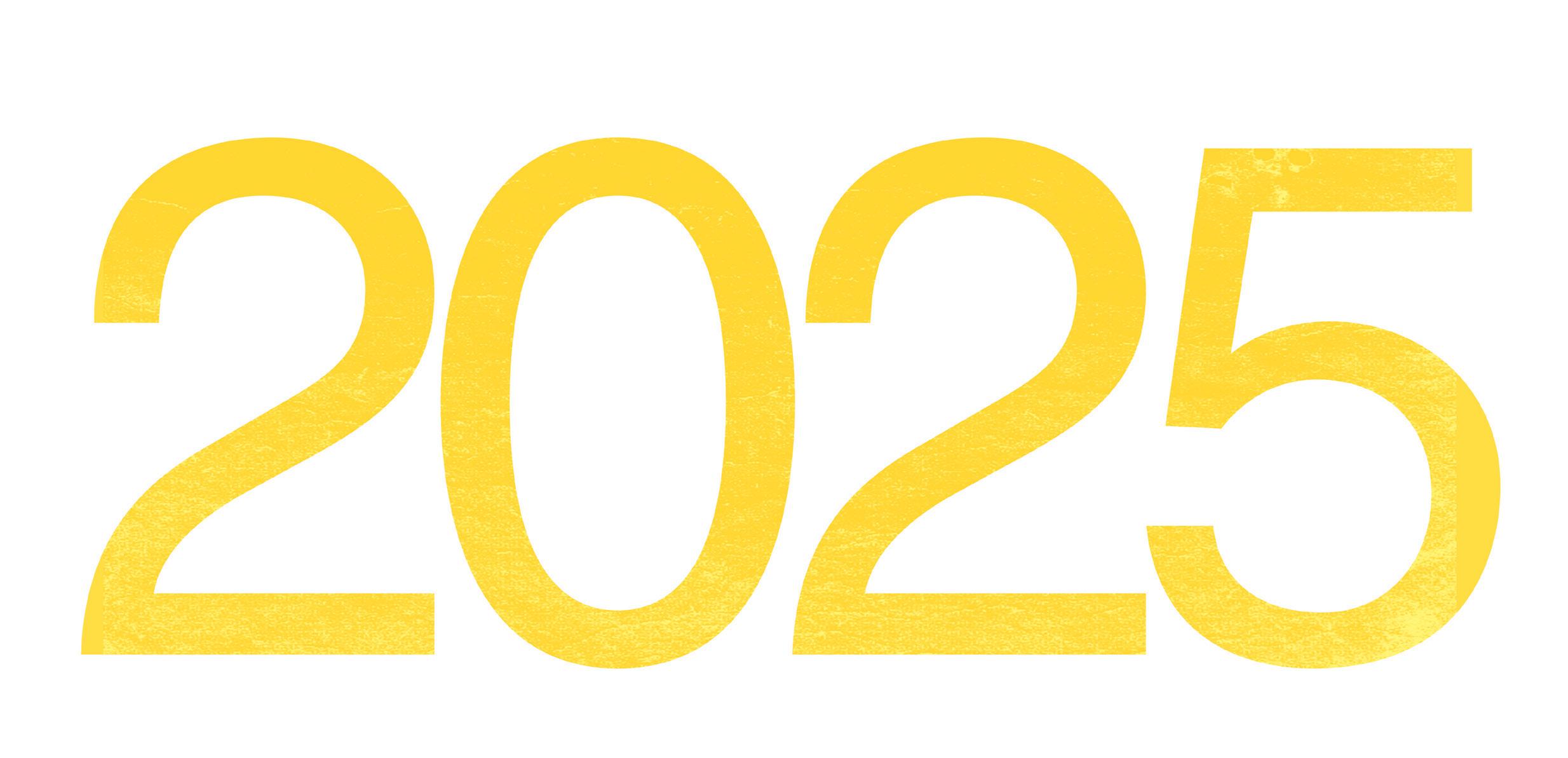
Recognising outstanding contributions across cultural activities & clubs
If you, your club or someone you know has had some great achievement, nominate them for an award!
The Supreme Club & Gold Awards will be held 2 October at The Hunter Lounge, Student Union Building, Kelburn

Apply at vuwsa.org.nz/gold-awards by 12pm, Friday 12 September.
